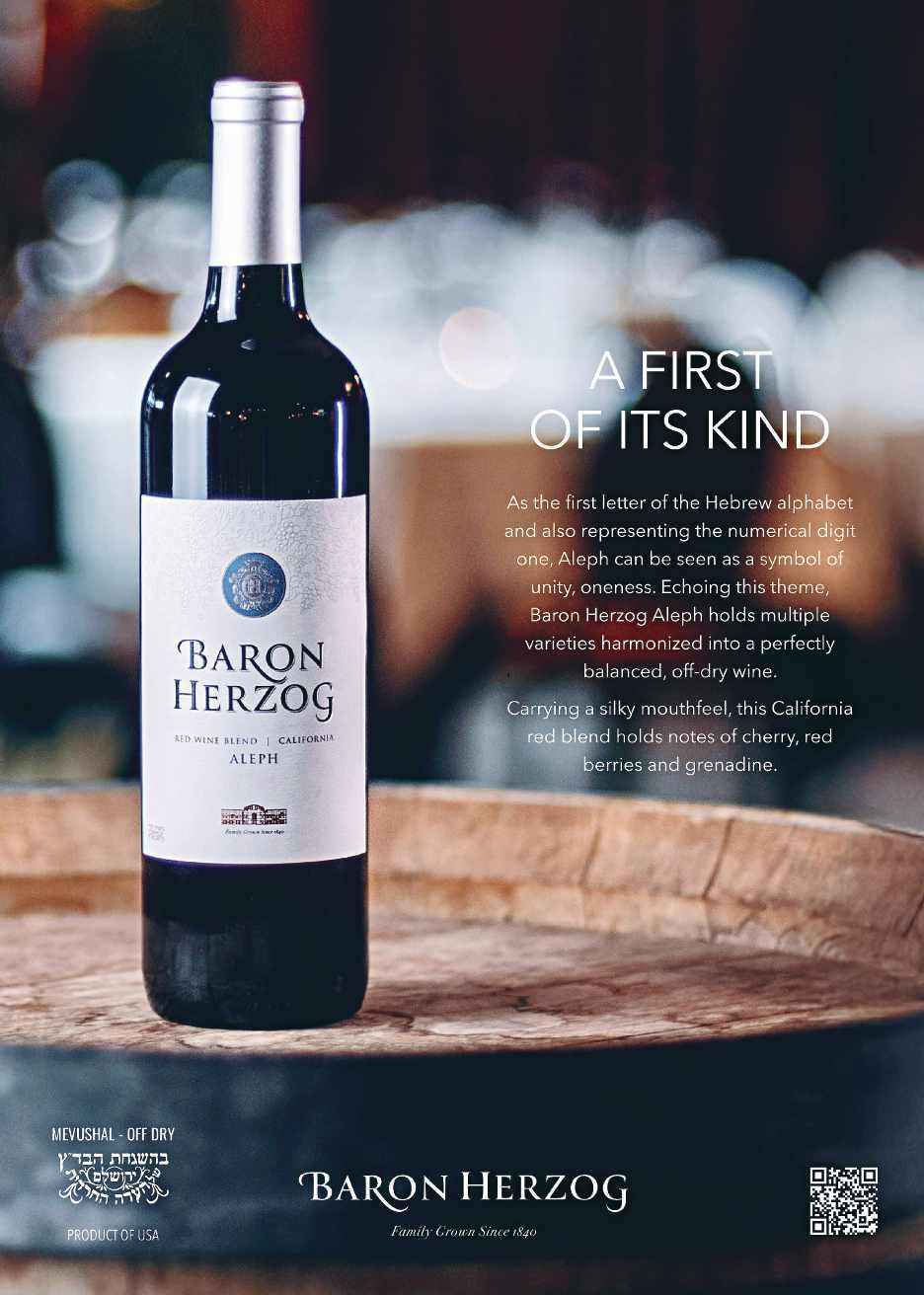THE JEWISH NEWS
MAGAZINE
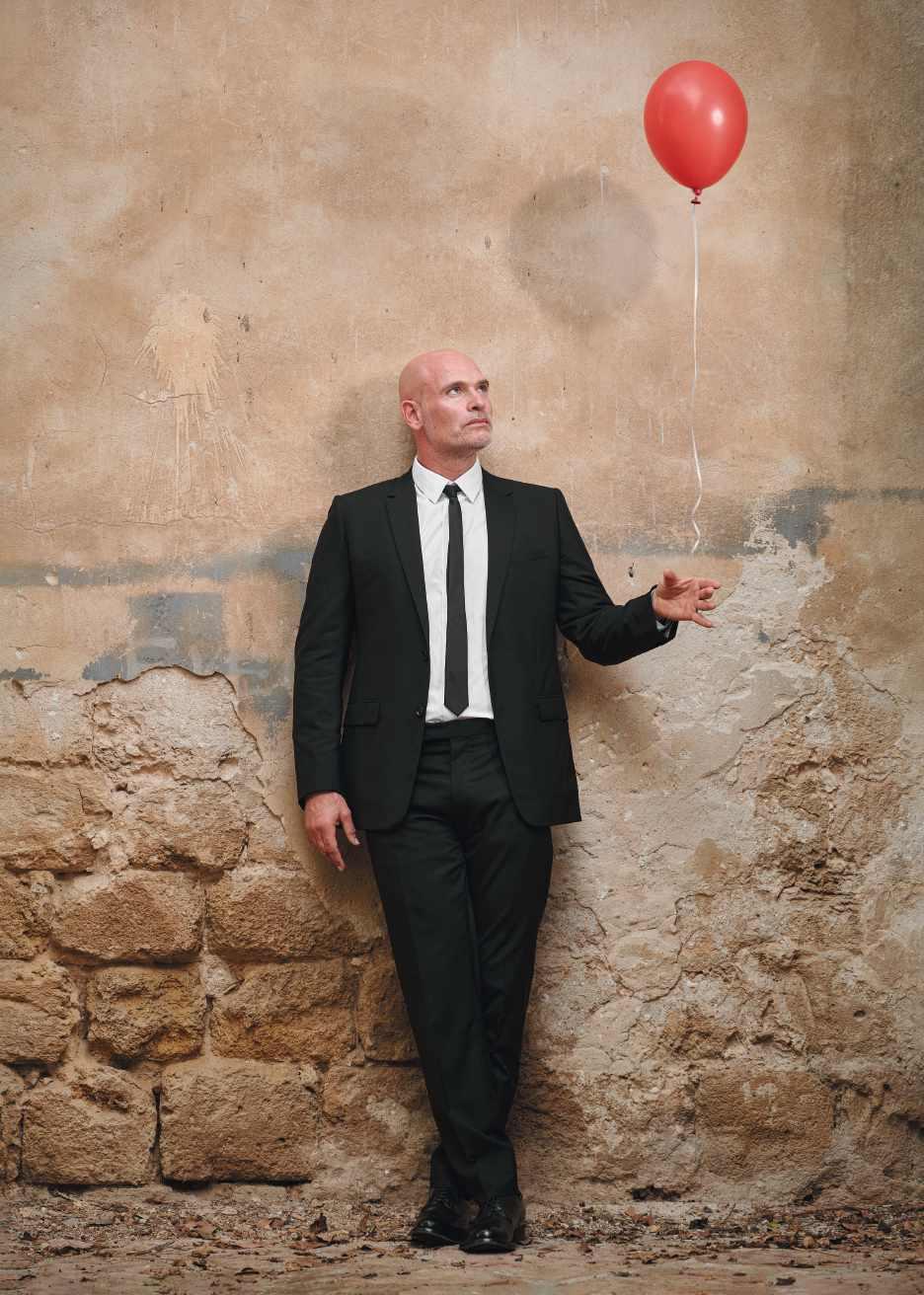
MRS BACON
SEBASTIAN KURZ
SCULPTOR BREUER-WEIL
TECHNION TALENT
ROSH FASHION
EASY RECIPES
HOLY LAND HOMES
LOVE LA

THE JEWISH NEWS

MRS BACON
SEBASTIAN KURZ
SCULPTOR BREUER-WEIL
TECHNION TALENT
ROSH FASHION
EASY RECIPES
HOLY LAND HOMES
LOVE LA




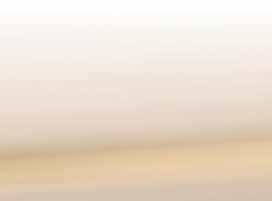
























A modern residential complex in the heart of Jerusalema new way to experience its timeless spirit, breathtaking views and the essence of Jerusalem at every turn.
2-6 BEDROOM APARTMENTS, MINI PENTHOUSES & PENTHOUSES.
EXPERIENCE JERUSALEM LIKE NEVER BEFORE!
STARTING AT £511,000














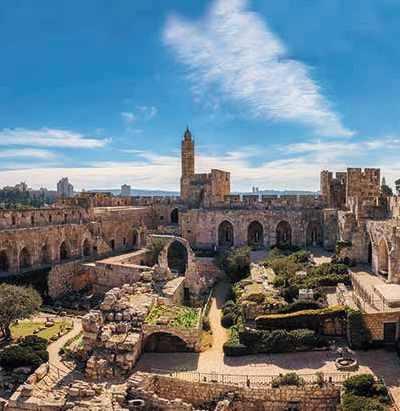




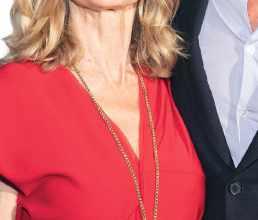
44





114
52 148
65
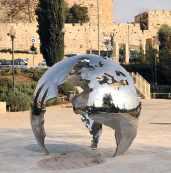
Producing a magazine for the New Year has its challenges. Instinctively it feels wrong to try and entertain readers when the second anniversary of October 7 looms and there are still hostages in Gaza after 712 days. With families grieving and a political landscape in turmoil, are features on fashion, travel and food tasteless? The reality is that life — fittingly the name of this magazine — goes on. With that in mind, we’ve filled this issue with things of substance and interest: from art and film to Israeli hotels, universities and new properties for those considering the move.
Culture is never in short supply. Israeli conceptual artist Uzi Amrani and British sculptor David Breuer-Weil will intrigue with their very different creations, while actor Kyra Sedgwick features as our Bad Shabbos mother. Our cover, shot by Moses Pini Siluk, came with an unexpected story: he was the first to tell me about Banksy’s former business manager making Aliyah. Surprised? We were. But Simon Durban’s extraordinary journey demanded to be told — and he graciously agreed. Since we spoke Banksy has unveiled a mural outside London’s Royal Courts of Justice, showing a judge striking a protestor with a gavel. The timeliness of the street art highlights the now very different outlooks of the artist and his former manager.
I hope you enjoy the magazine over the chagim and share your thoughts with us in what remain di cult times. On a personal note, October 7 resonates with me deeply — not only because of the massacre, but because my own father drowned in Israel on October 6, 1989. His yahrzeit now falls immediately before those of the October 7 victims. That loss shaped a complicated relationship with Israel, one that has since transformed into deep care for the country and its people.
It is a privilege to edit Life and to work with The Jacob Foundation for our community — a community that deserves a safe and peaceful New Year.
Brigit Grant

Editor Brigit Grant brigit@jewishnews.co.uk
Art director Diane Spender
Jewish News editor
Richard Ferrer
Features editor
Louisa Walters
Sub-editor Alex Galbinski
Contributors Debbie Collins, Jenni Frazer, Maayan Harkham, Charlotte Henry, Candice Krieger, Daniel Sugarman, Carole Shaw, Michelle
Rosenberg
Designer Dermot Rushe
Advertising sales
Brandon Cowan
Beverley Sanford 020 8148 9709
sales@jewishnews.co.uk
Front cover image
Moses Pini Siluk
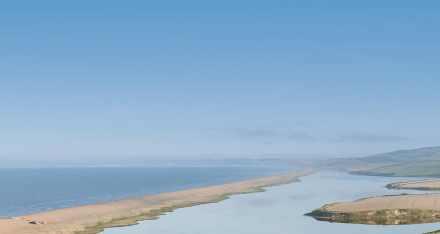
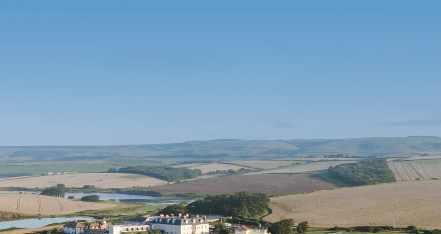
By the sea, in the forest, through the countryside, made for family adventures.







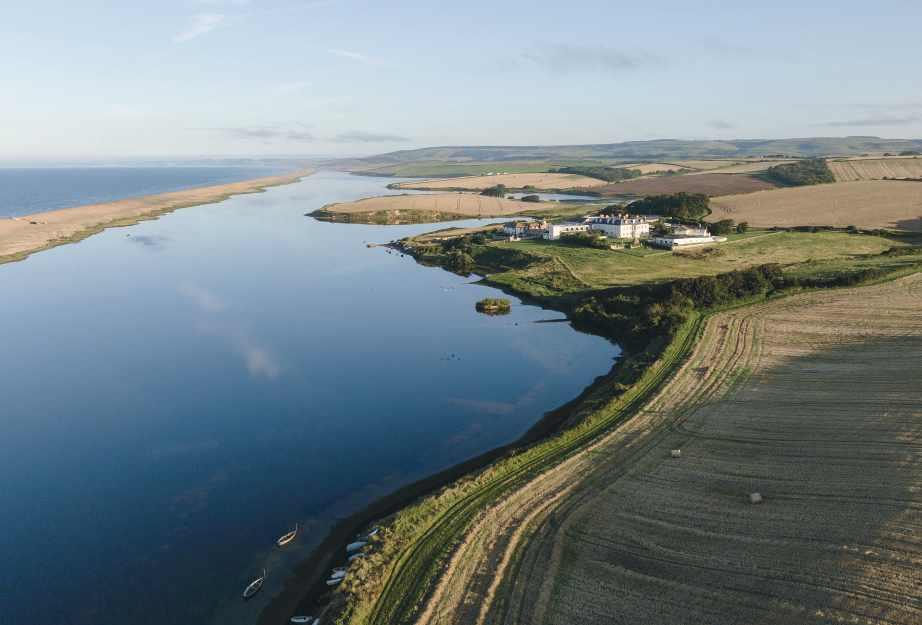
Ever wonder how a song you love came to be? Billy Joel fans would want to know who Big Shot is about or if Scenes from an Italian Restaurant is true. In Billy Joel And So It Goes, a new two-part HBO documentary, the Piano Man himself fills in the blanks. It’s moving to see him do so as he cancelled his summer concerts after being diagnosed with a condition caused by excess fluid in the brain, which can affect hearing, vision and memory.




Friday Night Dinner may have been about the chaos of the Goodman household, but let’s be honest — the true star was Jim, the awkwardly lovable neighbour with his faithful dog Wilson (arguably the wisest of the lot). Forever angling for a seat at the Goodmans’ table – and not-so-secretly swooning over Jackie – Jim has now made it into your home in the form of Talking Jim. Press the button and bingo: “Shalom”, while he savours the aroma of the chicken soup, and issues commands to Wilson that are of course ignored. You can buy Talking Jim for £19.99 at scificollectorshop.co.uk
We have 10 to give away so, to be in with a chance to have Jim at your Friday night dinner table, visit jewishnews.co.uk/talkingjim
The news makes the five-hour doc priceless as it deep-dives into his story as the extremely poor Jewish kid from Hicksville, Long Island, who turned his highs and heartbreaks into anthems. His first wife, muse and early manager Elizabeth Weber, appears a lot and inspired Just The Way You Are and second wife – Uptown Girl Christie Brinkley – also appears. But the most powerful moments are when Joel himself talks about being bullied as the only Jewish child in a Catholic neighbourhood and the sense of not belonging making him The Stranger. For
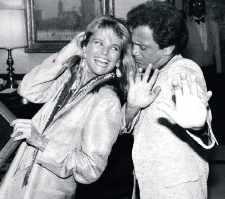
big fans, the documentary is not long enough and there is no UK release date yet, but there is good news as Billy messaged fans to say he is not “deathly ill” and is currently having physical therapy. “Not fixed yet”, he is closing his Long Island motorcycle shop this month and will auction the vintage collection later this year. As he wrote in his song You’re Only Human, “Don’t forget your second wind / Wait in that corner until that breeze blows in".
Be well Piano Man!

Woody Allen turns 90 in November, but work continues as normal. This month, his first novel, What’s With Baum? is published and the story about Asher Baum, a Jewish journalist-turned-novelist is unmistakably and deliciously Allen. Baum's career has collapsed, his publisher has abandoned him and his third marriage is failing, so why wouldn't he suspect betrayal everywhere? The novel is for those who continue to love Woody's films and long to see new ones.There are murmurs of a new film being made in Spain, but he has narrated the Spanish animated short, Mr Fischer’s Chair, which revisits Bobby Fischer’s legendary chess duel with Boris Spassky and the bizarre controversy around the champion’s chair. Here's to Woody spending his 90th his director's chair!






Richard Rodgers and Lorenz Hart wrote more than 500 songs, including My Funny Valentine, The Lady Is a Tramp and Blue Moon – now the title of Richard Linklater’s new film about the duo. Andrew Scott won Berlin’s Silver Bear for his portrayal of Rodgers, opposite Ethan Hawke as the brilliant but troubled Hart, who battled alcoholism, loneliness and his sexuality, and was musically abandoned when Rodgers partnered with Oscar Hammerstein II. Set on a single night – 31 March 1943 – the

Broadway opening of Oklahoma!, the film tracks Hart’s drunken spiral as Rodgers celebrates his new success. Shot in Dublin over 15 days, it uses inventive camerawork to make Hawke appear as famously


short as Hart. It is a poignant film about genius, heartbreak and friendship – and watch out for Jonah Lees (John Lennon in Midas Man), who sings the title track. Blue Moon opens on 24 October
Wrap A Wish is a modern Aladdin’s cave of homeware treasures in Temple Fortune, north-west London. From housewarmings and weddings to just-because-it’s needed moments, its shelves are filled with elegant, useful finds and perfect options for last-minute Rosh Hashanah gifts. With complimentary gift wrapping and a team ready to help you choose, every purchase feels personal. Shop in-store or online at wrapawish.co.uk for UK-wide delivery. calling it “painfully beautiful” and, in a rare move, Netflix renewed it for a second season before the first even aired.

Does the adult cartoon BoJack Horseman make you laugh? Then get ready for Long Story Short, the new Netflix animated comedy from BoJack creator Raphael Bob-Waksberg, once again proudly using his Jewish wit to win over others. Long Story Short (could it be more Jewish?) has just launched on Netflix and follows the multi-generational Schwooper family through time from the 1950s to now. Part satire, part family drama, it’s very BoJack, and the voice cast sparkles with Jewish talent too, with Abbi Jacobson, Ben Feldman, Lisa Edelstein and Paul Reiser. Critics are already calling it “painfully beautiful” and, in a rare




Ari Richter’s graphic novel Whistleblowers: Four who Fought to expose the Holocaust to America is daring in the way it blends Auschwitz and personal history in a comic strip. Avoiding graphic violence, Richter focuses on the emotional aftermath of the Holocaust, combining dark humour and raw honesty as it questions how such history should be told – and retold –through modern art.

Following a career spanning decades, Andy Nyman has recently become a West End star, acting in Tom Stoppard’s Leopoldstadt, and Martin McDonagh’s Hangmen and Hello, Dolly. The latter was his first venture into musical theatre since his turn as Tevye in Fiddler on the Roof, which earned him an Olivier Award nomination, writes Darren Richman. Now he is returning to another iconic Jewish musical role, Max Bialystock in Mel Brooks’ The Producers.

He saw the original 1967 film as a child with his parents. “The reason I loved it so much was hearing my dad absolutely schticking with laughter in the most extraordinary way.”
When the musical opened on Broadway in the mid-2000s, he went with his family and took his parents to the West End transfer. “It’s an incredible piece of work that’s had three lives,” he says. “When the film came out, it was spitting distance from World War Two. The bravery of that piece of writing, the bravery of Mel Brooks’ meshugas, to be able to process the pain and use laughter as a healing device is amazing.”
That original audience would have been affected by the war, something that was not the case when the musical opened. Now the world has changed again with the rise of the far right and this production reflects that: “It’s really stripped back and taken back to the dirty fingernails of the original film. The politics feel more essential now than they ever have. It’s incredible that this man’s work is more relevant, important and funnier than it’s ever been.”
It’s incredible that this man’s work is more relevant, important and funnier when he wrote a gag for his hero. announcement about turning your Nyman came up with an a pitch perfect impression
One of his proudest moments working on this production came when he wrote a gag for his hero. Brooks had been asked to do the announcement about turning your phones off and he didn’t want to. Nyman came up with an alternative and the response from Brooks, recounted in a pitch perfect impression of the 99-year-old, was: “I love it! I’ll do it!”
Channel 4 once offered Nyman a five-year deal doing
“mind-reading magic” when work as an actor was hard to come by. Despite having both a baby and a mortgage, he turned it down because he did not want to jeopardise an acting career. Instead, he said he would work with whoever they found. He wrote and directed hours of television and theatre with the mentalist who took the role – Derren Brown.
A chance meeting with Jeremy Dyson, the non-acting member of The League of Gentlemen, came on Jewish summer camp in 1981, and ultimately resulted in Ghost Stories, the 2010 play they adapted for the big screen in 2017. That project was hugely informed by their Jewishness, as is much of Nyman’s work.
He was brought up in a kosher h ome in Leicester, “traditional but not desperately frum”. He no longer keeps kosher but says Modeh Ani when he wakes and often recites the Shema at night. He has maintained a close friendship with the rabbi in Leicester, lays tefillin on occasion, but says: “Being a good Jew is not about how often you go to shul”.
Like the man behind The Producers, Nyman refuses to be pigeonholed.
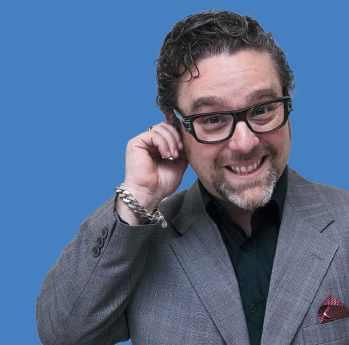

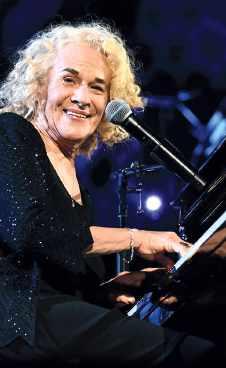
There was a biopic in the works with Star Wars ’ Daisy Ridley set to play Brooklyn-born Jewish songwriter Carole King, but the project went south. Perhaps because King’s rare mix of musical genius and earthy New Yorker requires Alana Haim?
Instead, journalist and former Forward editor Jane Eisner has delivered what Hollywood didn’t: Carole King: She Made the Earth Move (Yale Jewish Lives), the first full biography. Born in 1942, King conquered the charts in the ’60s with hits such as Will You Love Me Tomorrow before redefining the ’70s singer-songwriter era with Tapestry, winner of four Grammys. Eisner charts King’s battles to balance fame and motherhood, her retreat to Idaho and return as activist and then focal point of Beautiful: The Carole King Musical. With new interviews and archival depth, it explores her Jewish roots, four marriages and a 60-year career. Buy it if you know the words to You’ve Got a Friend
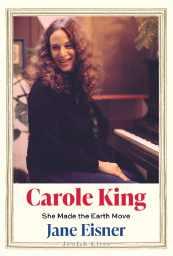






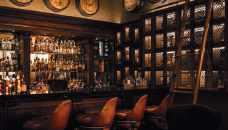



JW3 is back with a packed season of Jewish arts, culture and fun, starting on 30 September with world-renowned pianist Dame Imogen Cooper launching its Classical Music Series. On 16 October, five years of the satirical Jewish magazine Private Oye! are marked with a rare public appearance by its creators Ben and Tilla Crown. Then on 30 October, catch a vibrant chamber concert featuring mezzo-soprano Helen Charlston, arch-lutenist Sergio Buchell and viola da gamba virtuoso Jonathan Manson. And then opera makes its JW3 debut with A World Turned Upside Down: The Diary of Anne Frank (5 November), a powerful new piece by Juliana Hall, with Ana Balestra as Anne. Brilliant stand-up Mark Maier’s new show Jewvenile arrives on 18 November and although we don’t want to frighten you, pantomime



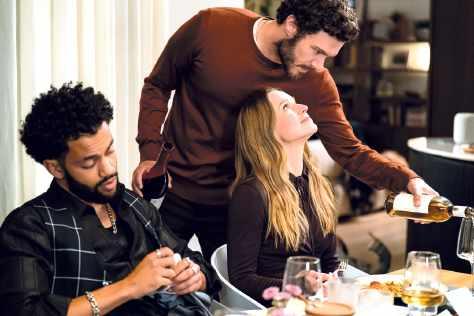
Expect a temperature rise on 23 October when the ‘hot rabbi’ returns in Netflix’s Nobody Wants This. When we last saw Joanne (Kristen Bell) and Noah (Adam Brody), he had been offered the head rabbi gig and she was toying with conversion, but then Noah's ex Rebecca told her how tough it was to be a rebbetzin. If Joanne really doesn’t want to make Noah choose between his religion or their relationship, there would be no season 2 and there is – with Gossip Girl’s Leighton Meester as Joanne’s

high school nemesis who is now a mummy influencer. But is she Jewish? Roll the kneidels!

7 December – with . season starts on Cinderella and the Mazto Ball jw3.org.uk


The new Lifelong Learning Programme at LSJS is more inspiring than ever and with its soon-to-launch website, exploring and booking courses will be easier too. From Tanach and Talmud to Israeli history, parasha study, Jewish thought and immersive tours, LSJS offers something for everyone.
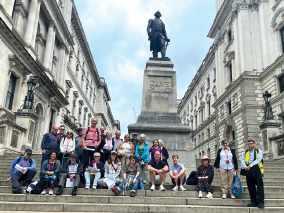
Highlights include People of the Book: The LSJS Biblical Personalities Course, Joseph & Judah, Studies in Sanhedrin and Maimonides, plus the fl agship free series Covenant & Continuity, continuing Rabbi Sacks’ Torah with leading international teachers. Add in women’s learning programmes, special lectures on theology and law, unique tours from Tel Aviv’s ANU Museum and a Chanukah walk through the British Museum, plus fl exible online learning and Ulpan Hebrew courses, you have got a season full of opportunities. lsjs.ac.uk

Michael Etherton, chief executive of UK Jewish Film, wants to see you at the festival in November. Because “our community is facing increasing marginalisation and the festival is a rare and important opportunity to remind ourselves, through film, of all that is beautiful, creative and unique about Jewish stories”. No one knows this better than Michael as he finds courageous Jewish film-makers, promotes them and wants audiences to “support and allow them to be seen and heard”.
So ahead of releasing his full November list of powerful and entertaining films from across the world, he is giving you a nod towards the delightfully argumentative Argentinian comedy Mazel Tov, Tom Shoval’s documentary A Letter to David, which is written to his friend who was abducted from Kibbutz Nir Oz on October 7 and there’s Nina Is an Athlete, directed
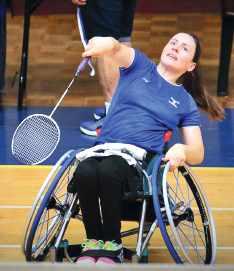
by
Ravit Markus and filmed over three years, which is a portrait of Nina Gorodetsky, a wheelchair badminton champion confronting motherhood and her Paralympic dream. Eight new British Jewish films supported by UKJF’s short-film funds will also premiere before touring the country.

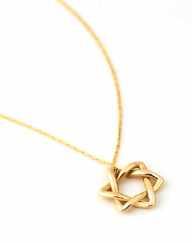
When you buy from Cohens Jewellers in Temple Fortune, you are purchasing from a fourth-generation family firm. For more than 55 years, it has served the community with dedication and expertise, specialising in new and pre-loved jewellery, Judaica, jewellery and watch repairs, valuations and bespoke designs. The family’s heritage dates over a century to A & J Cohen in Hoxton, with the Temple Fortune branch continuing the legacy under siblings Natalie and Robert. Cohens is renowned for customer care and a warm, welcoming atmosphere. cohensthejewellers.co.uk
You’ve only got til tomorrow night to see Fran Lebowitz at the Barbican. The legendary New York essayist, raconteur and professional complainer has swapped the page for the stage for one night. Expect the dry Jewish humour that made her a Scorsese favourite. No script, no filter – just Fran, a microphone and you. barbican.org.uk
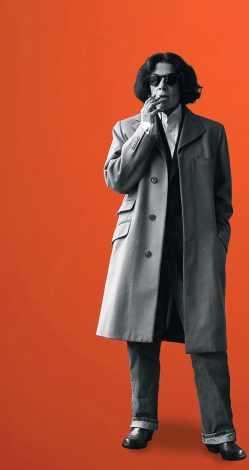
On Saturday 18 October (3pm-4pm), the Barbican’s Pit Theatre hosts a remarkable journey into London’s Jewish past with Yiddish Poetry of the East End Part of VOICED: The Festival for Endangered Languages, the performance brings together author Rachel Lichtenstein and poet Stephen Watts to explore the life and legacy of Yiddish poet A.N. Stencl (1897–1983) who chronicled the struggles and vibrancy of East End Jewish life. barbican.org.uk
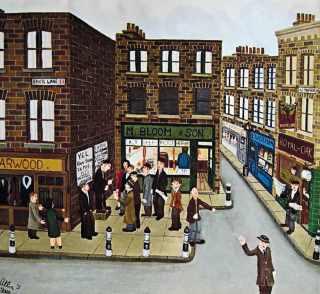
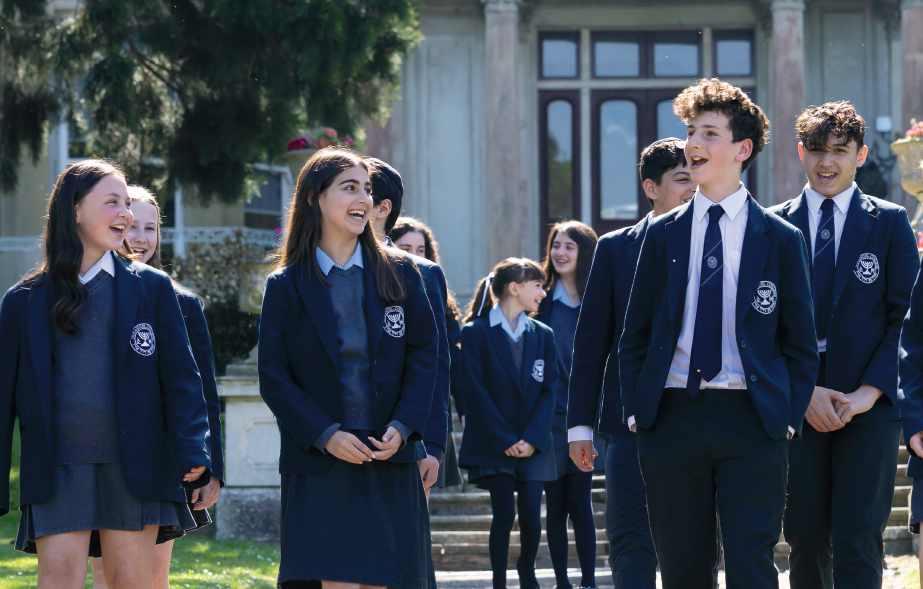
IC6
Open Evening Monday 29 September Book online
Discover the Difference at Immanuel College – where personalised learning meets limitless potential.
We believe in the power of small class sizes, inspiring Jewish education, outstanding pastoral care, and a personalised approach – ensuring every child flourishes.
Bursaries and Scholarships are available.
Register for our Open Evenings and events and start your child’s journey with the Immanuel family.
The Independent Jewish School for 10-18 year olds

Choosing the right kitchen can be very stressful for most people, which is why we pride ourselves on our excellent customer service. All you have to do is sit back, relax and let us take the stress away.
SIA Kitchens are specialist UK suppliers of Luxury German kitchens and Bespoke In-Frame British Kitchens. We pride ourselves in offering only the very best kitchen design, quality, service and value for money. Our highly experienced staff are experts in our field, so you will receive only the very best ‘one-to-one’ service, from the initial design & consultation process right the way through to completion.
We have an online kitchen price estimator, please use the QR code on this letter to get an estimate on your dream kitchen or pop down to our local showroom in Elstree for a freshly brewed tea or coffee so we can discuss your requirements.
We look forward to welcoming you into our showroom so we can explore your plans together.























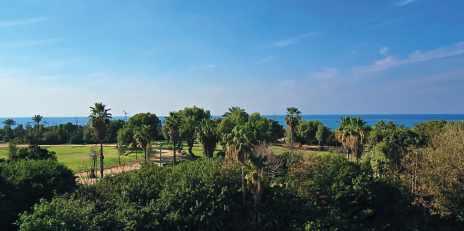

Karoline Preisler is the social media star who stands alone at marches defying hate.
By Brigit Grant
Wherever there’s a pro-Palestinian march in Berlin, she’ll be there. There, beside the chanting crowds with a sign above her head: “RAPE IS NOT RESISTANCE. BELIEVE ISRAELI WOMEN”. And in the other hand, another sign with images of hostages.
The lone figure in the signature red coat has been a presence on social media for almost two years. While some allies have moved on to theatre stages and TV chat shows, Karoline Preisler has stayed put. She is an unshakable opponent of antisemitism on Germany’s streets.
Speaking to Life, she confesses she has barely slept. “Currently it’s less than four hours a night. I’m rarely home.” She is always listening for the sound of a drum. The protest signal.
Karoline’s day is ordinary. Work, shopping and dinner with her children, but always in her handbag are the folded signs, ready for any demonstration. “Justice must prevail on the streets as well as in the courts,” she says. “I can’t simply accept injustice.”
Some weeks, she is out there for three days; sometimes more. Her stance is quiet, her face expressionless. It’s a look of calm that infuriates her opponents, who are shown in states of rabid fury on Instagram and TikTok. The red coat stands out like a warning flare in a sea of hostility, although she is as effective in summer florals.
Karoline’s defiance is rooted in her own history. Born in the former GDR, she grew up in a state that viewed Israel as the enemy. Politically active against the dictatorship, after the Berlin Wall fell, she embraced the democracy. “Democrats must support one another,”
she says. “Israel is a democracy and shares our values.”
Now 54, she is a lawyer and a mother of four who had previously visited the Middle East although not Israel. Her support brought an invite.
“Nothing could have prepared me for I saw and experienced,” she recalls. “The constant threat of rocket attacks, meetings with hostage families, Nova.”
Karoline also met with President Isaac Herzog and his wife Michal, as well as Israelis who recognised her from Facebook and wanted selfies with the woman in red who sees their pain and wants it to stop.
“My picture is now more complete,” she says. “I think constantly of the women – mothers, daughters, sisters –of the murdered and kidnapped. October 7 is a trauma.”
Karoline describes the ideology she confronts in Germany as a cult moving forward in familiar stages. “First the Jews, then the Druze, Yazidis, Christians, women, professors with different opinions… We saw these plans in the Nazi era. While we teach our children love and compassion, they teach theirs to become martyrs. They call it criticism of Israel or capitalism, but it’s always about the extermination of Jews.”
Karoline’s activism has a cost. She no longer goes to restaurants or shops with her children. “It’s dangerous. I get recognised, spat on, followed, insulted. Hamas supporters targeted me in May last year. I was severely injured in my shoulder. The perpetrator was proud of it.” Fortunately she is not alone. There is support from the police who surround her at protests, from Jewish communities, Druze, Yazidis, Iranian exiles, Christians, liberal Muslims, friends around the world and strangers
who greet her on the street. “I attend marches because others can’t. Everyone has their place in society. Mine is on the barricades.”
Her youngest daughter is 15, and Karoline often imagines what it would be like if she never came home from a festival. “What the hostage families have gone through – are going through still – is unbearable.”
With such strident views, it’s no surprise she is also an author. Her first book, Enduring Democracy! On Arguing in a Society of Outrage published in 2021, will be followed in November by Our Freedom, which traces her journey to Israel and explores the dangers posed by Islamism and left-wing extremism. “If we are serious about feminism, we must oppose backward ideologies,” she says. “All our values are at stake, our children’s futures. There will be a better future; I am fighting hard for that.”
Karoline speaks warmly about her connection to Israel. The culture of Jerusalem, the dependable people in the north, the women from WIZO and also Philosophy Professor Arie Kizel at Haifa university who focuses on the education of children.”
She lights up when she talks about the art scene, fashion, and her friend’s silk flower shop on Geula Street in Tel Aviv. But it is the memories of October 7 that haunt her most deeply. “Anyone who visits Nova will never forget it. I thought of Shani Louk, Gal Abdush, Rom Braslavski. Those are just three stories. October 7 will change the world forever.”
With such passionate views, how does she stand in silence before a baying crowd, confronting hate with only a sign? Karoline pauses, then checks the time. She has somewhere to be. She picks up her handbag.
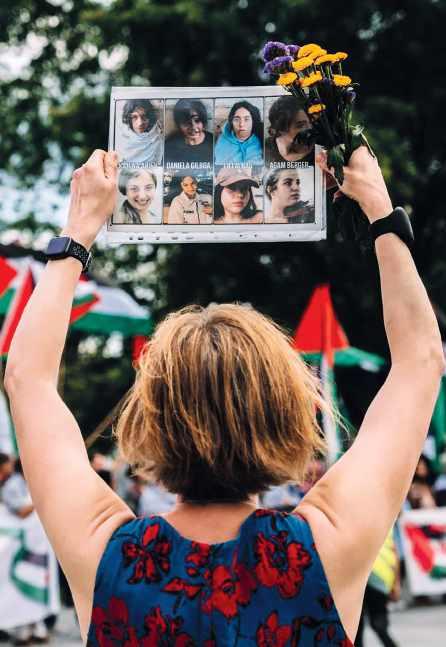
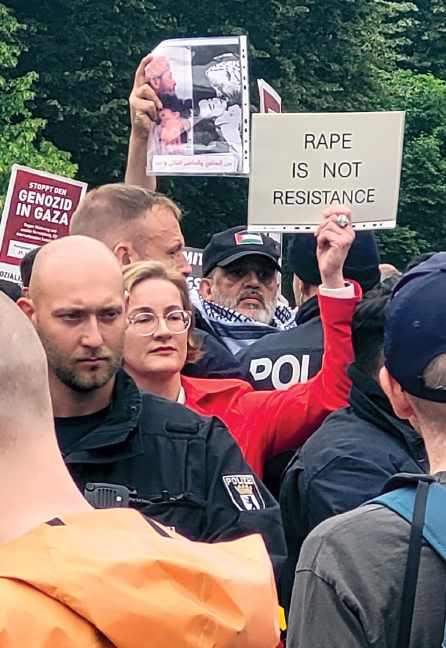
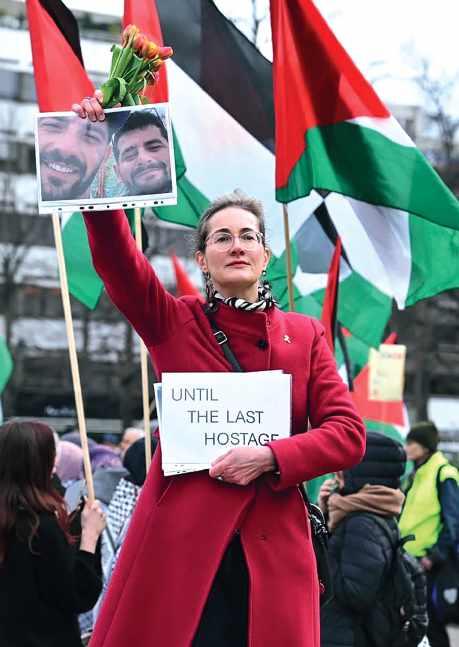
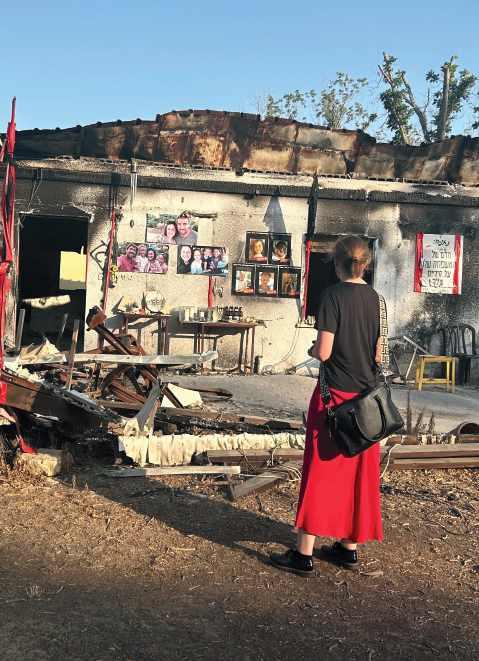








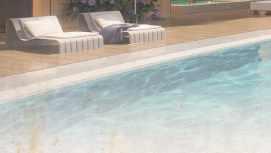








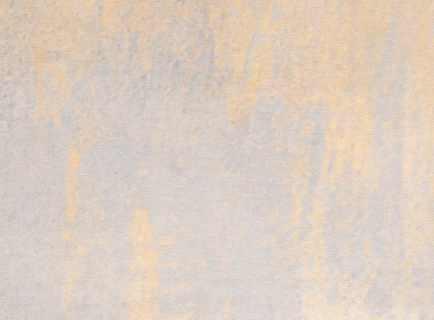

SCAN FOR MORE DETAILS



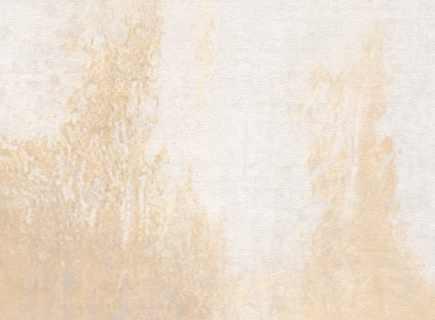


‘Surely it’s better to be a Jew than an atheist ?’
Jon Ronson sums up his schtick – across newspaper journalism, bestselling books and pioneering documentaries –as telling “nuanced, humanist, grey-area stories about how people are a complicated mix of positive and negative characteristics”.
But even the mellow-mannered and softly-spoken merchant of ambiguity has struggled to respond to the outburst of anti-Jewish racism since October 7.
“It’s been a shock, right?” he says, his wide-eyed expression enhanced by his circular, bug-like specs, on a video call from his home – a former llama farm – in Upstate New York.
“I’ve never experienced antisemitism… until now. I went to Cardiff High School, which wasn’t the roughest school in Cardiff, but it was no picnic, and I never experienced any antisemitism at
I was hoping Ronson might have some wisdom to impart, having studied so many of the currents of our times during the past quarter- century: Islamists and conspiracy theorists in 2001’s Them: Adventures with Extremists ; the madness industry in 2011’s The Psychopath Test ; and internet mob mania in 2015’s So You've Been Publicly Shamed But he seems as befuddled as the rest of us. “I don’t know,” he stutters. “I think I’m still feeling too surprised at the rise of antisemitism to really know how to counter it.” He falls back on his life’s credo (but, I sense, espouses it less convincingly than he might have done two years ago). “Complicated, clever people do stupid things,” he says, “stupid people do clever things. You know, humans are just a mess. My way of handling all of this horror is just to keep telling those stories. That’s all I’ve got.”
stories.
It has all made the 58-year-old feel “a lot more Jewish” of late “I’ve been going to Shabbat dinners more frequently. I think a lot of people have. Somebody said to me the other day: ‘Nothing gives you more of a sense of identity than when that identity is under attack from other people.’” At the same time, he has watched friendships dissolve before his eyes. “A friend of mine posted a message on Instagram that said something along the lines of, ‘We all know that Zionists take pleasure from seeing photographs of dead children. We’re not dealing with human beings.’ And I don't need to tell you how ‘blood libel’ that sounds. So I’ve lost friends because I felt that their anti-Zionism has become antisemitic.

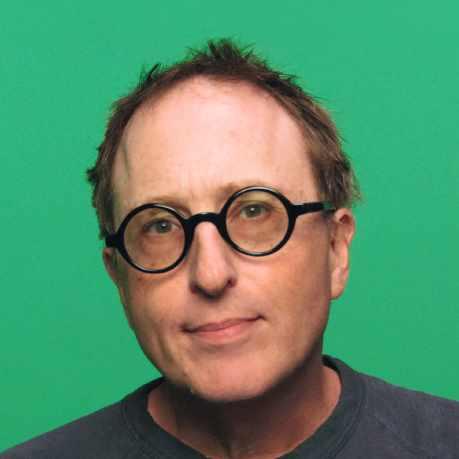

You just think, ‘Well, they’ve lost their sense of reason.’” Even though Ronson’s family was not “particularly religious, we went to an Orthodox shul”. Then he discovered Reform. “The girls were hotter and [youth movement] RSY was kind of cool. Everyone was lounging around smoking and listening to Simon & Garfunkel. I thought, ‘This is my version of Judaism.’ Going to the summer camp and winter camp are the happiest memories of my teenage years.”
Ronson exhibited his journalistic instincts from a young age. “I remember I used to really piss off my parents because they’d tell an anecdote. And everybody would laugh. Then I would always say, ‘Well, what happened after that?’ They’d get really annoyed with me, like, you know, ‘No, that’s the end of the story.’ So I’d always want it go on a little bit further.”
It is this need to forever dig deeper that sees him return to Britain to revisit The Psychopath Test , on a UK-wide tour. Mystery special guests will help answer readers’ burning questions… What happens when a psychopath is in power? Could you learn to spot a psychopath? Are you working for a psychopath?
It is 14 years since the book became a hit, and Ronson is fascinated by how psychopathy is now becoming “destigmatised”. “You’ve got psychopathic TikTokers now. People are like, ‘I love you, Kanika – thank you for this lifestyle advice about how to love bomb somebody and then devalue them.’”
His foray into international Islamism, originally for 1997 documentary Tottenham Ayatollah , was equally prescient, even though the jaunty tone – as Ronson trailed cleric Omar Bakri Muhammad – jars with what we know now, post 9/11, 7/7 and so on.
Ronson recalls the Channel 4 commissioner saying that everyone would love there to have been a documentary about Hitler before he was infamous. “He said to me, ‘Maybe this will be your Hitler The Watercolorist ’. And it kind of turned out to be true, right?”
‘ Omar Bakri told the crowd, ‘Look at me with the in del Jon’ ’


The hairiest moment came when Bakri announced his recent discovery to the crowd at a training camp in a Scout hut in Crawley. “Omar suddenly says, ‘Look at me with the infidel Jon, who is…’ and he paused, ‘A Jew!’ They all went ‘Ahhh!’ And I said, ‘Surely it’s better to be a Jew than an atheist?’”
Ronson chuckles. “Why I would choose a jihad training camp to assert my Jewishness is beyond me.”
Jon Ronson’s Psychopath Night UK Tour runs through out November. Tickets are on sale now at fane.co.uk/jon-ronso n
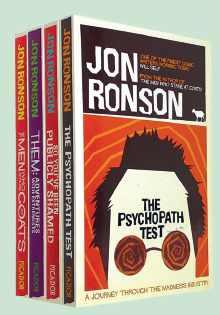

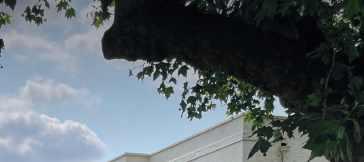
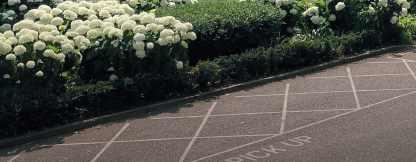
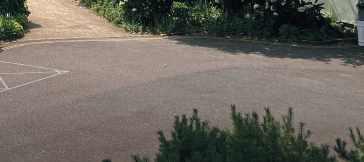

Wishing you a sweet and peaceful New Year. We look forward to welcoming you back in AM 5786.









Find out more Celebrate, stay, dine and spa well... at Sopwell

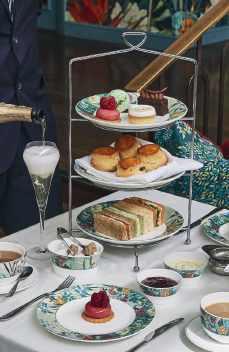



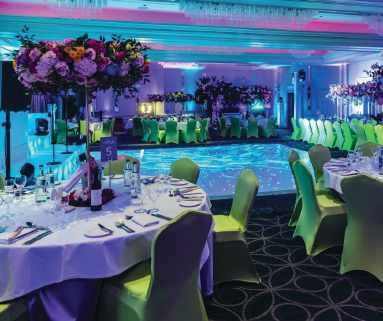
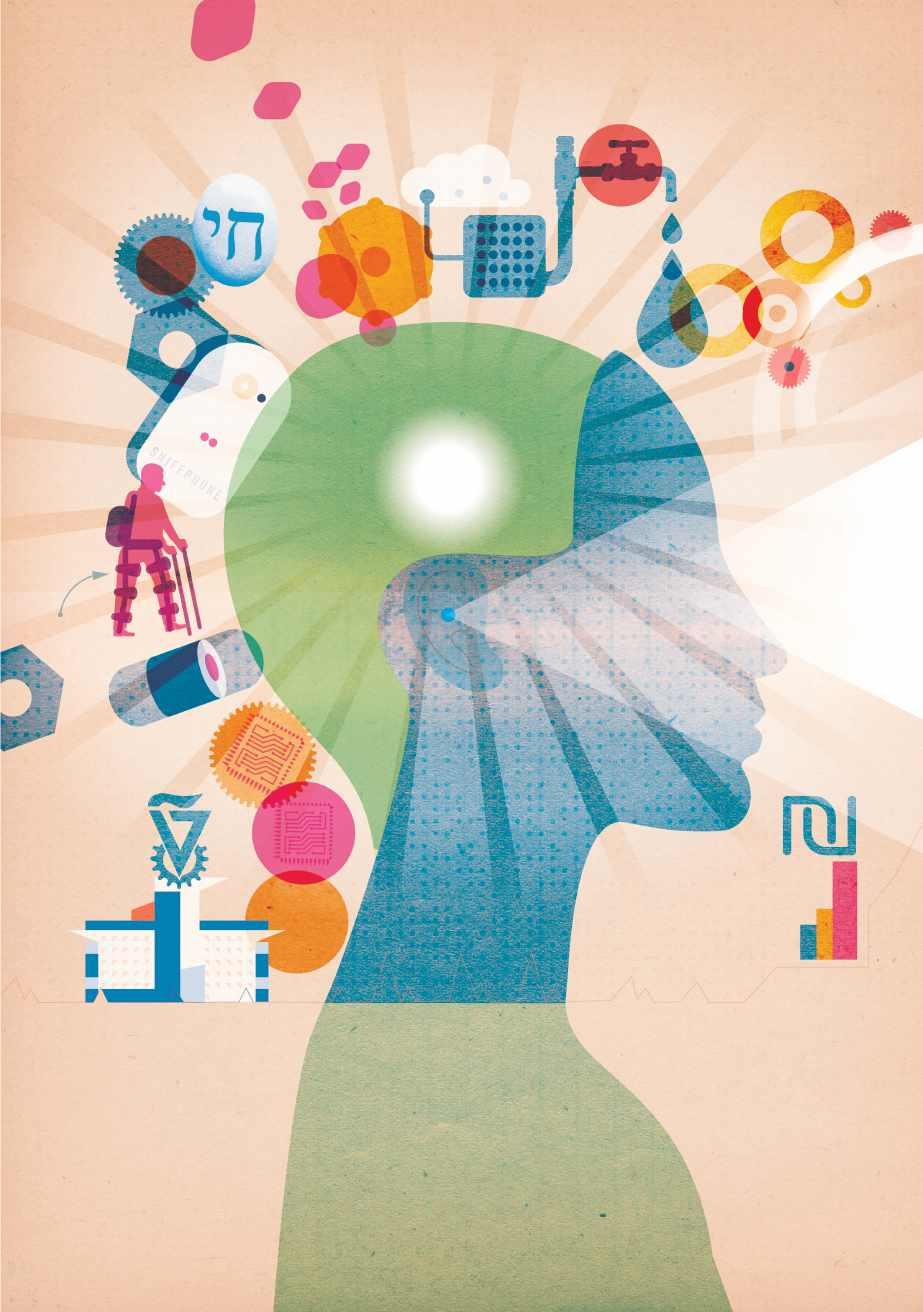
From conflict to innovation powerhouse: a nation of solutions. Alan Aziz, CEO of Technion UK, shares some of its successes
For months, the news cycle has painted Israel in a single shade. One of conflict, protest and war. It’s a view that, for many, has come to feel like the whole picture. But that’s never been the full story. As of early August, Israel is making headlines for innovation. The EU is reportedly considering suspending access to Horizon Europe funds for Israeli firms, yet major multinationals, such as Nvidia, are moving ahead, planning a massive artificial intelligence (AI) campus in Haifa that could create thousands of jobs. At the same time, start-ups born from military reservists, like SkyHoop, a drone-alert system, are gaining international traction.
The world is starting to see Israel differently – not just as a state under pressure, but as a country shaping the future. At the heart of this reappraisal is a flourishing innovation economy, anchored by institutions such as the Technion, Israel Institute of Technology. The Haifa-based university isn’t just producing patents, it’s producing purpose-driven impact that touches lives on every continent. And the economic indicators are catching up to the narrative.
In a year when global markets have remained turbulent, Israel’s shekel has surged to its strongest value in more than 24 months. Analysts credit this to a rise in international investment, a string of recent initial public offerings in health tech and cybersecurity, and the resilience of the country’s science-led economy.
The shekel was recently the world’s top-performing currency, an unusual feat amid war and political instability. That strength tells a deeper story: global markets are placing faith not in ideology, but in Israel’s ability to innovate and rebound under pressure. This year alone, researchers and alumni from Technion have made news across six critical areas: PillCam, the camera-in-a-capsule developed by Technion alumnus Dr Gavriel Iddan, passed a major milestone
in 2025: more than four million patients have now used the device globally, solidifying its place as one of the most important non-invasive diagnostic tools in modern medicine.
The Iron Dome, whose core algorithms were developed by Technion-trained engineers, was recently upgraded with AI-powered predictive tracking, further raising interest from defence partners. ReWalk, the exoskeleton invented by Technion graduate Amit Goffer, is now being deployed in new rehabilitation centres across the UK and Europe following NHS-backed pilot schemes. Watergen, developed with contributions from Technion research teams, has signed a major agreement to install its air-to-water systems in parts of India facing severe drought conditions.
The SniffPhone, a Technion nanotech diagnostic tool, has moved into Phase III trials with promising results for early cancer detection, placing Israel at the frontier of breath-based health screening. NanoGhosts, developed at Technion’s stem cell lab, are showing early success in human trials in France and Israel, offering targeted cancer therapy with minimal side effects.
These aren’t speculative concepts; they are real-world technologies delivering impact in real time. And, increasingly, foreign governments, non-governmental organisations and industry leaders are not just licensing Israeli innovations but are partnering to build them.
Israel a strategic innovation partner
While Israel once built its reputation on scrappy, high-risk start-ups, 2025 marks a shift in perception. Israel is no longer just the Start-Up Nation. It’s becoming a strategic innovation partner to the world’s largest institutions.
responsible AI and climate resilience.
In May, the European Union announced a new €110 million (£95m) research initiative involving Technion labs, aimed at advancing energy storage technologies.
The university’s reach extends well beyond academia. Technion alumni lead some of the fastest-growing companies in Europe and the Gulf, and its faculty are driving global conversations about ethics in AI, biotechnology regulation and sustainable urban design.
What sets Israeli innovation apart is that it’s not just clever, it’s mission driven. Technion’s ethos is rooted in tikkun olam, the Jewish idea of repairing the world. This year, its engineers are helping deploy mobile diagnostics in refugee camps. Its agricultural labs are improving food yields in drought-prone East Africa. Its clean energy researchers are working with Pacific Island nations on climate adaptation. And for all its complexity, this is a side of Israel the world is hungry to see: practical, visionary, compassionate.
This fresh narrative is especially powerful for diaspora Jews. For many, particularly younger generations, Israel’s role in climate innovation, medical technology and social impact resonates more deeply than political soundbites. Seeing Israel through the lens of innovation is not an attempt to erase its challenges but to balance the picture. In a world full of problems, Israel is offering solutions. And it’s doing so in ways that bring pride, not just to Israelis but to Jews across the globe who see in this work the values of perseverance, learning and contribution.

Technion’s role in this cannot be overstated. Its collaboration with Cornell University, the Jacobs Technion-Cornell Institute in New York, has entered a new phase, focusing on
Technion-Cornell Institute
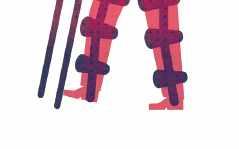
but by engineers, entrepreneurs. The strong increasingly, are hopeful, can do big things.
As a new year unfolds, Israel’s story is being retold not by politicians, but by engineers, scientists and entrepreneurs. The strong shekel is a signal. The global partnerships are real. The technologies are tangible. And the headlines, increasingly, are hopeful, proving that small nations can do big things.
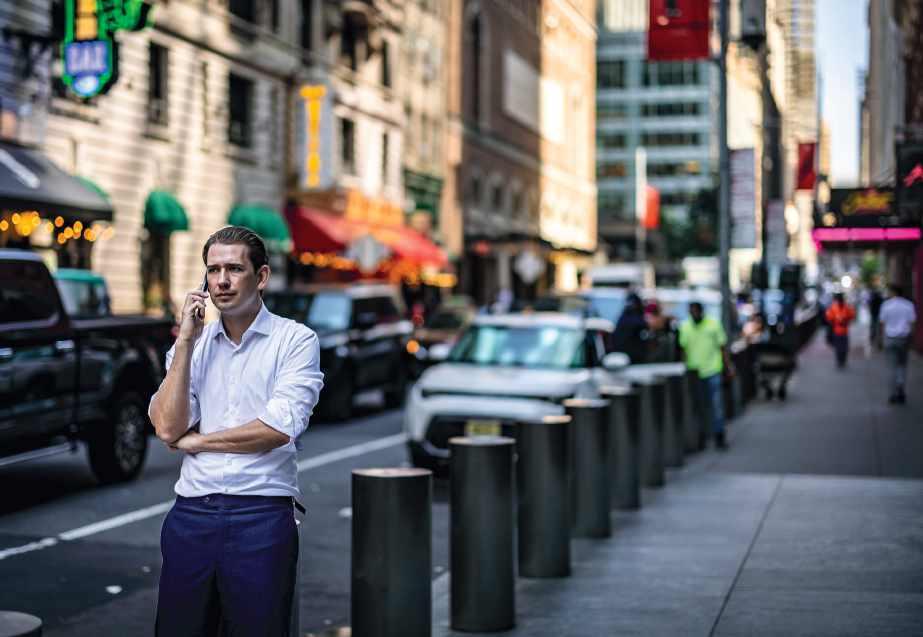
Austria’s former Chancellor Sebastian Kurz tells Candice Krieger about his role as co-founder of a ten figure cyber start-up
When Sebastian Kurz stepped down as Austria’s chancellor in 2021, it closed a remarkable chapter in European politics. At just 31, he had become the youngest chancellor in Austria’s history – and the world’s youngest head of government – after a rapid rise through the People’s Party during which he was appointed Europe’s youngest-ever foreign minister to be elected for two terms as chancellor.
In office, he shaped debates on migration, Europe’s future, and the Middle East, earning an outsized international profile for the leader of a small country.
Now, several years later, Kurz is back in the spotlight for an entirely different
reason: cyber security. And, perhaps unexpectedly, Israeli cyber security.
Dream Security, the company Kurz co-founded with Israeli cyber tech pioneer Shalev Hulio, protects government systems and critical infrastructure around the world.
In February, it became Israel’s first unicorn of 2025 with a $1.1 billion valuation, and recently joined the World Economic Forum’s Innovator Communities – a platform for top start-ups to collaborate with global leaders, shape policy and tackle major challenges.
So how does a former youngest head of government in the world pivot from politics to business and get to become the co-founder of one of Israel’s most successful start-ups?
“When I left politics, I didn’t know what to do,” Kurz says. “So, I did
what many former politicians do, I started an advisory company.”
He worked with eminent American entrepreneur Peter Thiel, the founder of PayPal, Palantir Technologies and Founders Fund. “I realised how big the change driven by AI [artificial intelligence] really was becoming and knew I wanted to build something –something more entrepreneurial than just advisory. Something that made a difference.”
T his ambition set him on a global search for business partners – and, by chance, into a serendipitous car journey in 2022 with Hulio, who was the founder of NSO group, known for developing surveillance technology, including the Pegasus spyware.
“The person who was meant to be picking me up from Ben Gurion airport couldn’t make it, so Shalev came instead,” explains Sebastian. “We immediately had a click moment.
“I could see he was a genius and, by the end of the trip, I thanked him for the ride – and told him I wanted to start something together.”
Within days, Sebastian and Shalev
agreed to combine AI, cyber expertise, and critical infrastructure know-how – and Dream Security was born.
Founded the following year and now more widely known as Dream, the company, headquartered in Tel Aviv, protects governments and critical infrastructure against the kinds of attacks that Kurz, as a former head of state, had seen first-hand.
“I saw how problematic the cyber threat already was,” he says. “For countries like Austria, the risk of a missile strike is very low – but the risk of a cyber attack is real. It happens every week.”
For most European capitals, says Kurz, the greater threat isn’t missiles but malware – with state-backed hackers targeting hospitals, power grids and transport networks to cause chaos or endanger lives. Dream’s mission is to stop those attacks before they cause real-world damage.
T he company reported orders of $130 million (£96m) over the past year. While Kurz can’t disclose specific client information, they include government authorities and critical infrastructure in Europe, Asia and the Middle East.
In just three years, Dream has raised $155m – including from US-based Group 11, led by IsraeliAmerican financier Dovi Frances, its largest investor.
But, despite the accolades, the blue-eyed co-founder is clear-eyed about what really matters.
“It’s about contributing to make the world a safer place,” he says. “The October 7 attacks were a turning point – not only for Israel, but [also] for how the world understands security.
“October 7 showed us that anyone is at risk. Even countries that feel secure can be hit in ways they didn’t expect. We are seeing cyber attacks become central even in traditional wars – October 7 in Israel and look at Ukraine. It’s not just bombs that cause chaos anymore. Imagine if a country’s banks stopped working, or if someone poisoned the water supply. These are real, daily threats. And with technology becoming more sophisticated, they will only grow.”
T he company’s ascent earned it a coveted invitation to join the World Economic Forum in July, where Kurz, through his days in politics, is no stranger.
“I’ve been visiting Davos for 10 years, but being there now as a founder is
special,” he says. “It’s a great place to connect with governments and other players in our industry – especially for a young company.”
Dream will participate in international discussions on the future of digital security and protection of critical infrastructure.
Born in Vienna, Kurz, now 39, became Austria’s – and Europe’s –youngest foreign minister in 2013. He joined the Young People’s Party (JVP) in 2003 and rose quickly, becoming foreign minister before serving as Chancellor from 2017 to 2019, and again from 2020 until his resignation in 2021.
During his time in office, Kurz visited Israel several times, becoming wellacquainted with its innovation culture.
“I was always impressed by the idea of the ‘start-up nation’ – so many great companies are built in Israel,” he says. “In government, I always tried to meet the Israeli tech community to learn a bit for Austria and the European ecosystem. But it’s impossible to copy. It’s unique, and it’s a privilege to now be part of it and work with so many talented people.”
Hulio brought deep technical
BELOW:
‘In government, I tried to gather the most talented people around me. That's what we do at Dream’
expertise from NSO, whose powerful –if controversial – surveillance tools ranked among the world’s most advanced. Together, they set out to use that capability to defend, not exploit.
For Kurz, shifting from government to cyber security wasn’t a full reinvention. He sees politics and business as connected – the same principles in a new arena.
“In politics, people matter – and it’s the same in business,” he says. “The most important thing is to work with the best team. In government, especially because I was so young, I tried to gather the most talented people around me. That’s exactly what we do now at Dream.”
Dream employs more than 200 people across the globe with offices in Tel Aviv, Abu Dhabi and Vienna.
Kurz lives in Austria with his wife and two children, who are aged three and
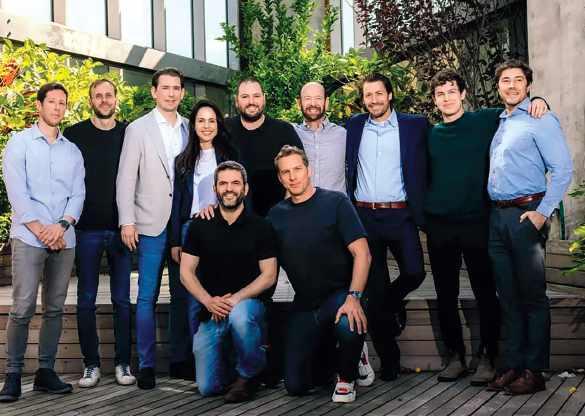
three months, but spends a lot of time travelling, particularly to the Middle East, Abu Dhabi and Tel Aviv, where he goes every month.
He remains deeply invested in the Abraham Accords, the 2020 normalisation agreements between Israel and several Arab states.
“W hat happened on October 7 and with Iran was a setback,” he says. “One of the main reasons for those attacks was to stop the progress happening with the Accords. They’ve slowed things down, but I’m optimistic there will be next steps. Gulf countries and Israel working together more closely will make the region more secure and will be an enormous boost economically.”
W hile he acknowledges the cyber threat landscape is growing darker – “state-sponsored hackers are on the rise, and they have tools that were unimaginable a decade ago” – he maintains that “a rtificial intelligence is our only real chance to keep pace with the ever-increasing number of attackers”.
He adds: “At Dream, we combine world-class intelligence and cyber expertise with the capabilities of AI. We’re giving our users something close to a superpower.”

‘At Dream, we combine world-class intelligence with the capabilities of AI ’
LEFT:
Formerly Chancellor of Austria, Sebastian Kurz is now passionate about increasing cyber security
A s defence budgets across the globe swell in response to geopolitical instability, Kurz believes cyber security will claim a larger share. “Cyber won’t be the biggest piece of defence spending but it will be an increasing part of it. October 7, the war in Ukraine – these moments have shown the world that security is not a given.”
For now, Kurz is focused on expanding Dream’s platform, strengthening its AI capabilities and helping clients and corporations stay ahead of what’s coming.
“I was always optimistic we’d build a strong company,” he says. “But things have gone much faster than I thought. Shalev is a genius. We’ve been able to hire incredible talent. It’s working.”
A nd at its core, that success rests on something that began, fittingly, with an unexpected meeting and an entrepreneurial instinct.
“Thanks for the tour,” Kurz had said. “Now let’s build something.” dreamgroup.com
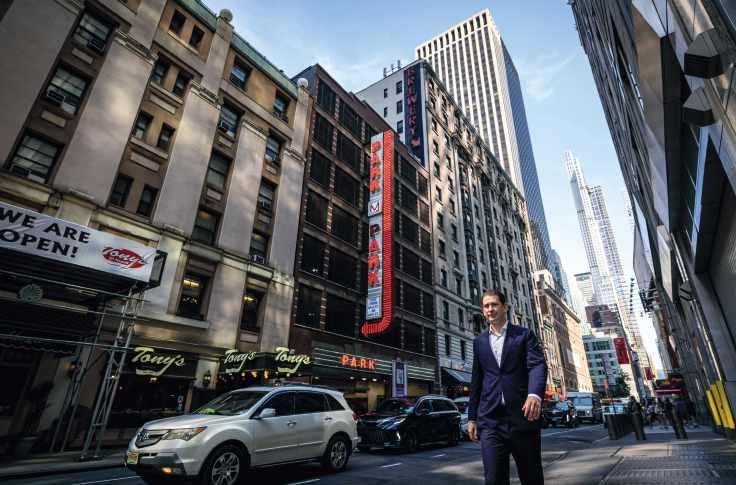




Tired of waiting for one of us to appear on TV?
How about 2,500 hours of Jewish content from across the globe?
By Carole Shaw
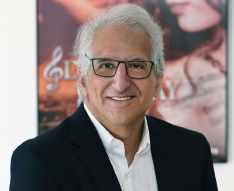
In America, Neil Friedman is the man to know if you want to see a Jewish film. Not that he’s schlepping a suitcase filled with DVDs of Max Nosseck’s Overture to Glory (Yiddish, 1940). Hardly. Neil is the founder of distribution company Menemsha Films, which, since 2020, has become the go-to for Jewishthemed cinema. You know, the films that pop up at festivals and show two tantalising episodes before disappearing. With more than 175 Jewish film festivals in the US relying on him, Neil (pictured above) knows what audiences want, but when Netflix shifted its focus to original productions, he realised journeys for independent Jewish cinema would be short. “That’s when we knew we had to take control of our own destiny,” says Neil, who previously worked at New Line Cinema, Columbia Pictures and William Morris. So, in March 2020, as the world locked
down, ChaiFlicks launched with 40 titles from Menemsha’s library. There was time to binge Wartime Girls, a Polish drama about three Jewish women coming of age during the Second World War
Neil and his team had a clear business plan and a mission: to create the world’s first subscription streaming service entirely dedicated to Jewish culture, storytelling, and identity from across the globe. What Neil calls “one-stop shopping” for global Jewish storytelling
Now, ChaiFlicks hosts more than 2,500 hours of Jewish content: features, series, docs, shorts, food shows, concerts and lectures
This matters to UK Jewry, where the challish for representation was sated by EastEnders’ Dr Legg or Ridley Road – both deeply appreciated, but not exactly a library. Hard as it is to believe, while we had Friday Night Dinner without chopped liver – “Shalom Jackie” – other countries have feasted. Luckily ChaiFlicks curates the ones we’ve missed. Argentina’s award-winning comedy series Family Therapy, about divorcing psychotherapists who also work together is one and, from America, Mickey Rapkin’s The Anne Frank Gift Shop is another. Shortlisted for Best Live Action Short at 2024’s Academy Awards the film imagines a meeting between two Anne Frank House reps and the New York design firm hired to help them renovate the gift shop.
It’s required viewing –and just one of many titles from Hungary, India, Ethiopia, Israel and far beyond. “Jews are wanderers and every region has a different story with too many sidelined,” says Neil, citing Sephardi, Mizrahi and


LGBTQ+ voices. ChaiFlicks is curating what’s been overlooked – like its first unscripted original, Schmoozing & Cruising: Tripping on Kosher Americana , in which CW, a self-professed “kind-ofkepping Jew” from the Midwest, explores the surprising diversity of kosher food across the US.
A nd ChaiFlicks isn’t doing it alone. Its partnership with the YIVO Institute for Jewish Research now brings subscribers access to one of the world’s richest collections of East European Jewish culture. Fancy some Yiddish theatre? A klezmer dance tutorial? They’re there alongside and exclusively with season 3 of The New Black (Shababnikim), the Israeli comedy about yeshiva students navigating faith, rebellion and swagger with a side of heresy. “ChaiFlicks is more than the Jewish Netflix,” says “We care about the content because it’s our culture.”

, two help and (Shababnikim and side the Neil culture.”
isit chaiflicks.com?code =2life to sign up with JN promotional code 2LIFE
CLOCKWISE FROM TOP: Wartime Girls, Schmoozing & Cruising: Tripping on Kosher Americana, Family Therapy and The Anne Frank Gift Shop




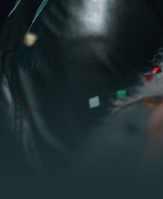





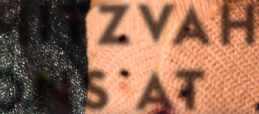










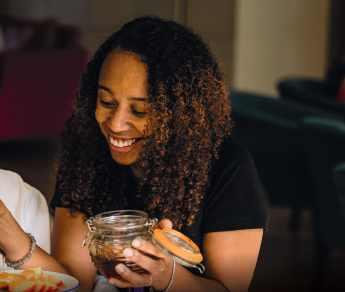



The spirit driving Israel’s property market. By Maayan Harkham


Israel’s real estate market defies conventional logic. Interest rates remain high, yields modest and bureaucracy daunting. Add to this the uncertainty of war and most markets would falter. Yet Israel’s property sector continues to climb.
The reason is twofold: first, relentless demand in a country with limited land and a growing population; second, the deep emotional pull of ownership in Israel, which makes the market less vulnerable to financial mood swings than elsewhere.
For investors, this creates a rare blend: stability driven not only by economics but by history and identity. In Israel, property retains value because it represents more than square meters – it represents belonging. To own land in Israel is to hold a piece of history – tangible proof of continuity, connection and faith in the future. That is why, even in the shadow of war and bureaucracy, demand only rises. From Mediterranean beaches to Jerusalem’s ancient alleyways, from lush hills to desert vistas, Israel offers unmatched diversity of settings and lifestyles. Some buyers dream of seaside penthouses, others of leafy suburban homes, others still of chic city apartments. For all, planting roots there outweighs practical challenges. Even in times of conflict, the country’s appeal grows, supported by the resilience of the shekel, the strength of the Tel Aviv Stock Exchange and the confidence of global investors.
R ising high above Jerusalem’s enchanting Ein Kerem district is Ein Kerem Gateway by Israel Canada Reem (ICR). Just minutes from the light rail and major routes, residents are perfectly placed between picturesque Ein Kerem and lively Kiryat HaYovel, with sprawling parks, cultural hubs, and leading educational institutions all within reach.
The project’s public areas, designed by renowned architect Dana Oberson, who was inspired by the surrounding landscape are striking with uninterrupted views of Jerusalem’s rolling hills. Shared lounges, outdoor spaces, and landscaped gardens invite community gatherings and quiet reflection alike. Every detail has been considered to foster comfort, connec-


tion, and a truly exceptional lifestyle. For those seeking a peaceful home with contemporary style – just 10 minutes from the city centre – Pastoral Ein Kerem Gateway is an address that simply has it all.
Foreign entrepreneurs have also shaped the landscape, launching luxury projects that transform Israel’s cities. Tel Aviv’s seafront now boasts the Kempinski Hotel and David Promenade Residences, exclusively marketed by Holland Real Estate and Neot Shiran. Despite near sell-out, select resale properties do remain. According to Holland Real Estate’s general manager Dudy Jacobs, foreign demand is surging, with buyers seeking both residences and pied-à-terre investments. Jacobs recently closed two high-profile transactions: a 232sqm seafront apartment with a 44sqm terrace for approximately £9.5 million in a project still five to six years from completion, and a 170sqm Rothschild Boulevard apartment with a 25sqm terrace for around £6.5m. “These exceptional prices reflect limited supply of prime properties and superior development quality,” says Jacobs. For British investors, Tel Aviv represents a unique chance to secure Mediterranean real estate in the region’s most dynamic city.
Given Israel’s compact size, city centres expand into adjacent neighbourhoods. A prime example is Acro Real Estate’s landmark Basel Tower project in Tel Aviv. Widely regarded as one of Israel’s most respected developers, Acro redefines luxury living, combining modern architecture with refined interiors and offering overseas buyers the reassurance of a firm known for accompanying clients from first meeting to key handover.
For those drawn to Tel Aviv’s mix of urban energy and beach culture, Yuvalim-Cityboy’s Milan Project delivers lifestyle-oriented design, complete with yoga and Pilates studios, a residents’ laundry lounge and even surfboard storage. It’s a perfect fit for the city’s rhythm and a strategic investment in
one of the world’s most dynamic urban markets.
Prestigious properties appear so frequently it’s easy to miss the new ones, but not The Riverside project in Gadot, a community beside Savyon, just 20 minutes from central Tel Aviv. It is developed by Electra Residences – a subsidiary of Electra Group, which has the pedigree as it started in 1945, and now operates in 15 countries – and it prizes upcoming Riverside as a perfect example of elegant architecture on verdant parkland with 24-hour security, private swimming pools and access to the new light railway. There are three- to six-room apartments, garden apartments and penthouses available with just 20 percent down and the balance on completion.
Israel’s market is also being shaped by development companies with multiple ventures across the country – firms whose breadth of projects provides insight into the scale and diversity of opportunities available today.
IsraMish Investments Ltd offers several upscale projects across Israel’s central region: a 265sqm penthouse in Ramat Efal with 244sqm terraces and ample space to add a private pool; two to three-room apartments and a rooftop pool penthouse at 13 Bezalel Street in Tel Aviv; and two units, including a pent-




house with sweeping views, at 18 HaDganim Street, Giv’atayim.
The Netanel Group – recent recipient of the Contractors Association’s Excellence and Quality in Construction Award – manages every stage of development in-house, from initiation to completion and warranty. Specialising in construction and customer service, the group has expanded into large-scale urban renewal, with more than 10,000 flats planned in cities including Tel Aviv, Giv’atayim, Ramat Gan, Bat Yam and Holon. Notable projects include 7-9 Struck Street, 21 Zeitlin Street, 49 Weizmann Street, and 22 King David Boulevard in Tel Aviv.
Kardan Real Estate’s flagship Jerusalem project, Holyland, is a luxury complex near the Gazelle Valley. With modern architecture, green spaces and a 31-storey tower, it offers flats ranging from three to six rooms, garden units, mini-penthouses and penthouses, with amenities such as a grand lobby, gym, parking and storage. Other Kardan projects include Park HaYam in Bat Yam, Uziel in Ramat Gan, and ALIVE in Netanya – blending residential, commercial and lifestyle elements.
Wherever the location, opportunities abound. National infrastructure upgrades – such as the long-awaited Tel Aviv Metro – will only increase desirability, making well-located properties even more sought after. For investors, the equation is clear: today’s purchase is tomorrow’s capital gain.
“Israel stands on the threshold of what may become its most prosperous period,” says Elhanan Lazerovitch, founder and CEO of ELG Real Estate Investments. “We are witnessing more and more young couples who see in land acquisition not only the chance to secure a tangible asset before its value rises, but also the ability to take part in shaping the country’s landscape and strengthening the bond between British Jews and their homeland. This is an investment in value, in heritage and in the generations to come – a bridge between economic foresight and the timeless vision of flourishing in our ancestral home”.
Maayan Harkham is the founder and CEO of Wellspring Israel Property Management











Located between Kikar HaMedina and Dizengoff Square, Bezalel 13 is a boutique 7-story building by Isramich, offering secure value in one of Tel Aviv’s strongest real estate markets.
Selection of 2- & 3-room apartments.
Penthouse with 155 sqm interior + 30 sqm terrace + 55 sqm rooftop & private 14 sqm pool.
Parking included.
Attractive payment terms: 20% on signing, 80% on delivery.
Perfect for investors seeking strong demand, high rental potential, and long-term capital growth in Tel Aviv’s most desirable location.

Feel the Country in the City
Experience the pinnacle of urban luxury in Ramat Effal. This magnificent 265 sqm penthouse boasts an expansive 244 sqm sun terrace, offering sweeping green views and the rare sensation of countryside living — all within minutes of Tel Aviv.
3 private parking spots
Spacious storage room
Prestigious Ramat Effal,neighborhood near Tel Hashomer Hospital
A one-of-a-kind residence that blends space, light, and serenity in the heart of the city.
Both projects offer unique luxury lifestyles with top-notch specifications and prime locations.
2 Ben Gurion Street, Ramat Gan, BSR Towers 1, 11th Floor Isramish Company



At






Shaare Zedek UK today. NOW








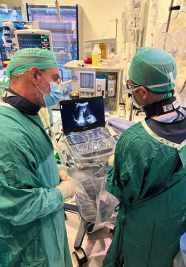
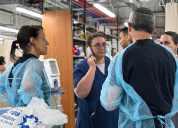

David Meller CBE, Chair | Cara Case, Chief Executive is for 020 8201 8933 shaarezedek.org.uk


Tel Aviv University (TAU) is a pillar of Israel, responsible for groundbreaking research in medicine, the environment, AI, quantum and other fields as well as for training the inventors and professionals of tomorrow.

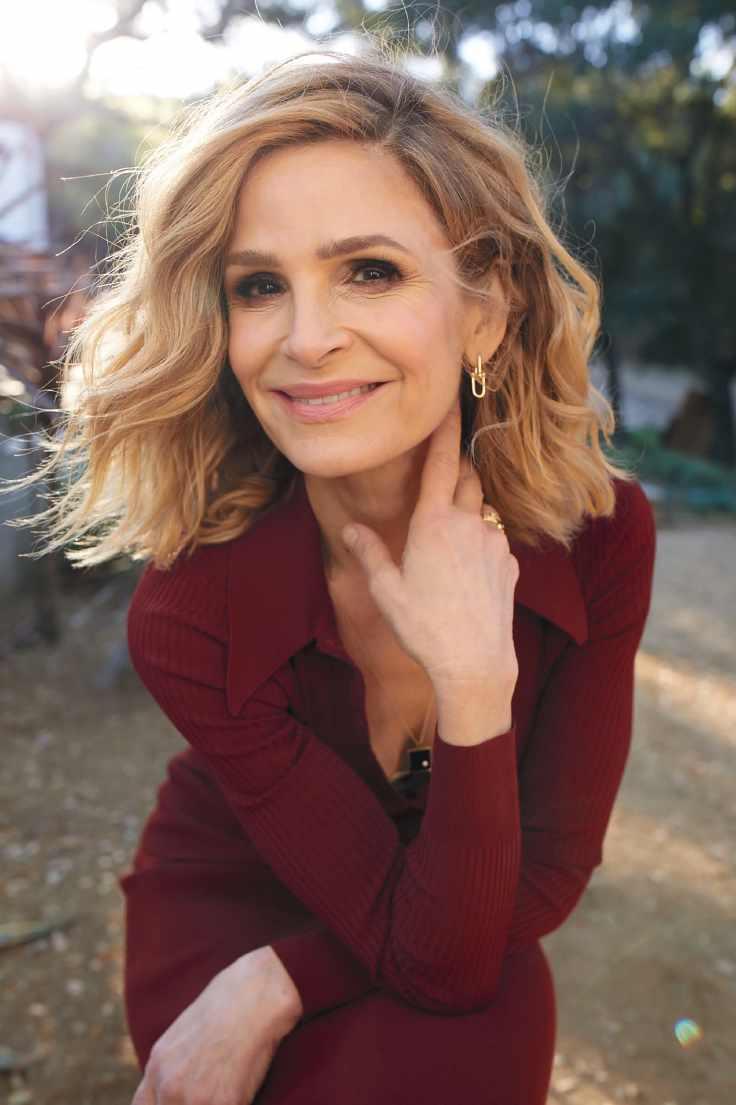
By Brigit Grant
In a time when finding a Jewish film at the cinema is like spotting a kneidel in gazpacho, Bad Shabbos has done the near-impossible –become a breakout indie hit. With just a selective cinema release in America, this heartfelt Shabbat comedy has already made more than $1million at the box office – and not because of a Marvel-sized marketing budget, but through word of mouth. For a Jewish comedy right now, it’s a multiplex miracle.
“We wanted to make a film that was funny but also grounded in authenticity,” says producer Adam Mitchell. He and writer-director Daniel Robbins, drew from their own story to create what they describe as “Jewish Meet the Parents with a dash of Knives Out.”
“I grew up going to Jewish day school and wanted to show our traditions in a positive light while adding a comedic twist,” echoes Collins. “Whether it’s a ‘positive light’ will be revealed when the film premieres at the UK Jewish Film Festival in November. But for those who have longed for the American heimishe humour of Duddy Kravitz and Goodbye Columbus, it’s a blessing.
The Bad Shabbos of the title takes place in an Upper West Side apartment – filmed in an actual 16th-floor flat on 81st Street – where a Jewish couple are anxiously preparing a Shabbat meal for their soon-to-be mishpachah, who are devout Catholics. That their son, David (Jon Bass), is marrying out soon becomes the least of their problems after an unexpected death occurs and a frantic cover-up ensues.
At the core of all this madness is Kyra Sedgwick. It’s a nice touch as the Emmy/Golden Globe–winning actor, best known for solving crimes in the hit series The Closer, is now presiding over one and cooking brisket as Ellen, the formidable matriarch.
And here’s the ticker tape moment: Kyra is Jewish. What? A Jewish mother played by a Jewish mother?
“That felt important to me,” Kyra tells Life. “I am a Jewish mother, and I grew up with a Jewish mother. I love Jewish mothers. They always want to make sure you’ve eaten.”
With so much lived experience, playing Ellen was a breeze, but woe betide anyone who dares to drop “domineering” within earshot of this Jewish mum. “I really take umbrage at the word ‘overbearing,’” she says. “Who else is going to get in the ring with you and fight the tiger, other than your mom?”
Ellen is a great character, switching from acerbic wit to familiar warmth – an evolution Kyra enjoyed. “We see her grow and change in one night,” she says. “Her biases get challenged and, ultimately, she softens. And it’s such a great message to put out, especially when we’re so divided. We don’t want to
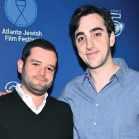
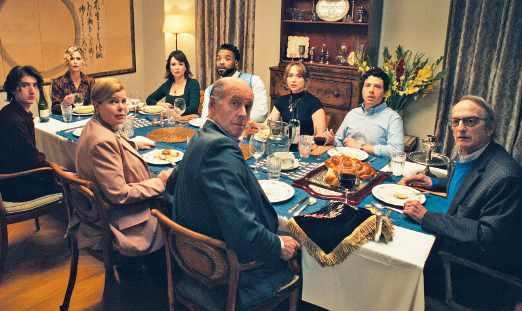
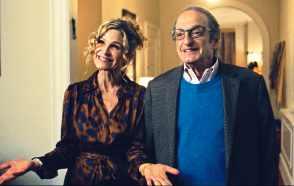
be more intolerant. We want to heal us.”
Kyra was raised with one Jewish and one Episcopalian parent, but her Jewish identity was never in doubt. “We always had Passover. I’ve always been connected to that side of me.”
Reciting the Shabbat blessings in the film was something Kyra hadn’t done since 1992, when she starred in the film Miss Rose White, an adaptation of Barbara Lebow’s play A Shayna Maidel .
“I had to relearn everything as I barely remembered it,” she says, “What surprised me most was how moved I felt. Whenever I go to a Shabbos dinner, I think, ‘This is so great.’ Putting down your phone and making time for family and gratitude a priority… what’s not to love?”
T hat ‘Jewish’ connection deepened as she raised her children with husband Kevin Bacon. “I kvell constantly,” laughs Mrs Bacon (as she’s also been known since 1988). “Honestly, kvell is my favourite word. It’s an overwhelming feeling of joy. I have it all the time.”
T his is borne out by the viral dance videos of Mr and Mrs Bacon, who, after 37 years of marriage, still have the mojo of newlyweds, with their relationship held up as one of Hollywood’s most enduring and enviable partnerships.
A nd the Bacons will soon appear together in Family Movie, a horror-comedy about a film-making family trying to hide a real murder on set. The couple directed jointly for the first time and their children – musician son Travis and actress daughter Sosie – are also in the film.
‘ I'm a Jewish mother and grew up with a Jewish mother ’

A nother film, The Best You Can, will hopefully land here soon, as the romantic dramedy –another Kyra and Kevin pairing – got great reviews when it premiered at the Tribeca Film Festival in June.
But there’s no waiting for Bad Shabbos , which was snapped up by UK Jewish Film Festival, and Kyra is keenly aware of how important Jewish films are currently – particularly a comedy.
“Jewish people need to laugh right now more than anything, and Bad Shabbos delivers that. It’s also about love, about growth and about not letting the brisket dry out while you’re arguing.”
For anyone who ever feared bringing someone home to meet the family on a Friday night, keep checking ukjff.org for the November schedule.
BOTTOM:
and

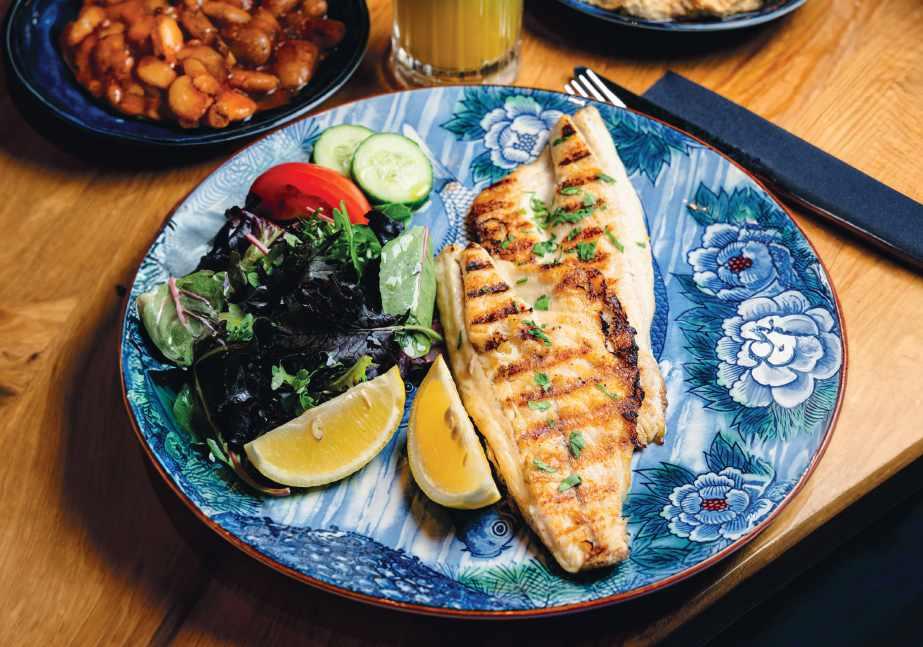

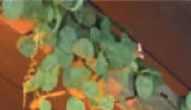

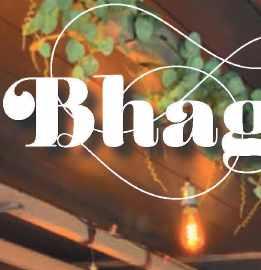





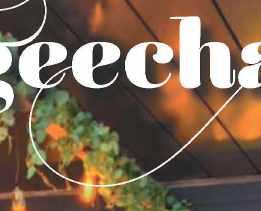




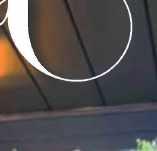



















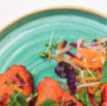
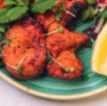













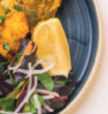
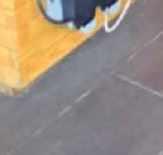








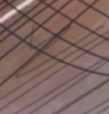















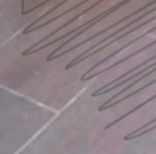








LUXURY REAL ESTATE agency
G.R.E offers impeccable service, international orientation and deep-rooted experience in high-end property markets in Israel. Founded in July 2024 by Daniel Goldstein – a seasoned professional in Israeli real estate – G.R.E (Goldstein Real Estate) has quickly established itself across premium locales, including Tel Aviv, Herzliya, Netanya, Ra’anana, Caesarea and Jerusalem.
GLOBAL ROOTS, LOCAL EXPERTISE
What truly sets G.R.E apart is its Anglo-centric background. Founded by agents with significant experience in London’s real estate market, the team brings international finesse combined with local insight, making them adept at serving clients from the UK.
FULL-SPECTRUM SERVICES
Buying and selling: Personalised guidance from property search to
deal closure, ensuring clients feel confident at every stage. New developments: Exclusive access to elite new-build projects through collaborations with reputable Israeli developers. Rentals, landlord services and management: From rentals to hands-on property management, G.R.E supports both tenants and property owners.
UNIQUE OFFERINGS FOR INTERNATIONAL BUYERS
A-to-Z assistance, including legal, financial and logistical support. G.R.E has expertise in organising group property purchases, delivering substantial savings and increased negotiating power.
EXPERIENCED AND PERSONABLE LEADERSHIP
Founder Daniel Goldstein has more than a decade of experience in both international and Israeli real estate markets. The G.R.E team are experts at bridging

markets and offering elite-level service to clients. Whether you’re seeking to buy, sell, rent, invest or manage high-value property, G.R.E represents the gold standard in Israel’s luxury real estate scene. gre-israel.com

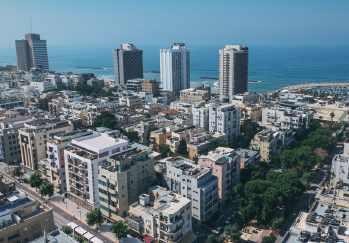











Securing Israel’s Future Through Science and Innovation
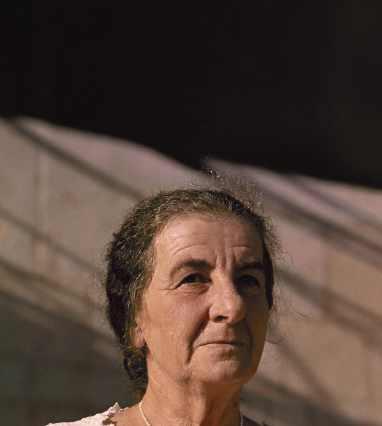
“The Technion has helped visualize, plan, and implement Israel’s growth. It has aided in transforming a tiny country into a great center of science and research, sharing its advances with others.”
Please support the Technion, secure Israel’s future and help shape the world.
If you are writing or changing your will, we can arrange a suitable legal advisor for you.
Contact the CEO Alan Aziz in strict confidence: CEO@technionuk.org | 020 7495 6824
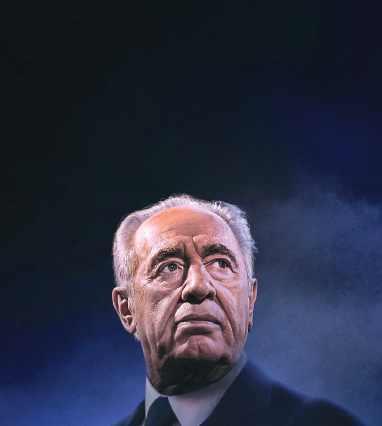
“It is fortunate that the Technion was built before the State of Israel. Had it been the other way around, who knows what would have happened. The Technion built the State of Israel and deserves the credit for this.”
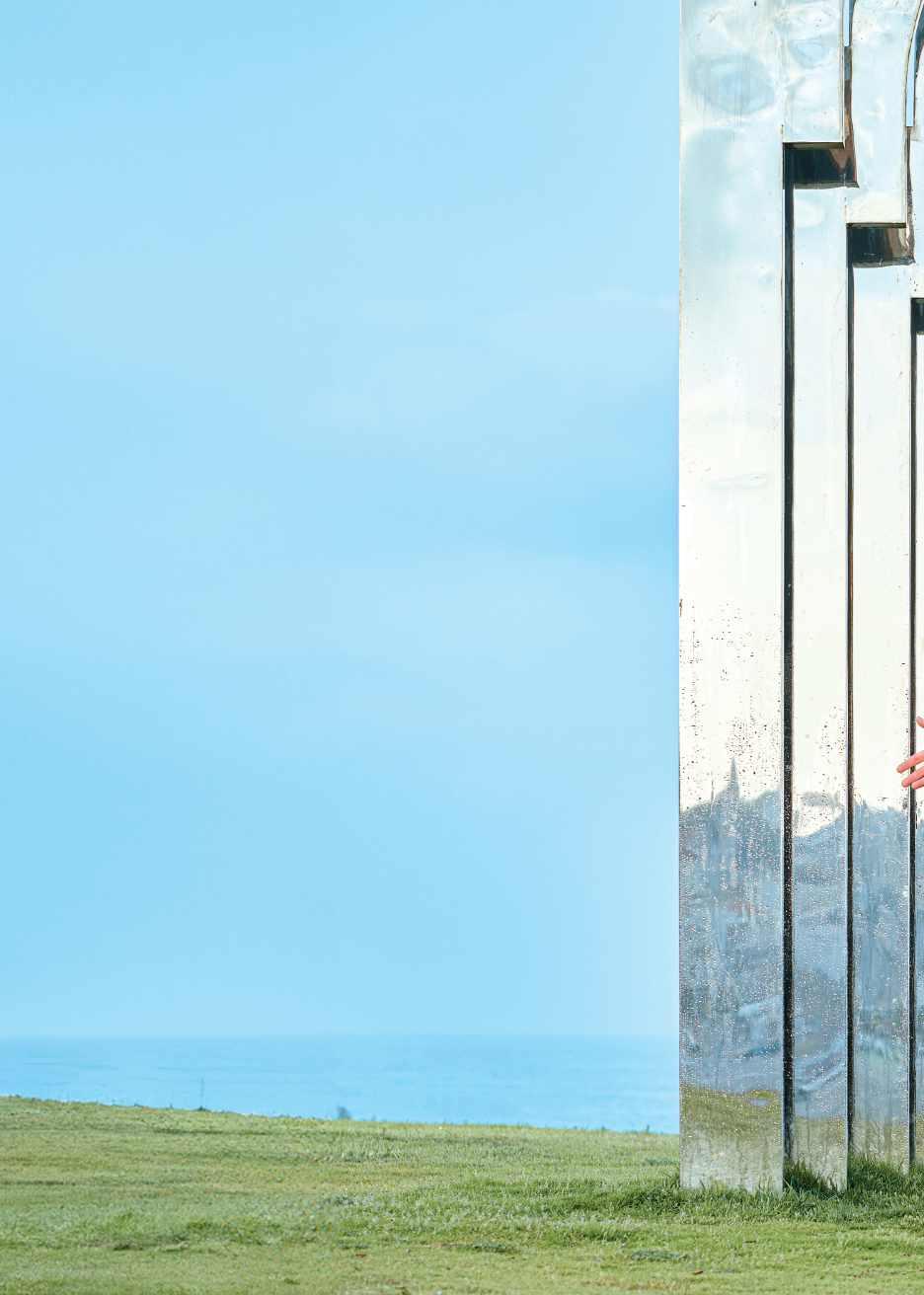
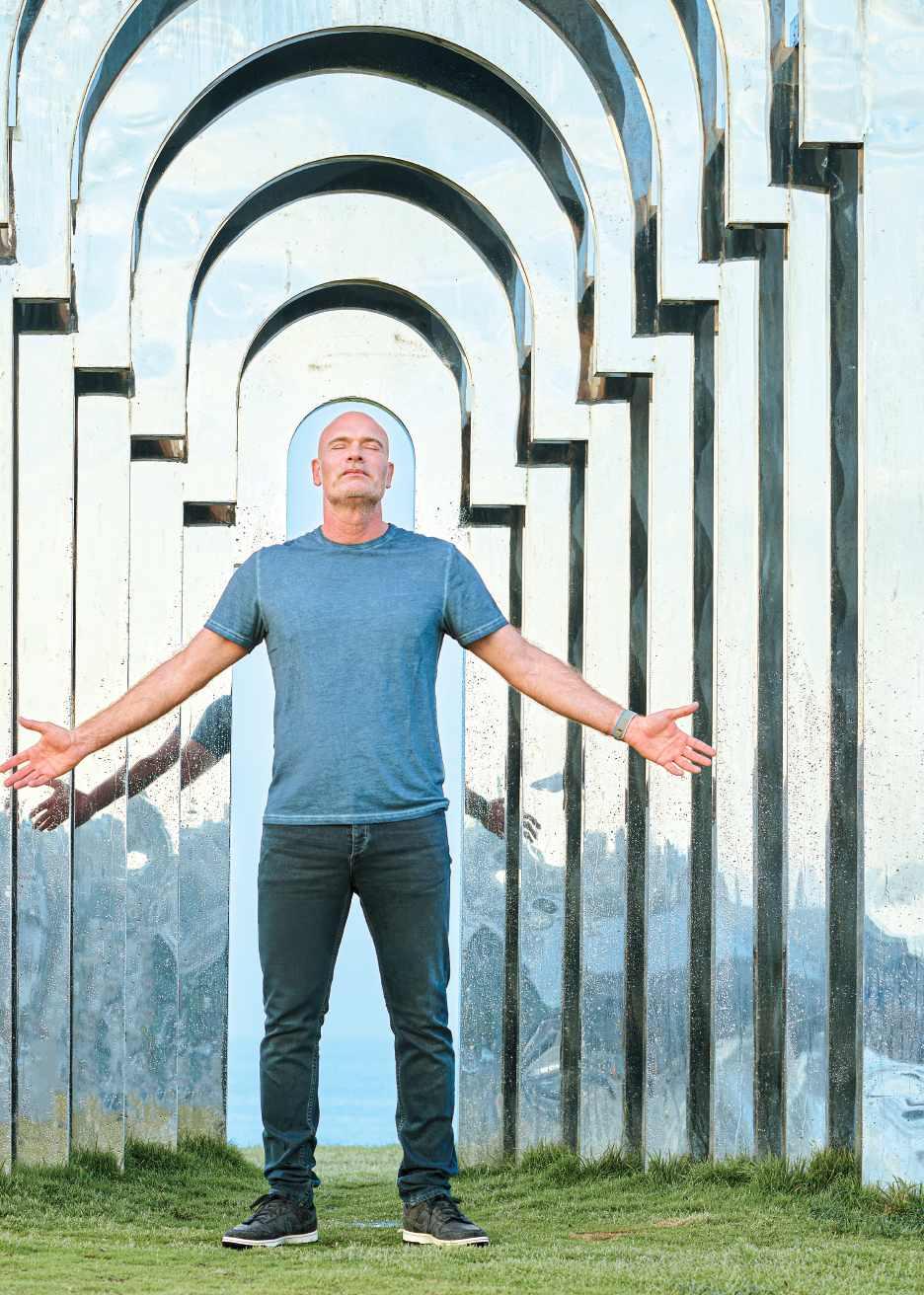
Banksy’s name alone is enough to divide a room. His artwork has long drawn fire from the Jewish community: whether it was the image of the Israeli soldier and masked Palestinian in a pillow fight, feathers erupting as a metaphor for conflict, or T he Walled Off Hotel in the West Bank against the Israeli separation barrier.
Simon Durban was there for all of it. As Banksy’s business manager – the man who handled the money, the projects and the problems. He was there at the boutique inn – “with the worst view in the world” – smoothing logistics before Banksy swept in to wow the world’s press with his chutzpah Simon Durban was Banksy’s gatekeeper. And, unbelievably, he is Jewish.
“Did he know?” I ask.
“I don’t recall at what point it was spoken about,” he replies carefully, “but it was known at some point.” Clearly.
It’s a sunny day in a garden centre, too quaint a setting to be talking about the artist whose identity Durban spent years protecting. The world still obsesses over who he really is. “We always met as privately as possible,” says the handsome man with blue eyes as intense as the topic. “He was tough to work for. But I learnt how to handle creative people who didn’t want to think about the numbers.”
Banksy’s art has often sparked division, but he is barely a bit-player now, amid the constant
headlines. Days before our meeting, Israel was being bombed by Iran and most look weary, but not Simon. He is full of energy, determination and even relief, because he made a decision. “My ‘Welcome to Israel’ flight was in July,” he says simply. “I’m making aliyah .”
T he irony is striking. After a decade managing the contentious artist, Simon will soon be living in Tel Aviv with girlfriend, Galit. “It seems it was always meant to be,” he says. Israel has been a thread running through his life.
“The first time I climbed a watchtower in Israel, it was 1989. I was 19 and on a gap year on Kibbutz Magen near the Gaza border. You could hear gunfire in the background. That story has been never-ending. Even back then, there was this sense of something unresolved.”

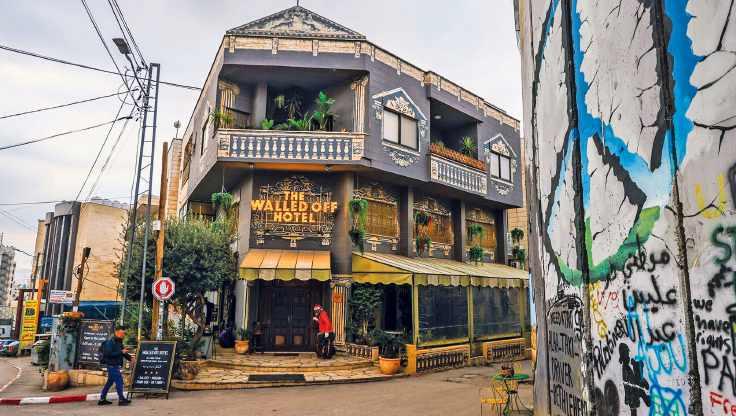
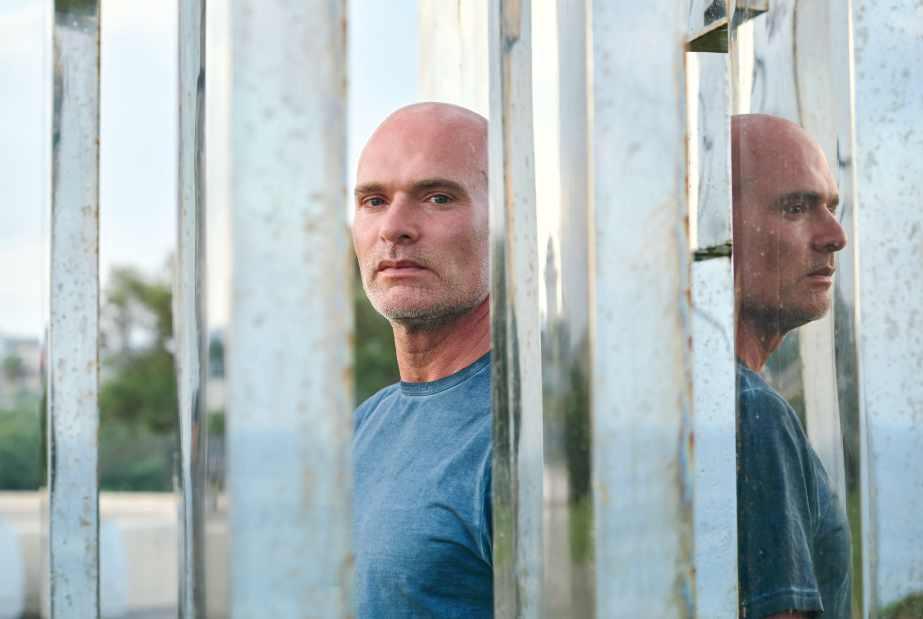
It was a watchtower in Gaza painted by Banksy that would later drive a wedge between the two men, but we park that tale of rupture to focus on the manager.
Because before art there was accountancy.
Simon studied at Middlesex University while working in the fashion shop Chevy in Golders Green. “It paid for uni, but I wish now I’d lived away from home, seen the world a bit before working. Sometimes I think those years might have shaped me differently.”
A fter graduating, he joined a Jewish firm of accountants. “Cohen Arnold,” he laughs. “Did two years there, but couldn’t pass the professional exams. Tried twice, got fed up with it.” But he got an early foundation in numbers and responsibility before a chance meeting with a pensions adviser led him to the music industry, running accounts for an indie label in Ladbroke Grove. “That’s where I learned everything,” he says. “I was in a different world – d ifferent people and I loved it. The music, the chaos, the deals.”
L ater, he joined Defected Records and then Wall of Sound’s Mark Jones – a move that changed the course of his life.
Working at the label was a young, anonymous artist designing record sleeves and quietly growing a name: Banksy. “Mark introduced us because he needed help managing his affairs. He thought we’d be a good fit.”
Mark wasn’t wrong. “Banksy was completely off the radar at that point. We had to kosher him up.”
We get the joke.
W hen Wall of Sound was sold, Mark offered Simon the chance to stay. “But I could see the music industry changing. Labels were struggling, managers were harder to deal with. The writing was on the wall.”
A Banksy wall? “Well, a Google search, even in 2004, brought up 60 pages on him. People were on to him, even though there was no money yet.”
So Simon went with Banksy. Did he know about art, I wonder. “Nothing. I had no interest in it. Couldn’t honestly tell you if I’d ever been to an art gallery or museum. It didn’t matter, though. Art
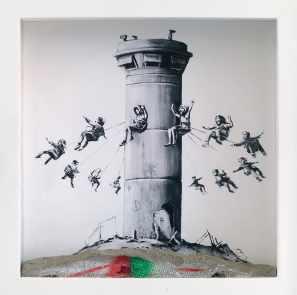

and music are kind of similar. And I knew how to work with creative, non-business-minded people.”
T heir journey together was explosive. Banksy went “stratospheric”, says his former manager, who still hearted the Holy Land. “It just manifested in different ways and, in the most extraordinary circumstances, work took me to the West Bank in 2007.
T hat was the year Banksy built Santa’s Ghetto in Bethlehem’s Manger Square. “It was an amazing experience. We took a whole group of artists with us. Nearly everyone painted on the security wall. We gave a lot of money to charity. I ended up working on a project in Nablus for underprivileged kids. But Hamas was running things. It was pretty hairy.”
Simon remembers leaving a family holiday in Tel Aviv to slip into the West Bank. I’m shocked. “Did it not feel weird? Disloyal?” His response is frank. “Honestly, I just felt like I was breaking new ground. A Jewish guy from north London trying to help in the West Bank.”
Gaza in 2014 was different. “That trip destroyed
me mentally. It was horrendous. I should never, have done it. It was a crazy decision. But Banksy never forced me. We went out painting at six in the morning; Hamas gunmen were patrolling. We were ignored, but it didn’t feel safe. My biggest fear was departure through Ben Gurion [Airport] I was absolutely terrified of getting pulled into an office and cross-examined about what we’d been up to.”
A head of T he Walled Off Hotel opening in 2017, there was a conversation. “We all thought it was a crazy idea. That it was going to cost an arm and a leg, and there could be a bomb which flattens it the day after it opens.”
But ahead it went. “And it was a difficult project. Trying to get a hotel on booking.com when you’re dealing with an anonymous artist who wants everything a certain way made it infinitely harder. But it was a fantastic hotel. For fans of Banksy, it was brilliant.”
Still, there were red lines. “Banksy told me I was the appointed Jewish expert: ‘Read all the information panels in the museum. If there’s
anything you’re unhappy with, let me know.’ Simon says: “Some people think it’s balanced.”
T he rupture came with a poster of children flying on a Gaza watchtower ride above the words Visit Palestine. The Israel Defense Forces liked it so much they didn’t leave. “He thought it was funny – maybe more insulting to Palestinians than Israelis. But I said: ‘This is not funny. You’re close to crossing a line.’ I reminded him: ‘You told me if you did anything like this, you’d run it by me first. And you didn’t. And now you’ve got a s**t storm.’”
It was start of the breaking point. “Fifteen years was enough for both of us. I’d stopped enjoying it. I was burnt out from the personalities, the b*******t, the hassle, all the drama.”
Simon had also been a Banksy collector. “I sold over half my collection when the market peaked. It was the best thing I could have done.” He kept a few – the gift ones with his name on. I ask if he regrets not holding Banksy to account more “I tried to be a strong voice within the organisation. But think what it would have been like if I wasn’t there ”
He pauses. Takes a sip of coffee. “I was part of this incredible thing, a street art movement. I wasn’t so political in those days. But back then October 7 hadn’t happened.”
Simon was on an intensive retreat (The Hoffman Process) in England on October 7 with no phones allowed. “I came out on 13th. They pulled me aside: ‘Hamas has invaded Israel.’ I couldn’t believe it. For Israelis to get slaughtered in their home was beyond my comprehension, and I knew the damage it would have.”
‘Like
Simon’s response was to re-enter the art world on his own terms. Through his platform Little 15 Art in April on Yom HaShoah in Tel Aviv he launched 07SH10AH23. The exhibition, whose title fuses the date of the attacks with the Shoah, confronts the aftermath of October 7 through the work of leading Israeli artists.
“Like so many in the diaspora, I became more Zionist after the atrocities,” he says. “In Israel there’s no antisemitism. You’re with your own people. Everyone is just living normal, happy lives. Here [in the UK], it’s not like that.”
T here are Israelis who will dispute his rosetinted view of the national trauma, but Simon is a newbie and in love with Galit, who “made the show happen” that he hopes to take to New York.
A mong the 07SH10AH23 artists was Moran Stella Yanai, who was held hostage in Gaza for 54 days. There, she imagined a tunnel with light at the end and a girl holding a balloon. The girl was her and, once she was released, Moran painted the vision she had in captivity. On meeting Simon, she told him she had been thinking of Banksy.
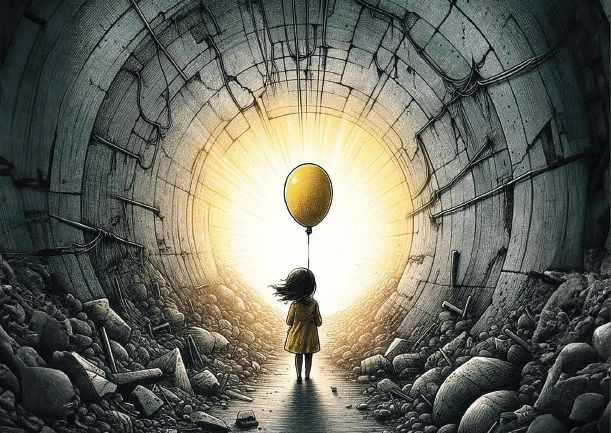




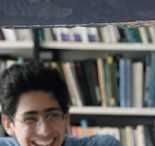





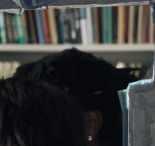


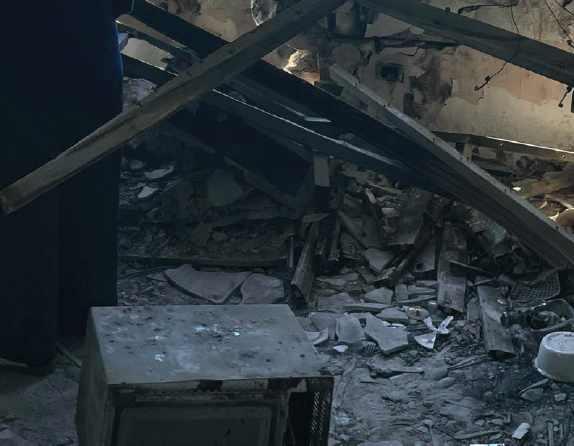
Since October 2023, UJIA has stood with the people of Israel, supporting communities in the north and south whose lives have been torn apart by war.

This Kol Nidre, we look to the future with hope and optimism. With your support, those hardest hit will have a chance not only to get back on track, but to exceed their incredible potential.
Please donate at ujia.org/kn25 or scan the QR code.

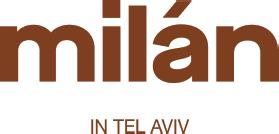


Just 300M from Gordon beach
Presale pricing & attractive payment terms
Step into a new standard of living in Tel Aviv. Strategically located between Ben Gurion Boulevard and Hilton Beach, MILAN offers 37 meticulously designed residences and a vibrant commercial floor at street level.
Pre-Sale Launch: Enjoy exclusive pricing and flexible payment terms—Seize the rare opportunity to invest smart in one of Tel Aviv's most desirable locations.

For details and appointments Scan
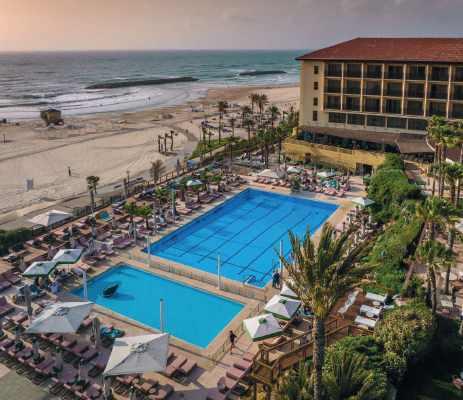


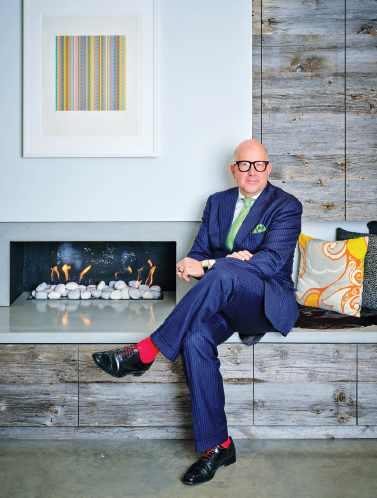
The art market may be in a lull, but influential Jewish collectors are stepping in – making now a tempting moment to start collecting. By
Candice Krieger
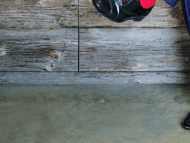
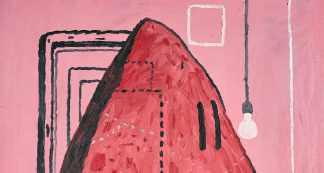

no one’s looking
The art market may appear subdued but it’s setting the stage for a bold revival. With prices down and competition thinner, the next 12 months could be a once-in-a-decade opportunity for serious collectors.
Philip Hoffman, founder of The Fine Art Group – which advises on $10–20 billion (£7-14bn) in art annually and has managed $2–3bn in transactions – calls it bluntly: “We’re as close to the bottom of the market as we’ll get. This is the moment.”

A fter intense growth, the global art market is experiencing a slowdown – shaped by a complex geopolitical landscape, persistently high interest rates and a post-pandemic correction in asset prices. Key buyers from Russia, China and parts of Asia have stepped back. “Cheap capital and surging demand pushed prices too high,” explains Hoffman. “Money was too easy to borrow at 0 percent, and it was ploughed into art. Now we’re seeing a 20-25 percent drop in top-tier prices. That’s healthy – it clears the field for strategic buyers.”
W hile average works have dropped by 20–50 percent, museum-quality pieces continue to achieve strong results. A recent Canaletto, Hoffman points out, fetched $31.9m – proof that quality continues to command premium prices, even in a cautious market. “If I were stock-picking right now,” he says, “I’d be heavily investing in the blue-chip areas of the art market.” He cites Warhol, Picasso, Peter when

Doig, Ed Ruscha – and David Hockney. “Hockney is undervalued relative to his stature,” says Hoffman. “He’s one of Britain’s greatest living artists, and yet prices for key works are still well off their peak.” This is hard to compute, considering Hockney’s Portrait of an Artist (Pool with Two Figures) sold for $90m in 2018.
To help collectors navigate this shifting terrain, Hoffman has joined forces with a select group of art-world veterans to launch New Art Perspectives –a discreet advisory platform designed for ultra-highnet-worth individuals. The team includes Patti Wong (former chairman of Sotheby’s Asia), Ed Dolman (ex-CEO of Christie’s and Phillips), his son Alex Dolman of Dolman Partners and Brett Gorvy (formerly co-head of contemporary art at Christie’s, now principal of Lévy Gorvy & Dayan).
The initiative focuses on sourcing rare, investmentgrade works while avoiding the public exposure and high fees of traditional auctions.“2025 to 2026 will be the sweet spot – before interest rates fall and the market swings back up,” says Hoffman.
Works priced between $150,000 and $1m are seeing good volume and auction activity. But the mid-tier segment ($10–50m) is relatively illiquid. At the very top end, works over $50m attract consistent buying from billionaires and cultural institutions.
“There’s no denying Sotheby’s and Christie’s are probably down 40 percent in volume since their height three or four years ago,” he says. “But demand hasn’t disappeared –it’s become more selective.”
The buyer landscape is evolving too. Russian and Chinese collectors, once responsible for up to 15 percent of top-end purchases, are now largely absent. In their place are newly-wealthy families from the US, Middle East and Asia, particularly those emerging from tech, private equity and hedge funds. “They’re often bypassing Old Masters and Impressionists in favour of contemporary works “They’ve built wealth through innovation and they want their collections to reflect that, ” says Hoffman. Hoffman himself didn’t plan to enter the art world.
‘Some of the biggest and best-known Jewish families continue to buy art’
After graduating from York University with an economics degree, he trained as a chartered accountant with KPMG. He joined Christie’s as finance director and, aged just 29, became a board member – staying at the auction house for 13 years before launching The Fine Art Fund in 2001.
Now rebranded as The Fine Art Group, the firm offers art investment, advisory, finance, sales agency and philanthropic services worldwide. Its 80-person team represents more than 350 family offices in 28 countries, including celebrities and some of the world’s wealthiest families. Clients typically receive returns of between five and 15 percent per annum In recent years, the Group has expanded into luxury watches, fine jewellery, cars, wine and rare collectibles. One third of the team are former Sotheby’s and Christie’s staff, and the group has launched partnerships such as Patti Wong & Associates in Asia and a collaboration with New York-based advisor Allan Schwartzman.
A mong today’s most engaged collectors, Hoffman highlights Jewish and Israeli business families.
“Some of the biggest and best-known Jewish families continue to buy – and are among the largest art owners in the world,” he says. “Despite the conflict, Israeli collectors remain highly active.”
T he Israeli-based Ofer family, for instance, are internationally recognised collectors and philanthropists. Eyal Ofer is a major supporter of institutions such as MoMA, Tate Modern and the Tel Aviv Museum of Art, while Batia and Idan Ofer focus on post-war and contemporary art and youth access to culture.
TOP:
Honk by Ed Ruscha BELOW: Idan and Batia Ofer
“I’ve seen this before – early ’90s crash, the Lehman collapse, the pandemic. This moment is no different, ” says Hoffman. “The correction is part of the cycle – and for those who understand timing, it’s a moment of real opportunity.”
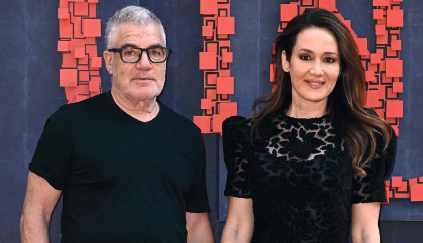














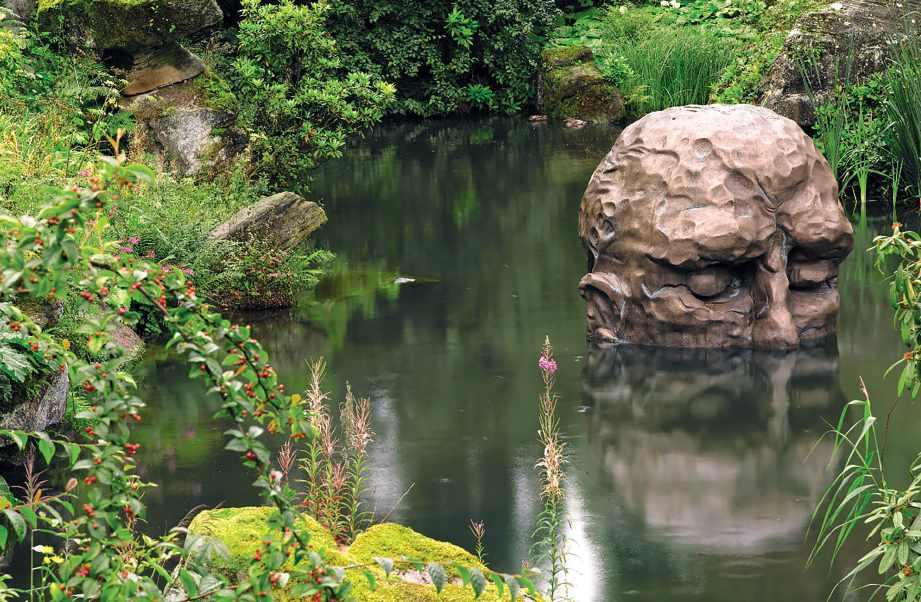
Rosenberg
Step through the door of David Breuer-Weil’s home and you’re no longer in ordinary London. You’re inside a living, breathing artwork. The space – his space – hums with energy. Books are stacked beside bronze maquettes; tiny golden sketches sit beside vast, surreal canvases. Even the lounge table is an altar to creativity, cluttered with chocolates and curiosities.
Welcome to the world of one of Britain’s most fascinating contemporary artists, where ancient Jewish history, modern-day London, monumental sculpture and imagined universes exist side by side.
A prolific creator in bronze, clay and paint, David channels the spirit and history of his Jewish ancestors with an urgent need to share them with the world. Born in London in 1965, he studied at Central Saint Martins School of Art under Henry Moore’s assistant Shelley Fausset and then at Clare College, Cambridge. David is famed for his monumental solo shows of vast painted interrelated canvases referred to as the Projects, that were held at various venues, including The Roundhouse, OXO Tower and The Vaults in Waterloo. Alongside the Projects, David continues to produce paintings, sculpture and smaller-scale works on paper.
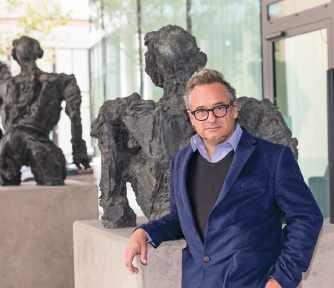
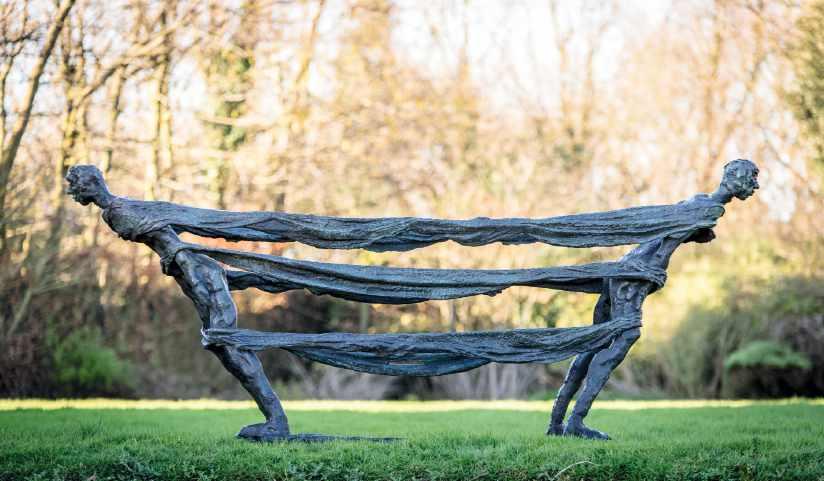
Iconic, powerful, giant works such as Brothers and Alien have been installed in major public spaces such as Hampstead Heath, Hanover Square, Grosvenor Gardens, Marble Arch and around the world.
Following a visit to Venice, he’s currently at home with wife Samantha, the calm and welcoming centre of his whirlwind of frenetic output. He promises to show me his studio and current works in the garden. For the “really enormous things”, which are often commissioned, he goes to the foundry.
Inside David’s mind is the Kingdom of Nerac – an imagined artistic salon of fictional creators, brought to life in a 2015 film shown at London’s ICA and New York’s Lincoln Center.
Responsible for inspiring “lots of little work”, he describes his muses as “a great prompt to creativity, because what I’m always trying to do is come up with ideas.”
Within his “empire of fictional artists”, each one produces numerous small-scale works. “There’s a lot of hidden works I’ve done that no one knows about,” he adds.
David gestures to sit down by the large, square glass table, full of tiny, intricate pieces bravely laying alongside hefty art books, and the ubiquitous Jewish home offering of Bendicks chocolates.
The books contain a range of inspiring images – oil lamps from the Hasmonean, Herodian, Roman and Byzantine periods; an Egyptian Ushabti (1300 BCE); and an 18th-century Italian menorah. David calls them his own “cabinets of curiosities”.
Pointing to the pristine white chairs,
ABOVE: Brothers II by David Breuer-Weil BELOW: Soul RIGHT: Reflection Soho
each draped with (hopefully dry) gold-painted A4 figurative works, he introduces his new series, Sisters
“The concept of having a sibling is a very strong theme for me. Some of my best-known sculptures are called Brothers
“There are two on display in Portman Square – two brothers sharing one mind – based on a dream. “My brother and I used to have the same recurring dream. Exactly the same. We’re not twins, but it felt like that.”
He is drawn to the spiritual power of blessings – especially Shabbat ones and those shared between fathers and sons in synagogue.
“Somebody blessing another; that’s a very, very powerful image, which hasn’t been explored much in art. “A lot of contemporary art has been drained of meaning,” he says.
“I’m very interested in bringing a certain meaning –something very human – back into art.”
For David, “art is therapy”, he says, adding: “It is a daily compulsion.”
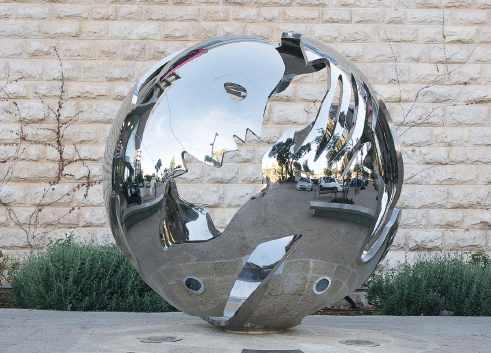
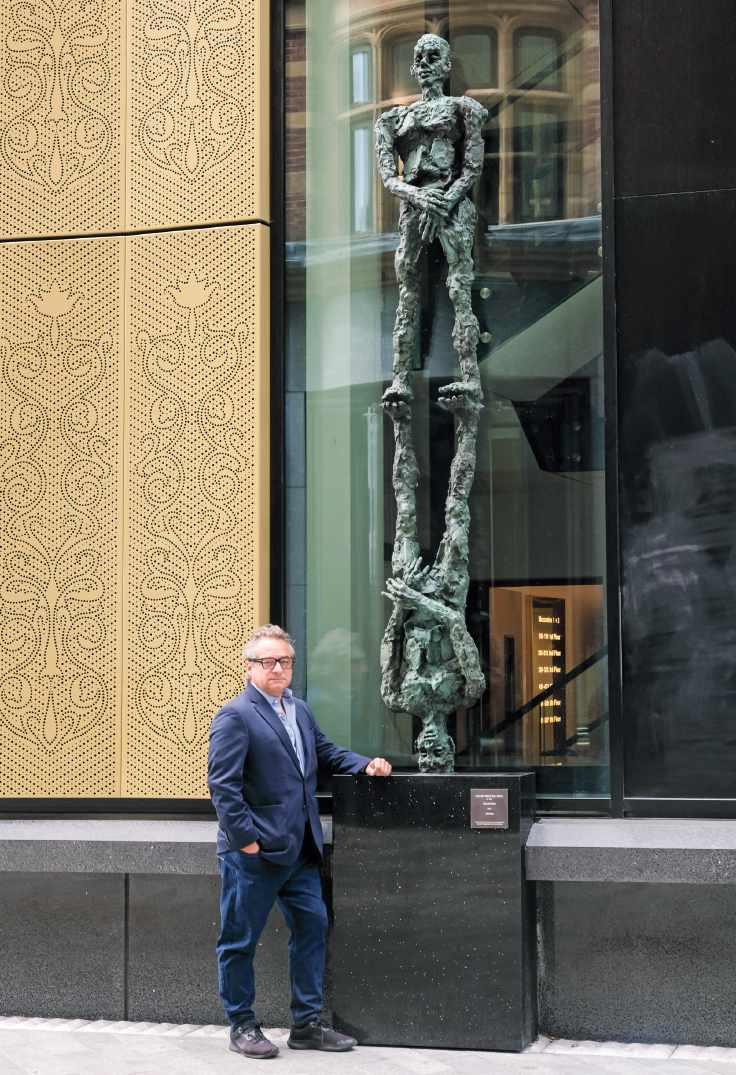
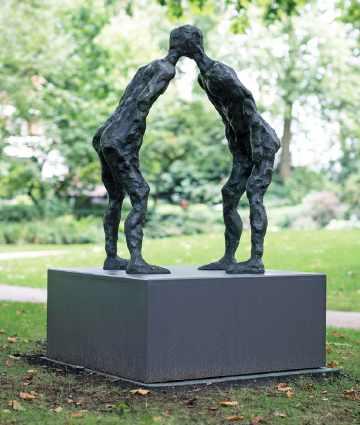
‘Art is therapy. It is a daily compulsion ’
He has kept a daily journal for years, “where I write down what I’m doing, why I’m doing it, and what it’s all about. I find that quite helpful”. Inspired by Van Gogh’s letters to his brother, he also writes ideas and thoughts.
His heritage, trauma, the Holocaust, and the influence of his Austrian refugee father and “what it feels like to be born into the legacy of a second generation” are fundamental to his entire being, as a man and an artist.
Opening a book of his own artwork, he points out “this image of cut-down trees, enormous trees”, adding: “And on each stump where these little plants are growing, the trees are growing back. We’re coming back to life. We don’t see those stumps, but that’s where we are. Just to make that visual seemed to me a real, sort of necessary, task in my life.”
Turning the page, he points to a depiction of a vibrant blue sea, explaining: “I’ve always had a thought that each wave is like a generation that comes and goes. It’s full of sound and fury.
“That’s our life. A painting like that has to be done in layers. It’s a kind of madness – but there are a lot of technicalities in it too.”
Sitting back briefly on the couch, he confesses to having “a very active dream life. A lot of them are quite spiritual and even historical. When I first had the idea for the Projects, I had a dream. I was asleep at the foot of a mountain that was absolutely enormous, but I couldn’t see it. I just knew it was there. When I woke up, I had this sense – that’s our ancestry, our history, our faith. We don’t see it, but we have to express it. And I put that into painting.”
Thirty years in the making, a new phase of David’s work is
underway. His gallery and studio manager, Greg Baker, is cataloguing the Projects to create a virtual museum. Also in development: a vast sculpture garden featuring hundreds of interconnected large-scale works. David is an admirer of Titian and Tintoretto but, for inspiration, he looks beyond painting.
“My favourite artist – funnily enough – is Mozart. There’s something so beguiling about him: his inventiveness with form and sound.
“W hat’s unique is how, in a single piece, you can feel heartbreak and joy at once. That’s what I aspire to – where joy and heartbreak exist in the same work.”
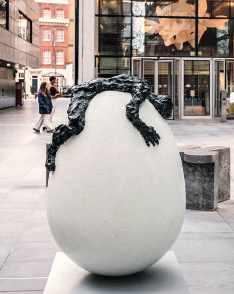
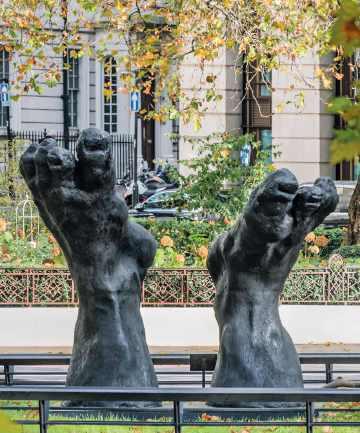


Since its founding in 2004, Masa has served more than 200,000 young professionals from over 60 countries, and its network continues to grow. Make this year stand out and see where your Masa can take you. Masa Israel Journey is more than just a physical journey to Israel. It’s an opportunity to explore oneself in new surroundings while gaining a transformative experience.

4-10 months for fellows between the ages of 18-40 in Israel, that allows fellows to shape their own futures. Masa fosters an environment where fellows are encouraged to strive towards their personal and professional destinations both during and after their programme in Israel.



















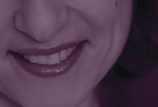






















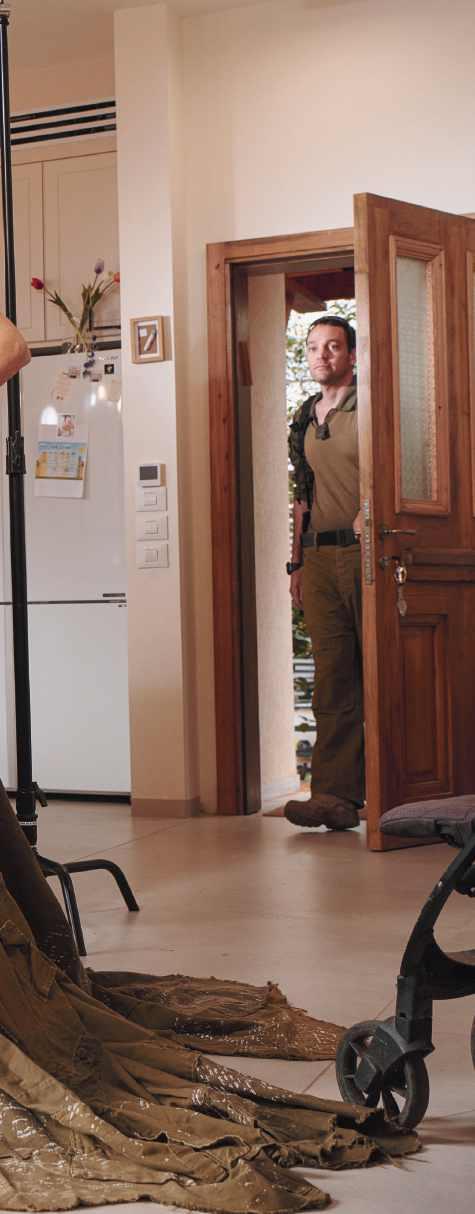
The costume designer turned conceptual artist who uses camouflage to expose what war leaves behind.
By Brigit Grant
When Uzi Amrani was a medic serving in Lebanon, he wasn’t thinking about art. He was trying to stay alive. “It took 10 years to understand what was going on with me,” he says quietly. “And it wasn’t like an injury in the body. You can’t see it.”
Diagnosed with post-traumatic stress disorder (PTSD) in 2007, a decade after his army service, Uzi’s life had already unravelled. He entered the battlefield aged 19. By his twenties, he was married with three children and terrified of the sound of traffic, of driving, of sudden noises.
His eventual diagnosis gave his pain a name and, although recovery is ongoing, Uzi is now an acclaimed multidisciplinary artist whose work gives physical form to his trauma and healing. His materials are not just fabric and thread, but memory itself, reassembled as a dress that looks like couture. This is no surprise, as Uzi Amrani won Israel’s prestigious Ophir Award for his costume design on the first season of Shtisel and, having studied at a yeshiva in Mea Shearim, he was prepared.“ I knew exactly where to look for inspiration to tailor the strictly-Orthodox wardrobe.” Uzi was unable to work on the second series because of his PTSD and chose to become a cleaner – “so I could be on my own”, he sighs. But he made it back and, today, in his Tel Aviv studio, instead of dressing fictional characters, he undresses his past, piece by piece, through art. “War and the PTSD touched every aspect of my life. Of many lives in Israel,” he says. His sculptures are
striking, even beautiful, but their power lies in the materials: repurposed uniforms of the Israel Defense Forces (IDF). In 2017, he won a competition themed around Fashion and Psalms with The Transparent Soldier. “Following military service and the post-trauma, I designed a ‘new uniform’,” he explains. Made from sheer fabric, the uniform is printed with psalms he recited during IDF convoys in Lebanon. Chillingly, the words are also on army boots. “It illustrates the vulnerability of the soldier and the desire to be invisible in the face of fire.”
Uzi made a video of cinematic quality to showcase his soldier standing on a deserted beach before slipping out of the transparent uniform. In a scene reminiscent of David Bowie as the alien in Nic Roeg’s The Man Who Fell to Earth, a young woman appears, dressed in the IDF uniform gown.
The constant appearance of the uniform in Uzi’s work is disarming. It appears as a tablecloth at a Shabbat dinner and the image is pointed. “I couldn’t sit at the table with my children,” he says. “The war was always there.” That’s why he intentionally upset his display. “It looked so different when I tore up the setting. When the chandelier was on the table. It
looked like a home after October 7. People who saw it understood. I gave a voice to PTSD and, since October 7, PTSD is everywhere in Israel.” He also used IDF uniform to make a football and a rocking horse – symbols of disrupted childhoods, altered because of the return of a father who is a soldier.
But his art also offers moments of reprieve. His tallit covering a rocking chair or used as a hammock are serene. “They represent escape,” he says. “Sitting in the arms of God when you can pray.”
Uzi works long days, up to 12 hours, often in silence. “The art is the relief,” he acknowledges. And the response to his work makes that process worthwhile. At exhibitions, audiences don’t just look, they feel. “I’m happy my story touches people,” he says. “When people saw the disrupted Shabbat table, they cried. And they understood.”
Amrani doesn’t create to impress. He creates to survive and bear witness.
The main image appears courtesy of SOS Israel support our soldiers org. Photographer Moses Pini Siluk imagines a wife awaiting the return of her husband, a reservist uziamrani.com
‘Following military service and the post-trauma, I designed a new

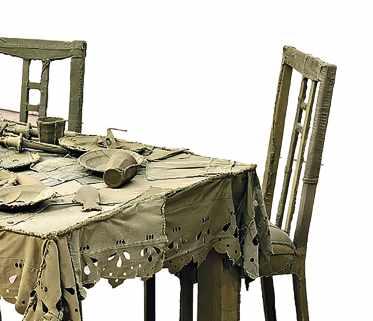
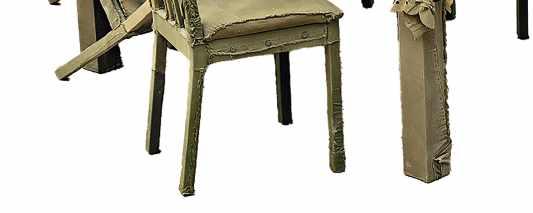

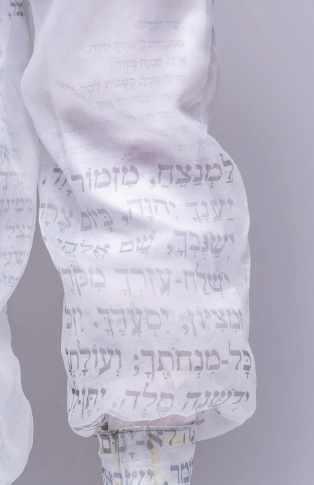


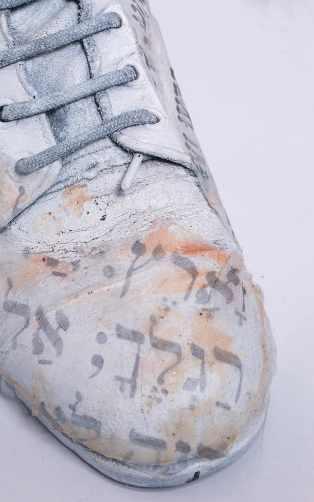
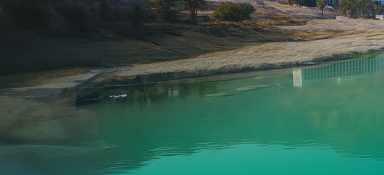
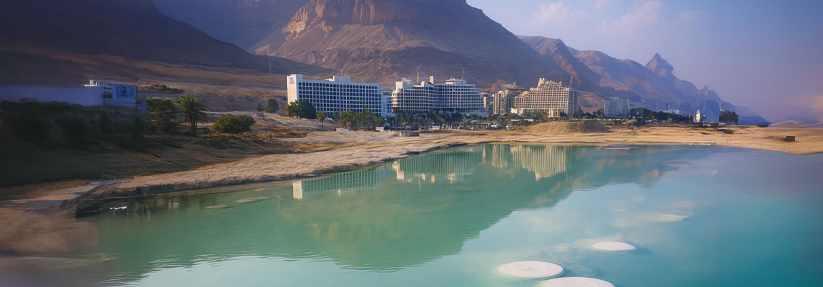
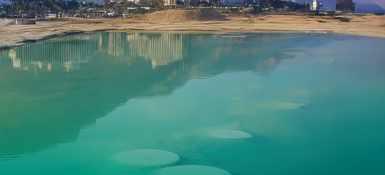

We are delighted to announce the launch of Kayma Hotel is scheduled on the shore of the Dead Sea, part of Isrotel exclusive Kayma is scheduled to open its doors in September 2025, and is expected to be the most luxurious hotel in the area. Offering deluxe suites - some of which exit directly to the seaside infinity pool, sumptuous restaurants, and a large spa facility which will provide a rich menu of indulging massage and treatment options.

Private complex at the Carmel Forest Resort
Carmel Forest, Israel's most luxurious resort, offers a new guest experience on another level: private villas in an exclusive and unique complex, enveloped by green groves, providing an extraordinary experience.
Welcome to a unique and luxurious experience in the heart of the German Colony in Jerusalem. This hotel is not just a place to stay; it is a destination where unparalleled elegance meets the city's rich history. Designed to provide a serene and sophisticated retreat, the hotel redefines the meaning of opulence, offering a distinguished atmosphere for guests seeking an exceptional stay.
This hotel sets a new benchmark for luxury hospitality in Jerusalem, offering a perfect blend of high-end services, sophisticated design, magnificent 360° panoramic views from the hotel’s rooftop infinity pool and restaurant, divine cuisine, exclusive Carmel Forest Spa and much more.
It's the ideal haven for elite travelers accustomed to the highest levels of quality and luxury.
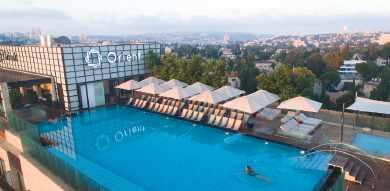

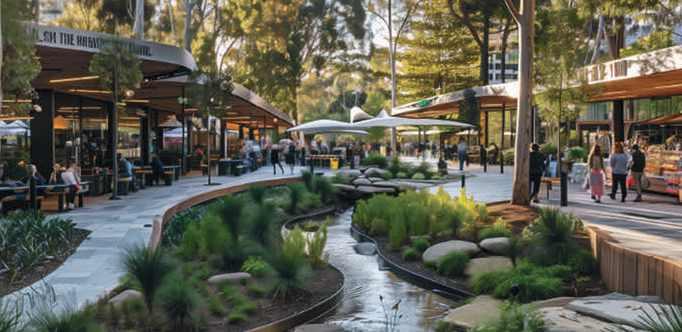
I nvesting in long-term real estate in Israel is not only a sound financial decision; It also plays a part in the country’s revival and secures your family’s future within it. Central Park Hadera is a good example of both.
The Israeli real estate market has demonstrated stability and consistent growth over the past decade, with demand steadily outpacing supply in major urban centers.
as a market where long-term investments not only preserve value but also appreciate significantly. For many British Jews, an investment in Israeli real estate is an opportunity to combine financial prudence with personal ties to heritage, faith, and family in Israel.
“Central Park Hadera,” developed by ELG Real Estate Investments, offers precisely such an opportunity. Located in western Hadera, only a mile from the Mediterranean Sea, the project spans 124 dunams and is planned for approximately 3,000 housing units. Its vision: a modern, green, and well-connected neighborhood designed for the lifestyle of Israel’s next generation, only 10 minutes from Netanya and 30 minutes from Tel Aviv.

Even in times of economic or security uncertainty, land values have risen Consistently. Today, many view Israel
Certified appraisals forecast that land values will rise sharply once the plan is approved.
Renana Yardeni, ELG’s Deputy CEO and former District Planner of the Central District at the Planning Administration, emphasizes that the project is built on strong local partnerships, with investors benefiting from “professional guidance, full transparency, and adherence to schedules.”
Early entry allows for a safe investment with high return potential, even before execution begins driving
land values upward. Coastal plain areas, such as Hadera, are known for steep increases in value as planning advances.
The project is supported by a team of strategic partners, including Yardeni herself, the international architecture firm ODA, and the economic consultancy Paz Economics. These partners ensure that the planning and execution will meet the highest standards while creating added value for early investors.
Beyond the financial aspect, “Central Park Hadera” offers Jews in the UK and the diaspora the opportunity to plant real roots in the Land of Israel.
Elhanan Lizerovitz, CEO of ELG, explains: “This is not only a wise financial investment but also a way to lay a physical foundation for future Aliyah. Properties can serve as vacation homes, as income-producing rental apartments, or as the nucleus for a new Jewish community”.
“Central Park Hadera” enables investors to build their financial wealth while laying tangible foundations for future generations in Israel. It transforms investment into legacy. For families with deep ties to Israel, “Central Park Hadera” ensures that their children and grandchildren will inherit not only a yielding asset, but also a place in the future of Israel.
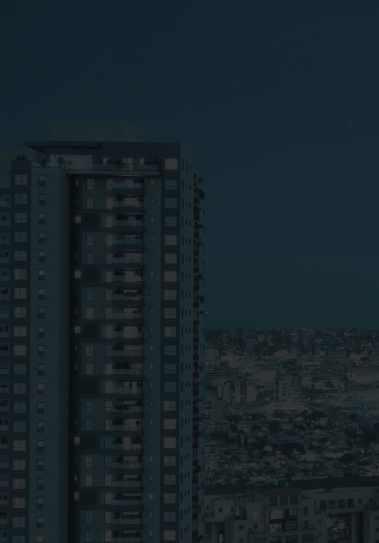

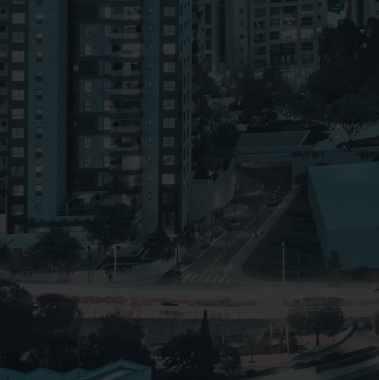



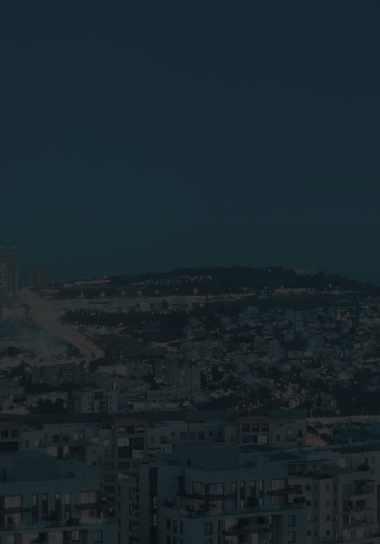



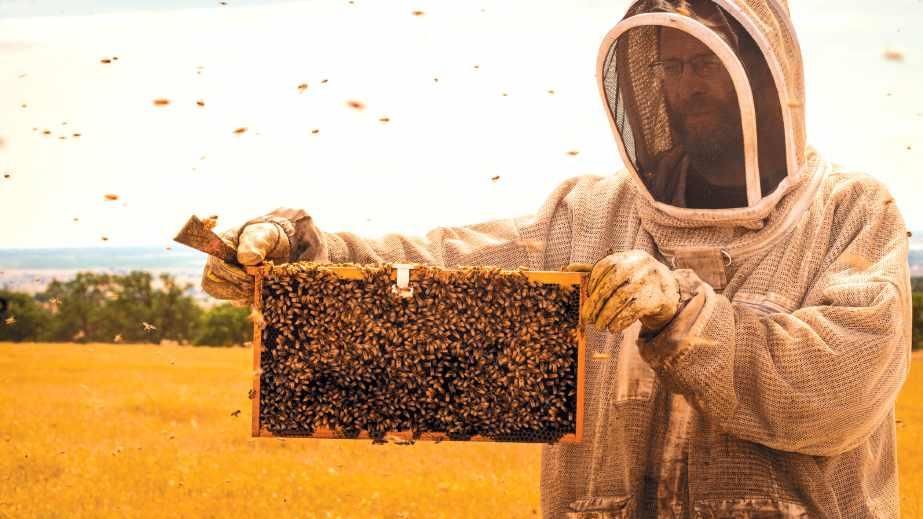
Ahead of dipping apples at Rosh Hashanah, Jenni Frazer meets the Israeli innovators using high-tech to save the bees we need for new years to come
It should come as no surprise that it’s three Israeli entrepreneurs who discovered – among other things – that bees can ‘talk’ to one another and send out real-time updates on the health of their Queen from inside the hive.
That’s just one of the many surprising, even magical, side effects of BeeHero, an award-winning Israeli company applying 21st-century technology to one of the world’s oldest agricultural practices. Israel is, after all, widely known as the land of milk and honey. And while honey is deeply embedded in Jewish tradition – especially at this time of year
when apples are dipped in it to welcome Rosh Hashanah – it’s easy to forget that milk, too, comes from cows who eat pollinated grasses. Without bees, there would be no milk, no apples and certainly no honey.
BeeHero was founded in 2017 by three close friends – Itai Kanot, Omer Davidi and Yuval Regev. Each brought different expertise and energy to the venture, but the original idea came from Itai, whose father Boaz is Israel’s largest private beekeeper.
Growing up on Moshav Avigdor, young Itai had a front-row seat to the slow decline of bee health.
He watched year after year as his father’s hives weakened and yields dropped. “It seemed strange to him that everyone else in agriculture – grape growers, dairy farmers, even fish breeders – was using tech to boost their output, yet his father was doing things the old-fashioned way,” says a colleague “Beekeeping hadn’t evolved in centuries.”
W hile studying a business sustainability course at Reichman University in Herzliyah, Itai met Omer Davidi – a seasoned entrepreneur with a background in Israeli start-ups and cybersecurity. As part of their final project, they set up experimental sensors in the Kanot family’s hives to test their theory: that data could change beekeeping.
“We wondered: could we modernise this ‘legacy industry’? Could we apply data science and machine learning to what was essentially a guessing game?”
They were soon joined by Regev, a cyber and AI expert, now BeeHero’s chief technology officer. What started as a backyard project quickly turned into a full-blown mission.
They decided to focus on the honeybee – just one species among 10,000 globally – but the one most vital to human food production. Around 75 percent of everything we eat depends on pollination. As populations rise and the climate becomes more unpredictable, improving that process isn’t just useful – it’s essential.
BeeHero’s breakthrough came in the form of two smart devices: an in-hive sensor and an in-field sensor. Historically, farmers improved natural pollination by physically transporting hives to fields during flowering periods. BeeHero steps in to optimise this whole process. The in-hive sensor is a
‘We are very thankful to the bees. They give us honey – of course –but also so much more.’
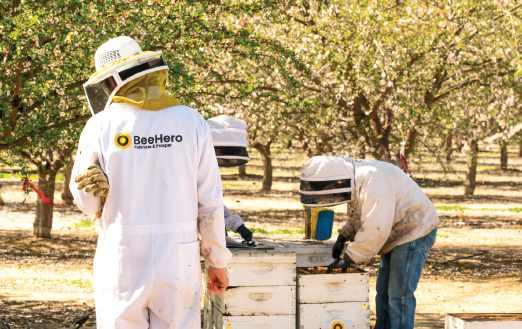
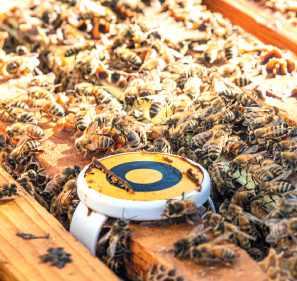
small, unobtrusive device placed inside the hive. It tracks humidity, temperature, vibrations, sounds and light levels – all of which provide critical insight into the health and status of the colony. With this real-time information, commercial beekeepers –who often oversee thousands of hives – can step in early if something’s wrong.
Thanks to BeeHero’s proprietary software, these sensors are “the Google Translate of the bee world”, says the company. “Bees use vibrations and wing movements to communicate complex signals, including alerts about threats or a weakening Queen. We can now read those signals.”
Meanwhile, the in-field sensor monitors the bees' activity in the crops. “We measure how many bees are visiting a field at any moment,” explains Davidi. “This helps farmers maximise pollination by adjusting the location or number of hives.”
This is precision pollination – the next evolution of Israel’s agricultural ingenuity, following after the globally adopted precision irrigation model.
BeeHero rents both devices to farmers and growers on a subscription basis, ensuring that every hive is monitored and optimised. Instead of hoping for the best, they can now guarantee results.
The system is climate-agnostic and works globally. Currently, BeeHero operates in Israel, the US, Australia, New Zealand and Peru – countries with high-value crops that depend on effective pollination. The impact hasn’t gone unnoticed. In 2024, Time Magazine named BeeHero’s in-field sensor one of its Inventions of the Year.
“We are very thankful to the bees,” the founders say. “They give us honey – of course – but also so much more. Our cows eat what bees help grow. There is no land of milk and honey without the bees. And to know that we’re doing this from Israel, helping farmers across the world, is something we feel deeply proud of.”
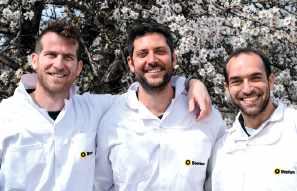



Choose the destination for your urban vacation. At Atlas Hotels, your journey starts from the inside out. A personalized and warm hotel experience in prime locations that connects you to the pulse of the city. Every stay becomes your personal gateway to explore, feel, and truly live the endless opportunities of everything around you. An Inside-Out story.
8,9 out of 10


























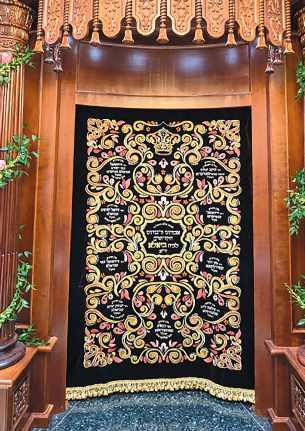

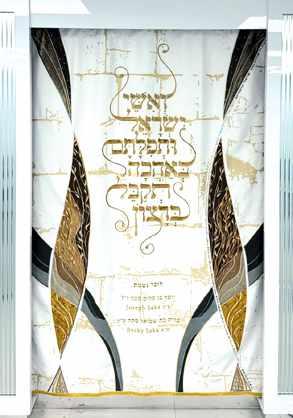

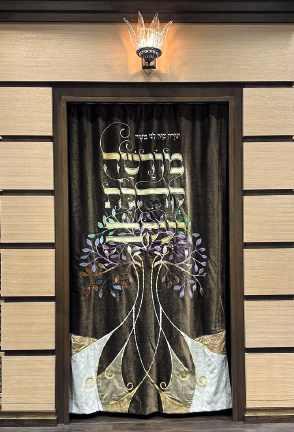
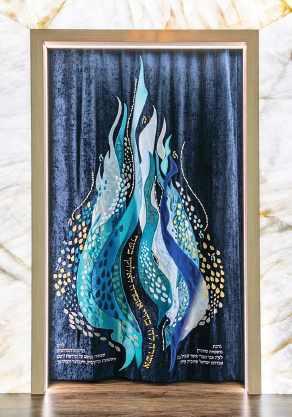

Daniel Sugarman uncovers the artists who shape the heart of the synagogues
Chana Gamliel’s artworks are exhibited in locations around the world and are seen by thousands on a daily basis – and yet it’s likely you have never heard her name. That’s because her creations are not signed and don’t hang in museums. Instead, they take pride of place at the front and centre of synagogues – designed to draw the eye.
Every synagogue around the world, no matter its shape, size or denomination, has something in common. The holy ark – Aron Kodesh, which contains the Torah scrolls – is at the front of the room, a focal point. And covering that ark will be a curtain, a parochet .
S ome artists who work in parochet design are well-known – the late Mark Podwal, the author and illustrator whose creations grace world-famous synagogues, including Temple Emanu-El in New York and Prague’s Altneuschul, and Jeanette Kuvin Oren, whose marvellous works include the designs in New York’s Central Synagogue. But Gamliel is someone new. Her business, based in the heart of the Charedi city of Bnei Brak, Israel, caters mostly to customers in the Anglosphere – the US, Canada and the UK, where her designs grace sites including the Brighton and Hove Jewish Community (BNJC), Stamford Hill’s Biala Bet Hamedrash, and synagogues from Edgware to Elstree. And unlike many others such businesses, her creations are made entirely in Israel, with all people involved being Jews who are shomer Shabbat Gamliel’s passion for design started early – it ran in the family. She grew up in Montreal, with a Moroccan-Sephardi father and an Ashkenazi mother.
“A lot of Moroccan Jews there at the time were involved in the fashion industry,” she says. “My grandfather was a fashion designer – my father imported luxury fabrics from Italy. When I was a little kid, he would give me samples of luxury fabrics and I made dresses for my Barbie dolls.
“I had a huge collection,” she laughs, referring to the fabrics. “Not as big as today, but very big for a five-year-old.”
She went to Israel for seminary and decided to
stay, studying graphic design. After graduating, she sent her CV to Israeli companies.
“The only place that got back to me was this parochet factory. I went the next day; they hired me on the spot. That’s where my eyes were opened to this particular industry.”
She soon felt she wanted to change the way people approached the field. “For a graduate, the cool thing is to make websites or work for magazines… Judaic art didn’t receive the respect I felt it deserved from the graphic community.”
Subsequent jobs – where she would be introduced to social media, Google ads and blogging – further cemented her resolve.
“I realised if I wanted to do things right, I had to accentuate the fact that what I do are works of art – months of crazy work, lots of it highly specialised, done by craftsmen. It requires a big budget.”
Having started her own business in 2019, her fi rst major solo project was in England – for the

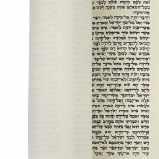

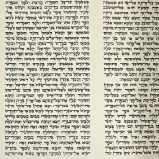



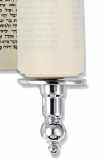
Biala Chassidic dynasty’s synagogue. With 3.8 million stitches and 1,500 Swarovski crystals, the result was staggering. Six years and many different designs later, it remains Gamliel’s favourite parochet
“When [Biala] said ‘let’s go for it’, I had to frantically try to fi nd embroiderers who could do such a large-scale project. I was so determined it was going to work out – and it did.”
She now focuses on dozens of projects simultaneously. “We usually work with three or four embroiderers, with different specialties, at any given time, two in-house workers and a few seamstresses, and maybe 10 graphic designers and artists.”
T he process itself can take many months.
“People will reach out with a vision – they’ll have all kinds of interesting things in mind… then I usually Zoom with the customer. I try to get as many people on as possible, like the rabbi, the donor, the rabbi’s wife – the rabbi’s wife loves being included! The interior designer, the executive director… everyone has an opinion. I like taking something from everybody.”
Gamliel will also try to ensure that specific connections to the place or subject of the dedication are included. For BNJC, the parochet design contains several birds – one similar to a seagull –closely associated with the city and the local football club owned by the BNJC’s driving force. Others can be more emotional – a recent design honoured a fallen soldier who was a brilliant artist – his designs were incorporated into the parochet Gamliel also designs mantles for Torah scrolls, and was contacted by a Holocaust survivor who wanted to honour family members killed in the Shoah. “She turned 98 and was like, ‘I have to


do this before it’s too late.’ We worked really hard, around the clock, to get it done.”
Not all requests can be accommodated, however. Gamliel recalls examples from her previous jobs –a deceased child whose family wanted a basketball on the parochet , a widower who wanted his wife’s evening gown incorporated into the design, a Kabbalah enthusiast who wanted God’s ineffable 72-letter name included. The rabbinical response in all these cases was no.
“We always manage to do it in a very respectful way,” Gamliel says. “You have to be very sensitive to people’s feelings.”
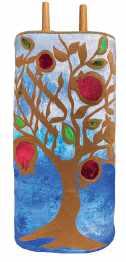
Often synagogues will request two versions of a parochet – one for the regular year and one for the High Holy Days. Gamliel describes how one synagogue ended up ordering six different sets.
Works of art that can take months of painstaking work to create do not come cheap, and a parochet can typically range from $7,000 to $18,000 (£5,200-£13,400). Gamliel says that “in the past year or so, the particular designs people have been choosing end up costing around $12,000”.
T he aim is to create something that not only has pride of place in a synagogue but encourages onlookers to feel inspired.
“I work with people across the religious spectrum of Jewish life. Everyone tells me they feel the kedusha [holiness] in the products.
“It’s crazy – people whom you would never think would say such words tell me they feel a holy aura emanating from them.”
‘People will reach out with a vision – they’ll have all kinds of interesting things in mind…’





















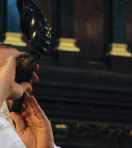



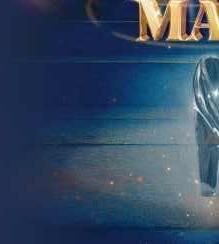



by Nick Cassenbaum



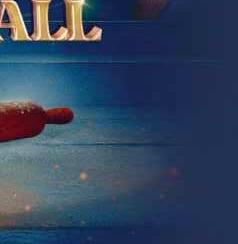

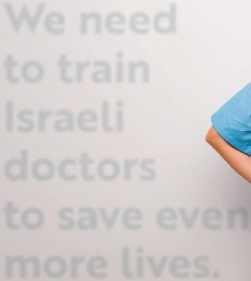




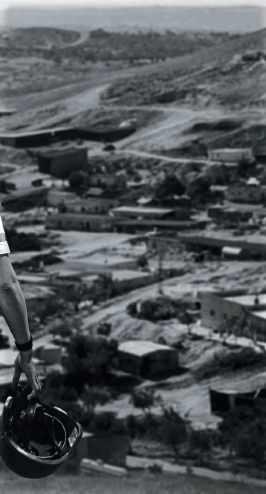
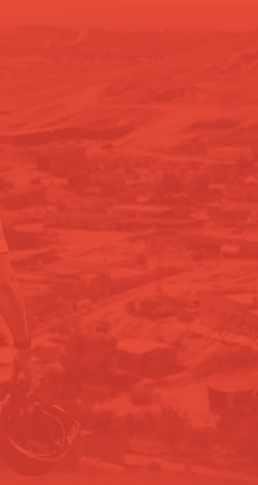
A warm Jewish home, providing outstanding residential, nursing, dementia, respite, rehabilitation and palliative care
In-house services include:
GP, Pharmacy Technician, Audiology, Dietitian, Speech & Language Therapy
Physiotherapy, Occupational Therapy & Clinical Psychology

As a charity, we can provide financial support for those unable to meet the full cost of care. For more information, please contact us at ResidentsServices@nightingalehammerson.org or 020 8673 3495
NIGHTINGALE HOUSE
LONDON SW12 8NB | 020 8673 3495
HAMMERSON HOUSE, WOHL CAMPUS LONDON N2 0BE | 020 3838 8090
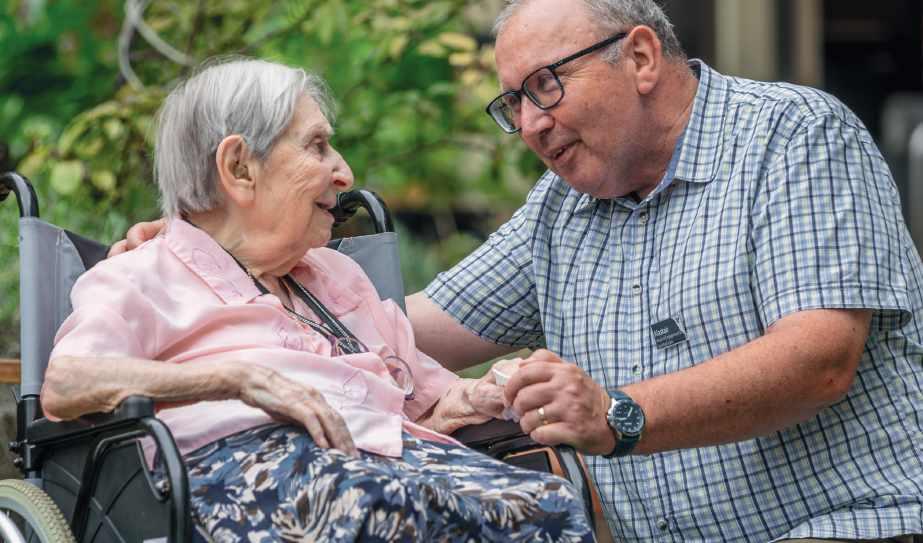
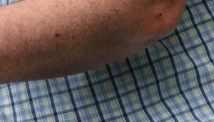


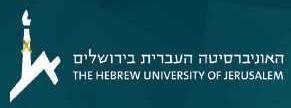

Next Year in Jerusalem!

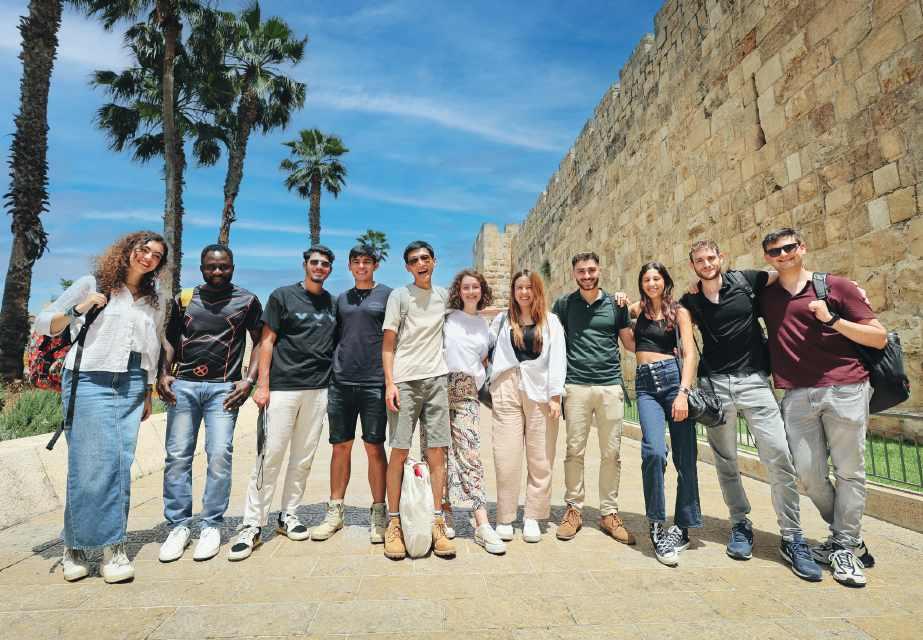


Study
The Hebrew University of Jerusalem
International Degree Programs
Bachelor’s Degrees
Master’s Degrees

PhD and Postdoctoral Research
Internships and Short-Term Programs





Join our
DIGITAL OPEN DAYS
International Degree Programs

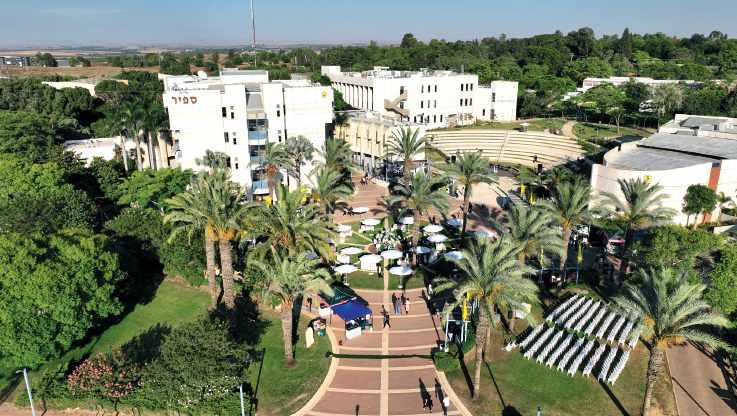
If ‘where should I go to university?’ is the question, Israel might just be the answer.
By Charlotte Henry
Going to university is a formative experience.
So is spending an extended period in Israel. For some, combining the two by studying at an Israeli institution makes for a very special time indeed.
That was certainly the case for Sammy Garfinkel. A longtime member of Bnei Akiva when growing up in north-west London, Garfinkel also took a gap year in Israel and knew he wanted to make aliyah at some point. “My original plan was do university back home, then move to Israel, because I didn’t really see a future for myself in England anyway,” he says. It’s a conclusion to which more and more young people are coming.
With his parents insistent he got a degree before joining the army, Garfinkel ended up going to university
and making aliyah at the same time. He moved in summer last year and is currently at Bar-Ilan University, a research-led university near Tel Aviv, where he reads computer science. It is among the Israeli institutions British students might consider attending.
Tel Aviv University is the highest ranked Israeli higher education institution, placed in the top 250 globally by Times Higher Education, while the Hebrew University of Jerusalem and the Technion are both in the top 350. This is no mean feat, given the number of US, British and Chinese universities they are competing against. The success of Israeli universities speaks to the kind of importance the country places on them.
The Technion, for example, is
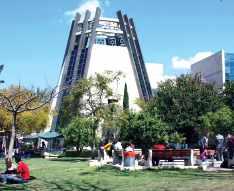
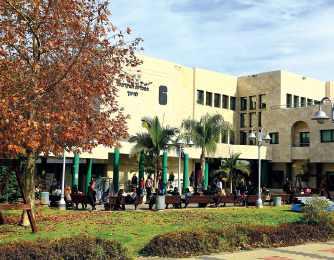
deeply embedded in Israel’s start-up ecosystem. It considers itself right at the heart of the Startup Nation, and with good reason. Seven firms founded or led by former Technion students were named among the most exciting in the country at Calcalist’s Tech Independence event last May It offers programmes to help bring the work beyond academia. Aaron Ciechanover and Dan Shechtman, the 2004 and 2011 winners of the Nobel Prize for Chemistry respectively, are among its famous alumni.
Garfinkel explained how his course started in English before teaching transitioned to Hebrew. The language barrier may be off-putting for some Brits thinking of studying in Israel. An option for them might be Ben-Gurion University of the Negev. With campuses in Be’er Sheva, Sde Boker and Eilat, it offers English-language courses taught alongside Israeli students – providing both academic immersion and an authentic cultural experience – along with opportunities ranging from summer courses to post-doc work.
There is also Reichman University, the first private, non-profit higher education establishment in Israel. Located in Herzliya, 2,000 of its 8,400 students come from more than 90 countries. The university says “the myriad graduates who have established themselves in professional, business and public service roles are proof of our success”
Not all Israeli universities are connected to large cities, though. For instance, under two miles from the Gaza border is Sapir College, one of Israel’s largest public colleges that puts a significant focus on diversity and inclusion.
Given its location, October 7 had a profound effect on the college, with 47 alumni, students, faculty and staff connected to it killed. Furthermore, Omri Miran, the partner of Lishay Lavi Miran, who directs the pre-army Mechina programs at Sapir, remains among the hostages held in Gaza.
Diversity matters too. Achva College brands itself as “where culture sensitivity meets science and innovation”. Another institution in the south of Israel, it prides itself on being deeply connected to the region in which it is found, one of the poorest in the country. It also focuses on having a diverse cohort, with 37 percent of students Bedouin from the Negev.

TOP:
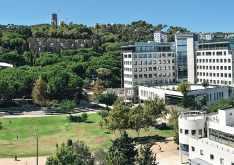
‘It was nice to arrive in Israel and have a purpose’
The diversity that can be found at an Israeli university was noted by Josie Turgill Clarke, who trained and worked as a radiographer in the NHS before doing a Master’s in public health at the University of Haifa in 2021. There, she had an array of non-Jewish classmates from all different backgrounds.
Now back in the UK, she remains close to some of the non-Jewish peers she studied alongside, including a best friend from East Jerusalem. Turgill Clarke reflects that “it was really nice to be in Israel and these different walks of life”.
As she was under 30, the Aliyah Ministry paid for Turgill Clarke’s course. This financial support is a benefit Garfinkel also noted as significant. The Aliyah Ministry puts 1,500 NIS (£327) towards his accommodation costs each month. There can be no doubt that the country is looking for ways to attract the best and the brightest. W hile both Turgill Clarke
and Garfinkel have enjoyed the diversity encountered at Israeli universities, they also found comfort in being in the Jewish state, with the terms built around key festivals. This was important for Garfinkel, who is Modern Orthodox and was inspired to make aliyah due to his faith. Turgill Clarke, too, says “it was nice to be in that environment” with Jewish holidays observed Making aliyah is an upheaval. However, going to study can make things a bit smoother. “It was nice to arrive and have a purpose,” says Turgill Clarke. “There’s definitely structure here,” says Garfinkel.
In the UK, Jewish students have been made to feel increasingly uncomfortable as the war with Hamas has gone on, having to walk past encampments and protests. Community Security Trust (CST) recorded 272 university-related antisemitic incidents in the 2023/24 academic year. Between January and June 2024, there were 98 antisemitic incidents affecting Jewish students, academics and universities, according to the CST’s recent antisemitic incidents report. It found 21 of such incidents “contained rhetoric referencing Israel and the war”.
The number of incidents was down to 35 in the same six-month period this year. However, this is still double what it was in the first half of 2023, before Hamas committed its atrocities and the current war began. It is, therefore, not entirely surprising that some Jewish students might feel more comfortable studying in Israel, where they do not have to worr y about being subjected to such abuse or even just a casual hurtful comment.
In the UK, we are blessed with several world-class universities, some of which have thriving Jewish communities. But there is no doubt that academia in Israel is a compelling option for some.
Powered by Science & Technology, Education, and Psychology,
Achva’s multidisciplinary model bridges research and practice to promote resilience, rehabilitation, and regional recovery.
The gate to Israel’s south, Achva Academic College offers a new type of academic ecosystem - one rooted in care, resilience, research and social responsibility.
Achva is a leading force for groundbreaking initiatives in mental health, rehabilitation, and education. Since the 7 October attacks its role has become significantly more vital than ever- offering clinical and psychological support, training professionals, and developing scalable community-based solutions.
Achva is a model for how academia can serve and rebuild a society in crisis.
With interdisciplinary collaborations, social clinics, subsidized training programs, and a commitment to long-term regional recovery, Achva is answering the needs of today – and preparing for the challenges of tomorrow.
Achva academy is where impact begins - and communities rise. Join us. Help rebuild what truly matters.
Our students

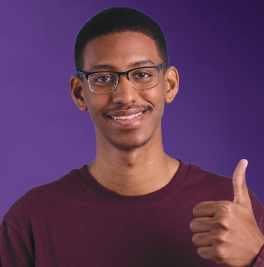

















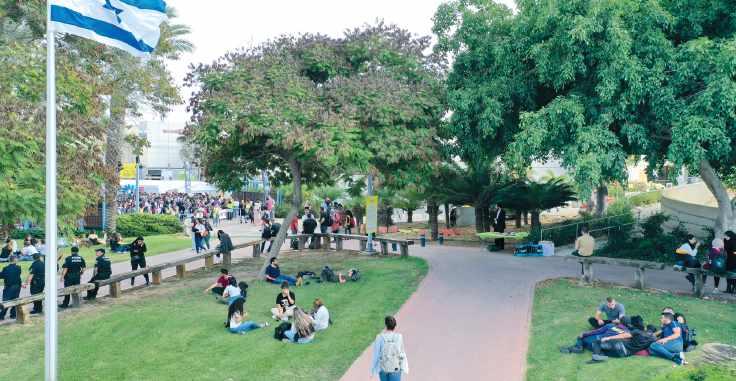


TUCKED AWAY IN Israel’s sun-soaked Western Negev, just a few kilometres from the Gaza border, is a college you’ve probably never heard of, but definitely should have.
Sapir College in Sha’ar HaNegev, near Sderot, isn’t just one of Israel’s largest public colleges, it’s a hub of creativity, resilience, and social change that’s quietly turning out some of Israel’s most interesting minds.
Sapir President, Professor Nir Kedar, says: "October 7 was a national tragedy and our local reality. Many of our students, alumni, staff and faculty were among the victims, the evacuees and the first respsonders. Among the hostages, Sapir’s Director of Mechina Programs, Lishay Lavi Miran, awaits the safe return of her partner, Omri Miran. Rooted in this region, we share its pain and its responsibility to rebuild."
ISRAEL’S DIVERSITY
Sapir students have a wide range of degree options, from Film & Television - where Israel’s indie scene owes much to Sapir graduates - to Computer Science, Public Policy, Law, Cultural Studies, Marketing and Social Work.
The School of Audio and Visual Arts is among Israel’s most respected, home to the internationally recognised Cinema South International Film Festival.
Hebrew, Arabic and Amharic echo across the grounds as Jewish, Bedouin, secular and religious students, together with students from Jewish communities all over the world, study together. By policy, there is no on-campus housing; instead, students live in Sderot, kibbutzim and small towns across the Western Negev, embedding themselves in the region’s community life.
“Our mission is to help lead renewal and to create opportunities that will keep young people here, committed to building the future of the western Negev," says Professor Kedar.
And in fact, the Government, through the Tkuma Authority, has identified technology and innovation as central to regional rehabilitation. Sapir’s new Faculty of Technology is the embodiment of that vision, aiming to transform the Western Negev into a hub for innovation, a new type of
‘Silicon Wadi’. Kedar elaborates: "It will bring together academia, industry and community in one space. This is where resilience becomes growth."
In addition, Sapir, a national leader in resilience studies, utilising its 20 years of experience operating under rocket fire, is partnering with Tkuma to establish the National & Regional Trauma and Resilience Research Center.
Many students come to Sapir because they want to make a difference. Students volunteer in shelters, launch grassroots initiatives, provide pro-bono legal aid and build technologies to support communities under stress.
Visitors often ask: Is it safe? Sapir answers with preparation and resolve. Classrooms and public spaces are reinforced or have nearby shelters, and security protocols are strictly observed. But what defines life here isn’t fear, it’s solidarity. The Sapir community is tight-knit, supportive and determined not to be scared away from the future they are building together. sapir.ac.il
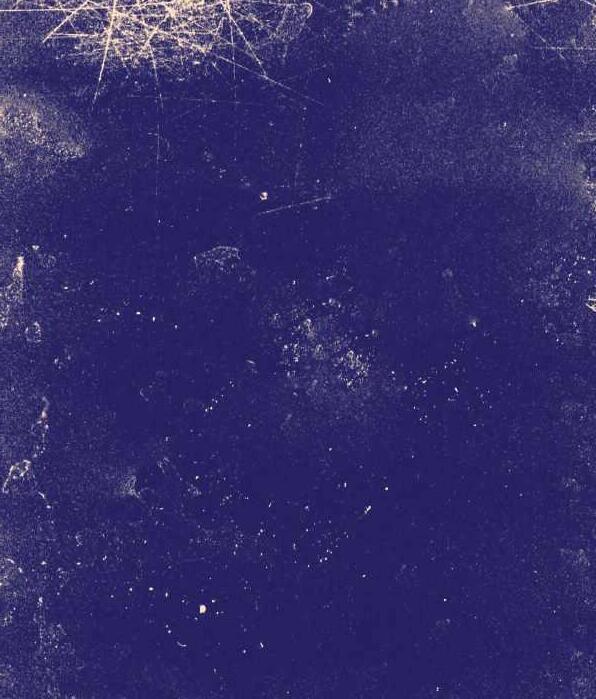
The ongoing war in Ukraine has meant a catastrophic learning crisis for children. They are falling far behind and are traumatised.
Thousands of children are waiting to be supported; thousands of children need your help.
By donating this Rosh Hashanah, you are giving them psychological support, educational support and the chance of a better future.

This Rosh Hashanah will you give a child a future?
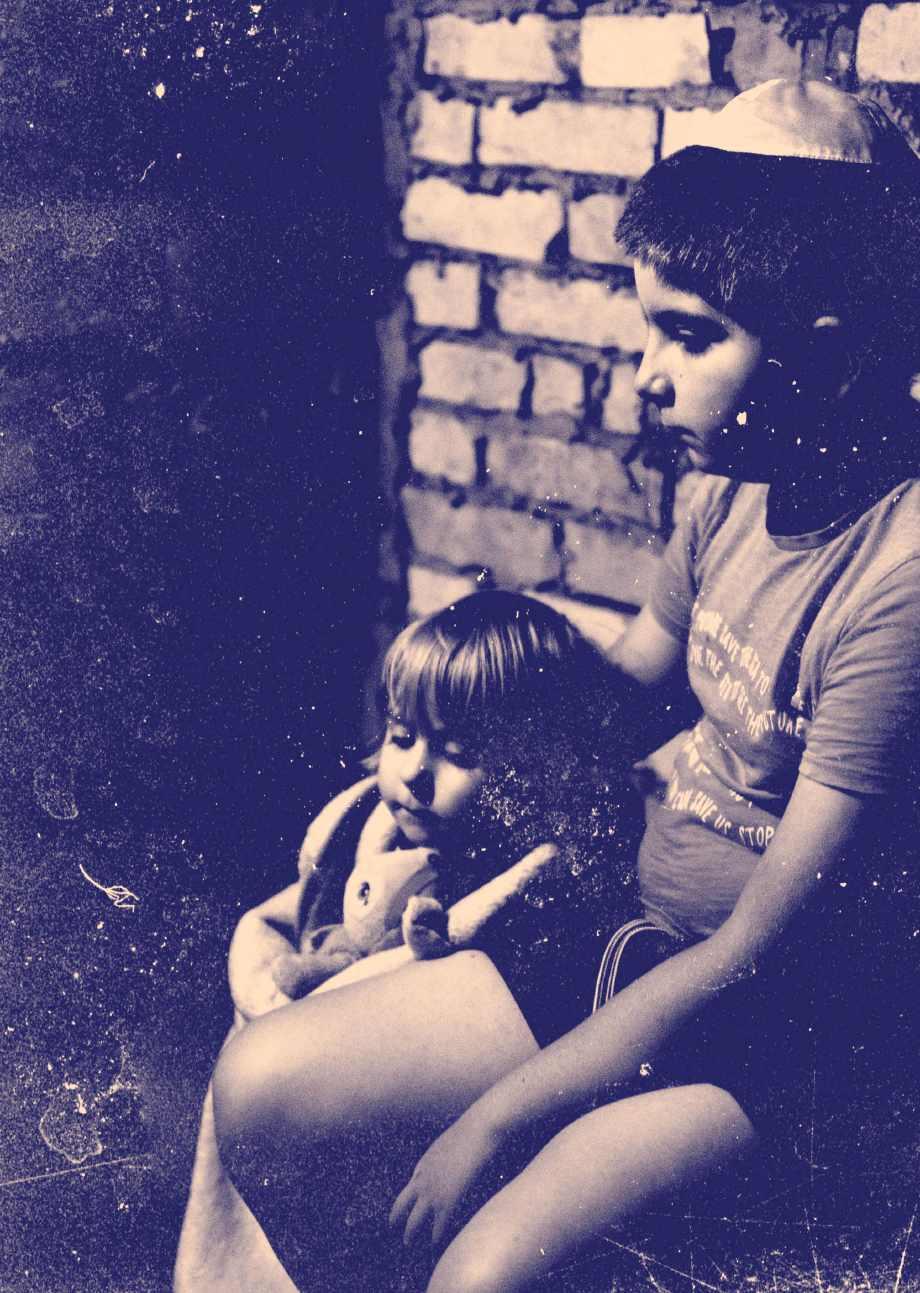
Rabbi Dr Raphael Zarum


People of the Book

Rachel Sharansky
Covenant & Continuity in memory of David Gallick z”l

Michael Rainsbury

Rabbi Barry Kleinberg On campus & online


Learn one key character of every book of Tanach
Mondays 8pm On campus & online
The Ten Lost Tribes Tour of the British Museum Sunday 26 October 10:30am–1pm In-person

Maimonides Course
Learn how he revolutionised Judaism Thursdays 7:30pm Online only





Rabbi Sacks’ Torah on the parasha with some of the best teachers from around the world Wednesdays 7pm | On campus
Women’s Gallery Podcast exploring trailblazing Jewish women Fortnightly

From beginners to advanced, discover the class that suits you best
9 Sep–17 Dec
4 Jan–26 Mar 20 Apr–16 Jul
YOU THINK YOU KNOW UNIVERSITY LIFE… THINK AGAIN!

This isn’t just lectures and essays.
It’s innovation in the lab, adventures in the desert, and connections that stretch across continents.
The next chapter of your life could start at Ben-Gurion University of the Negev. Join our info session and discover how.

Semester / year abroad or Full Degrees:
Business & Management
Sustainability & Desert Studies
ustainability
Engineering & Cyber
Humanities & Social Sciences
Health Sciences
Natural Sciences
Entrepreneurship
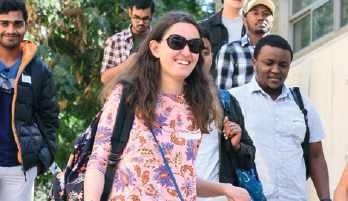


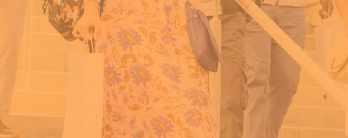

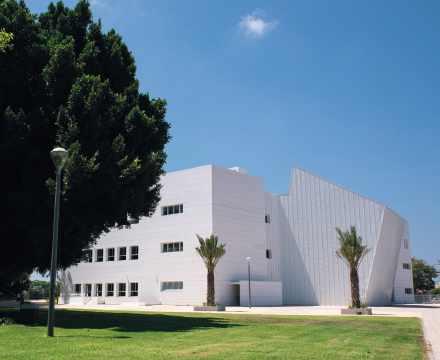

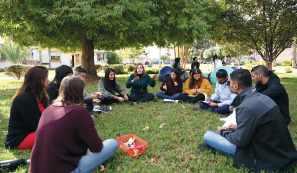
ACHVA COLLEGE in southern Israel combines academia with providing solutions for the region’s real-life challenges
At the gateway to the south of Israel is a very special college. In a rural setting, yet just 45 minutes from Tel Aviv, Achva College has 3,000 students, mostly from the southern part of the country.
But what makes it unique is that almost 90 percent of these students are women. “It started off as a teachers’ college, mainly for women, and as it expanded to other academic fields, such as psychology, computer science and more, women felt – and feel –empowered studying here,” says college president Professor Yifat Bitton. “Most come from traditional societies nearby, including Charedi.
We also have the largest share of students of Ethiopian descent in the country. I’m proud that we are able to provide such a welcoming, non-biased environment notwithstanding our rigorous academic standards.”
Women are more likely to attend higher education, especially in degree courses such as psychology, education and communication disorders but, at Achva, computer science and life science courses also have more women than men.
The college offers many programmes, including three
advanced degrees in psychology – clinical psychology, rehabilitative psychology and educational psychology.
Professor Bitton grew up in nearby Qiryat Malachi, but she had to move to Jerusalem for higher education. “It’s not right that you should have to leave your community for higher education, because this means communities lose their leaders,” she says. “Achva College enables you to reach far, but to do it near your home. Young women can pursue higher education and be able to develop their career, while still being part of their community.”
For foreign or visiting students there is accommodation in villages nearby or they can easily commute from Tel Aviv. There are several
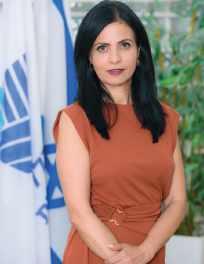
programmes taught in English that are ideal for student exchange and for professors who wish to spend a sabbatical teaching or researching in collaboration with Israeli colleagues.
“There’s a lot to learn from the way we teach and approach psychology, especially given the atrocities of October 7,” says Professor Bitton”. Achva College has developed a level of experience-based knowledge and research that is unmatched. Academia, as important as it is, cannot reach the deeper issues and the academic experience has to be merged with real-life experiences.”
Immediately after October 7, the college established a mental health ecosystem that includes subsidised clinical services, advanced professional training, research and more, using its psychology team to help people.
Israel is facing a horrific mental health crisis that affects an estimated 50 percent of the population. With enough financial support, Achva College hopes to expand its reach and provide accessible, affordable, long-term services to the people of the south and the Gaza envelope. It has a key role in the region’s healing and offers hope with its unique combination of science and care. achva.ac.il
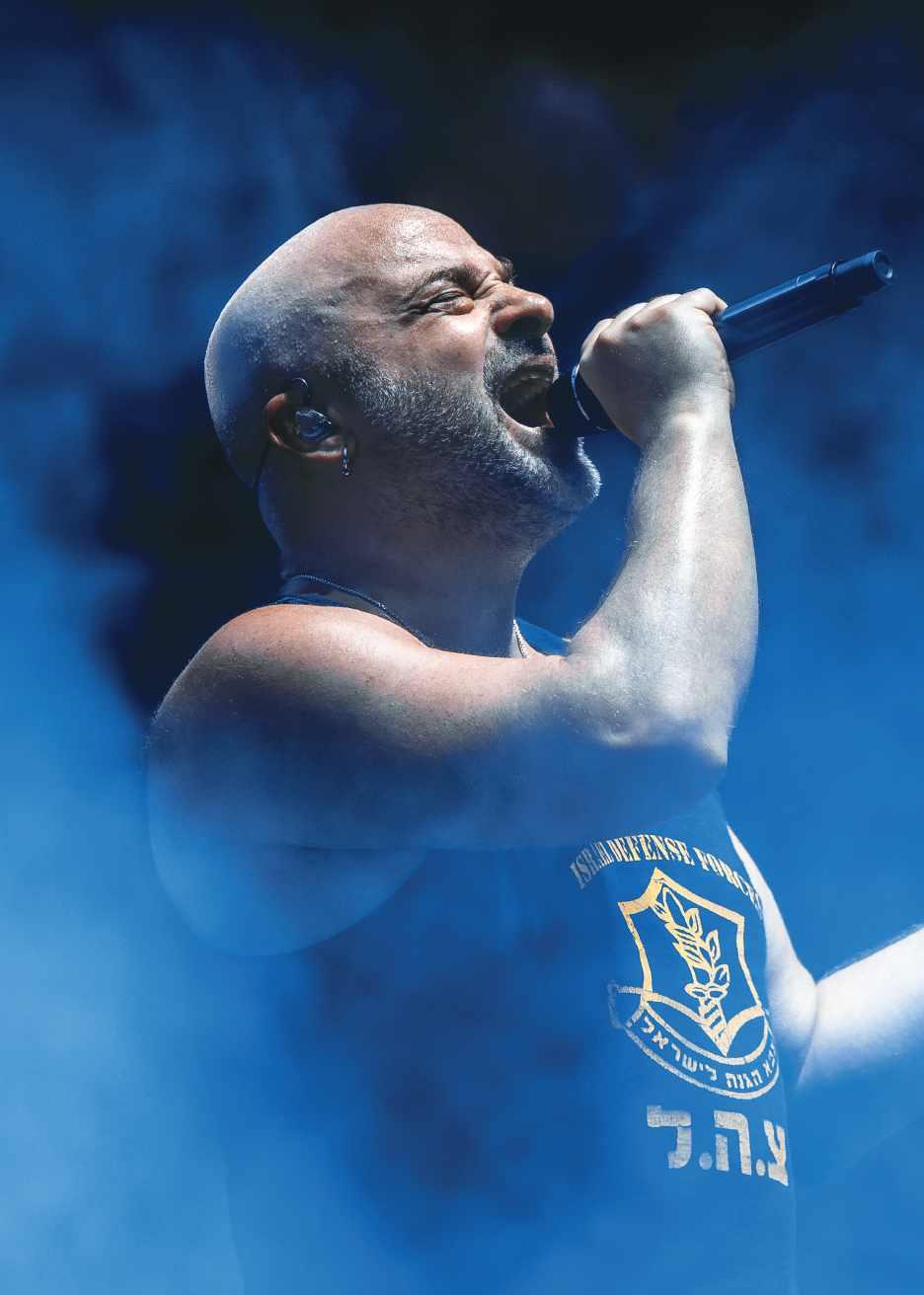

David Draiman can appear terrifying. The bald head, the long leather coat, the guttural roar at the start of Down With the Sickness — it’s menace for show. But behind the image lies something else entirely. The Disturbed frontman has become one of the most outspoken Jewish voices in music, using his platform to call out antisemitism and stand up for Israel. Since October 7, Draiman has been relentless on social media, in interviews and on stage. At one show, he led thousands in a rendition of Hatikvah . At another, he strode out defiantly in a black top with a Magen David across his chest.
T here have been moments of backlash – anger online after he signed shells for the Israel Defense Forces (IDF)– but he remains unshaken. For fans like me, seeing someone in heavy metal proudly Jewish, proudly pro-Israel, is powerful. It’s why I feel so safe in this scene.
T hat feeling was especially strong last month at Bloodstock 2025. While you might pick up a few bruises in the mosh pit, one thing you generally don’t have to worry about at a heavy metal gig is anti-Israel hate.
At Catton Park in Derbyshire in August, the front of the crowd was a flailing mass of bodies swirling and limbs colliding. Some people were hurled towards the barriers in front of the stage, where muscular security guards grabbed them to bring them back to Earth. But I only saw one person with a Palestinian flag draped over his shoulders and, upsettingly, Bob Vylan’s sick IDF quote on a toilet door. But beyond that, nothing. No stage speeches, no organised hate, no chant of “from the river to the sea”. I felt safe being a Jew at Bloodstock. I even bought bracelets from
a vendor with a Hebrew tattoo. T he annual heavy metal extravaganza might have an unpleasant-sounding name, but it’s pure fun to attend. Some of the biggest metal bands on the planet took to the stage to perform their songs, not to wave flags and shout about a war in another part of the world.
T his is a huge contrast to what has been going on in other music scenes and what we see at mainstream festivals. Glastonbury was full of anti-Israel sentiment led by a fame-seeking faux rasta no one had heard of until that day.
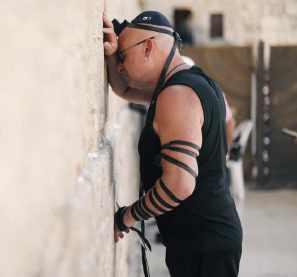
Heavy metal can look frightening – the studs, the leather, the furious vocals, but it’s one of the safest fandoms around. Big burly men in metal-studded belts and leather jackets make sure the likes of me are kept safe. People pick you up if you get knocked down. You chat to strangers at the portable loos. There is a mutual respect between fans that comes from the crowd generally being made up of outsiders, the kids who were told they were weirdos at school.
Of course, the scene has shadows. Certain black metal offshoots are tainted by Nazi sympathies, and the graffiti at Bloodstock suggests some of that poison could creep in. But, by and large, the atmosphere remains welcoming for Jews like me.
T he memory of Ozzy Osbourne, the godfather of metal and co-creator of Black Sabbath, hung over Blackstock. His death in July was still raw. The first thing I saw when I arrived was his face looming from giant screens, a tribute wall scrawled with memories of The Prince of Darkness.
A lmost every band mentioned Ozzy who, through his wife Sharon, was a strident Israel supporter and he performed there in spite of boycott calls. He even signed an open letter earlier this year demanding an inquiry into “systemic bias against Israel” at the BBC. Absurdly, the only boos at his last ever Black Sabbath concert at Villa Park in July were when David Draiman took the stage. Metal is not the only genre of music I like that


‘Bloodstock was filled with music and very little politics’
has proud Jewish figures. Saul Milton, better known as Chase in the drum ’n’ bass act Chase and Status, can usually be seen wearing a chai necklace while performing the duo’s hits and has long spoken about his Jewish pride.
Music has always had a political element. Artists and their work are powerful drivers of social change. But sometimes you just want a
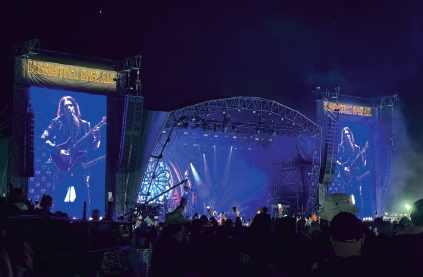
good singalong (or scream-along in the case of heavy metal) and some escapism. We don’t go to see live music to be lectured.
Attending the giant Oasis reunion tour at Wembley stadium was a pleasure because the Gallaghers understood the assignment. There were 65,000 people there for a massive party, not to listen to a monologue on the future of Gaza.
“Hello, hello, well it’s good to be back,” sang Liam in his inimitable, snarly fashion, kicking off a joyous two hours. His job was to be a rock ’n’ roll star, not a wannabe analyst on a region half the world away. It meant that, if only for an evening, everything was ok ay
It felt the same in the middle of that Derbyshire field, too. The Bloodstock weekend was filled with very heavy music and very little politics. No doubt people in the crowd had all manner of opinions on all sorts of issues, but they were irrelevant. The focus was on drinking beer, jumping around to bands and having a great time as part of a community upon which others often look down.
A sense of solidarity is one of the things mak ing heavy metal such a wonderful thing to be a part of and I had tremendous fun headbanging at Bloodstock. But my mind did periodically drift to the Nova festival and the 378 who went and never returned home. I felt so privileged to be safely doing what they had wanted to do on that world-altering day in October 2023.
It is the most grotesque of ironies that some artists have used festival platforms to sympathise with the attackers rather than the slain. Thankfully, that was not the case at Bloodstock. Long may it continue.
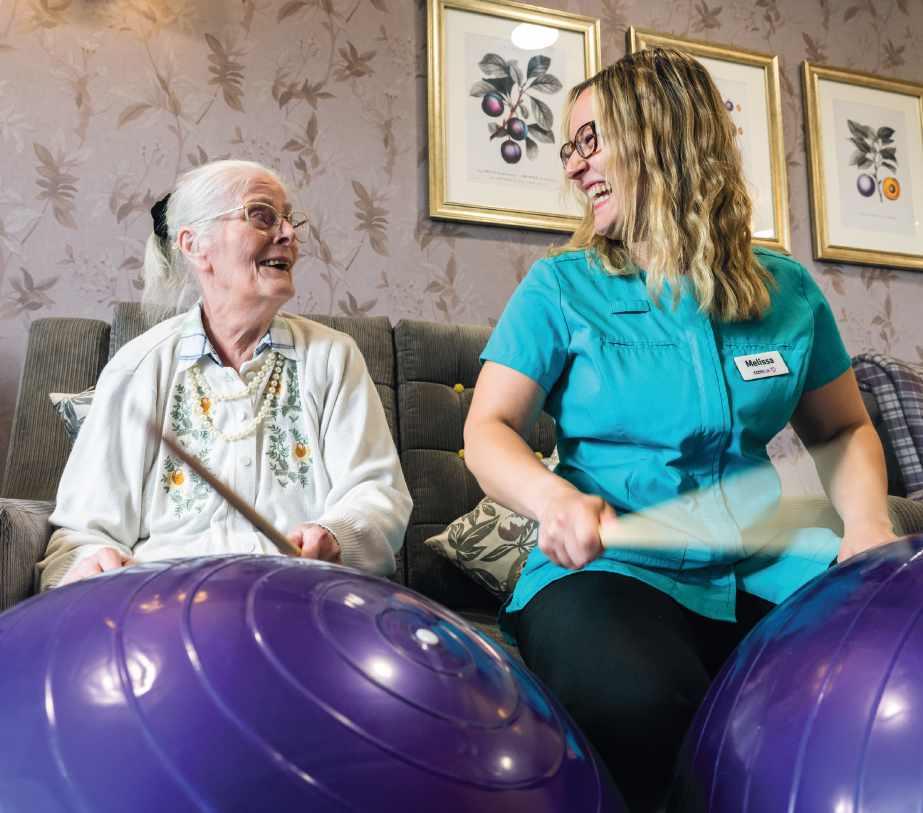





“I was living in fear. Terrified for my children.”
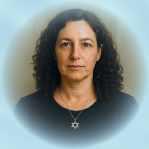


Domestic abuse doesn’t stop with one person. It ripples through families, friendships, and entire communities.
With your support, we can continue to be a lifeline for women and children facing domestic abuse and sexual violence.
HELP US STOP THE RIPPLE EFFECT OF ABUSE SUPPORT US: SCAN OR GO ONLINE jwa.org.uk/rh25
Do you feel unsafe at home? Are you worried about a friend or family member? Call our free helpline on 0808
Many in our community live with constant pain and complex health issues. When medical support falls short, The Fed steps in - securing vital help, fighting for their rights, and making daily life safer and more manageable.
From Naomi, a young mum with a debilitating condition; Maurice, an elderly man with Parkinson’s; or Katie, facing terminal cancer alone - The Fed provides tailored support, from financial aid and care packages, to emotional and practical assistance that is truly life transforming.

























“Chai recognises that each of us is unique, with our own journey and challenges.
Here we find connection, meaning and purpose as we face a new chapter in our lives.
With Chai’s support and care we rediscover ourselves.”
The Chai Art Workshop Group (Artist, Etty Debourcieu)
Jewish Blind & Disabled provides housing and support for adults with physical disabilities or vision impairments. Our services help individuals live independently, whether in one of our developments or in the community. With increasing demand, your support is vital to ensure we can help everyone who needs our support.

Donate now at jbd.org/donate or by calling on 020 8371 6611
For more information on our extensive range of specialised services and care across the UK, please call our Freephone helpline on 0808 808 4567 or visit www.chaicancercare.org
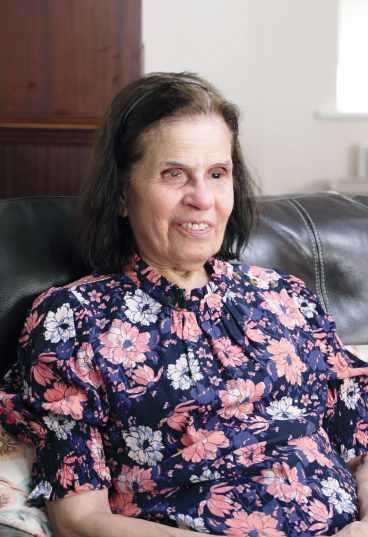









Your home away from home!
The largest international school in Israel

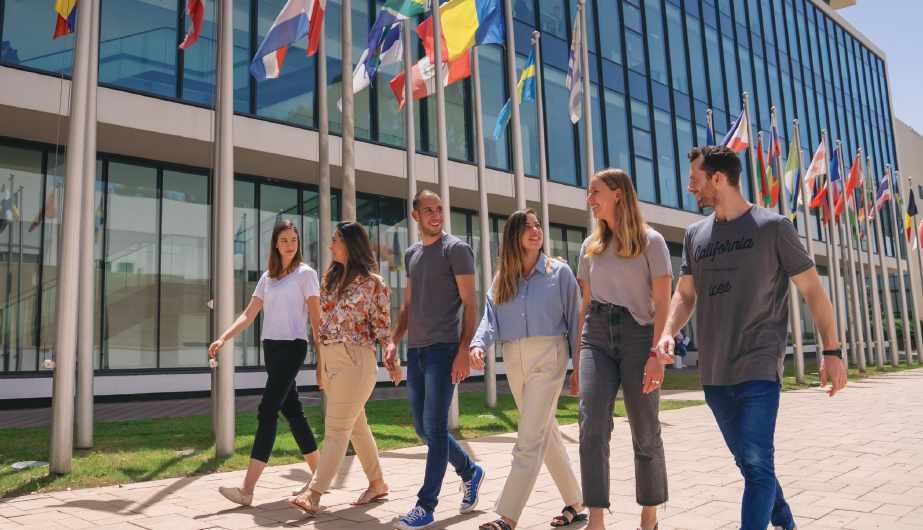
Over 2,500 international students from over 90 different countries 1/3 of all Reichman University students are from outside of Israel
Jewish and Zionist atmosphere
Jewish activities on shabbat, Jewish festivals, daily minyanjust like at home!
Great job opportunities for graduates in Israel, the UK, and around the world
Hundreds of internships available in the Herzliya hi-tech and entrepreneurial community around the campus
For more information: Watch the Full Story Here: www.rris.runi.ac.il


Charities across the community showcase resilience, innovation and care as we enter a new season.
By Louisa Walters
From vital health initiatives and growth of facilities to support across education, illness, mental health, disability services and more, every generation is uplifted, protected and empowered by the myriad charity organisations that are so fundamental to Jewish life both in the UK and in Israel. Here they share their latest achievements and their plans for the new year.
■ Kisharon Langdon’s engaging and educational programme for the chagim ensures those it supports enjoy a meaningful and inclusive experience. The Enterprise Team is in full swing creating festive products, including personalised honey jars for Rosh Hashanah, which are available to order on the Kisharon Langdon website. Educational services – Tuff kid Nursery, Wohl Campus Kisharon Noé School and Kisharon Langdon College – are energised for the new academic year, with a refreshed curriculum and an exciting Kodesh programme at the heart of all learning. There is also a dynamic calendar of events, from the popular golf day and Speed Monopoly to a showstopping fundraising dinner, where the people supported play key roles, from behind-the-scenes production to being toastmasters on stage. kisharonlangdon.org.uk
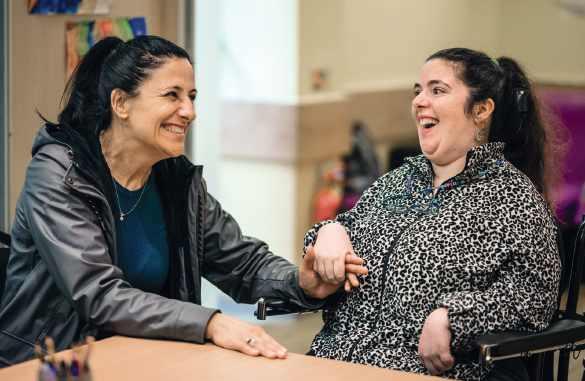




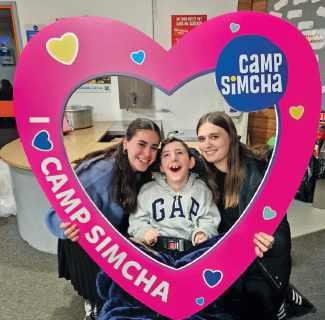
■ The High Holy Days can be especially difficult for families with a seriously ill child. Between hospital stays, medical appointments, the needs of siblings and daily life, the added demands of the festivals can feel overwhelming. Camp Simcha offers bespoke support and respite care so families can share a Yom Tov meal, volunteer help with siblings, crisis household support, hospital transport and help to make the festivals feel meaningful for families whose child is in hospital. Camp Simcha’s year-round practical, therapeutic and emotional support for the whole family, along with parties, outings and retreats bring joy and connection in the hardest times.
Camp Simcha’s Communities of Support now includes parent groups for those with children born prematurely; or living with type 1 diabetes, Crohn’s and colitis and epilepsy, and an eating disorders parent support group. campsimcha.org.uk
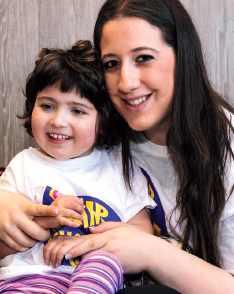
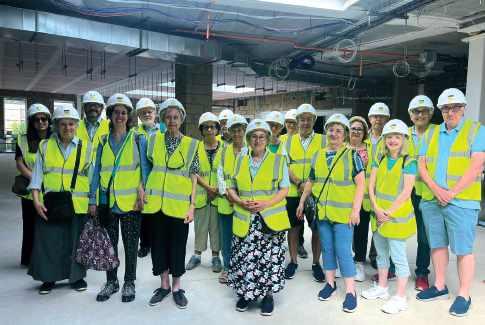
■ “It was fantastic to show nearly 300 people from the local community around the site of the new Sugar and Ronson Campus on hard hat tours this summer,” says Jewish Care CEO Daniel Carmel-Brown. The new facility, which opens in June 2026, will be transformative for the Jewish community across Essex and north east London, bringing all local Jewish Care services under one roof. Cornerstone donors Lord Sugar and his family, and the Ronson family (via The Gerald and
Gail Ronson Family Foundation), have been key to making this a reality. Following Jewish Care’s Always Essex fundraising campaign, which raised £1 million, Jewish Care’s director of fundraising and marketing, Ellisa Estrin, says: “We thank every person in the community whose generous donations to the campaign are vital in helping us meet the needs of the community.” To view a fly-through fi lm of the new Sugar and Ronson Campus, visit jewishcare.org/Redbridge
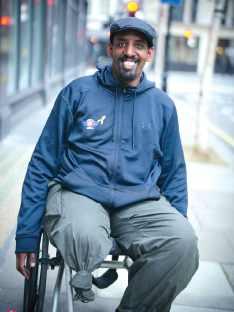
■ Time is running out for a very important scheme that ends this autumn. BRCA gene faults – linked to higher risks of breast, ovarian, prostate and other cancers –are more common in people with Jewish ancestry. The NHS Jewish BRCA Testing Programme offers free, at-home saliva tests to identify these variants. As the official engagement partner to NHS England for this programme, Jnetics, alongside Chai Cancer Care, plays a vital role in raising awareness about BRCA-associated cancers and the importance of genetic testing. More than 35,000 people have signed up and, if you’re over 18, live in England, and have at least one Jewish grandparent, you’re eligible. The deadline to request a kit is 31 October – don’t miss this life-saving opportunity. jewishbrca.org

■ Israel Defense Forces commander Omri Rozenblit (below) was gravely injured in Gaza when a massive improvised explosive device (bomb) exploded under him. He lost his leg, suffered severe burns and nerve damage and lost 100 percent of his blood. During his long recovery at Beit Halochem, he met fellow veteran Wozi, paralysed from the waist down, who refused to let him give up. Wozi challenged him to a game of wheelchair basketball with the words: “You’ve got three limbs. That’s more than enough.” Omri credits Beit Halochem as “the most important organisation for my future”. His goal is to run again and to show the world that courage is the decision to fight through the pain. bhuk.org


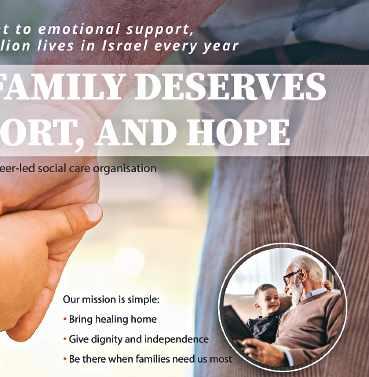





I am fun and I love swimming but I don’t like crowds or loud noises. I love going to Norwood’s Unity schemes at weekends and in the summer, where I can be me and the team help me do the things I love. It gives mum and dad a break, too! Your support this Rosh Hashanah will help more families like mine to thrive. Please donate today at norwood.org.uk/rh25

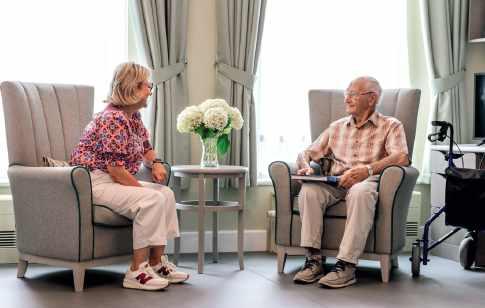
■ Rosh Hashanah is a time of renewal, reflection and fresh beginnings, and is also the perfect time for Nightingale Hammerson to unveil the beautiful refurbishment of Nightingale House. Steeped in 185 years of history, it now features a stunning Activity Hub, inspired by the state-of-the-art design of Hammerson House. With a new kitchen, soft furnishings, updated flooring and lighting, the space has been transformed into a welcoming environment, where residents can enjoy the many clubs and activities. The vibrant new café is a shared space for residents, team members, volunteers and visitors and the newly-refurbished Garden Café, which opens onto magnificent gardens, offers a tranquil and modern setting to sip coffee, chat or simply take a quiet moment of reflection. These revitalised and renewed surroundings bring a fresh beginning fi lled with joy and the spirit of community. nightingalehammerson.org
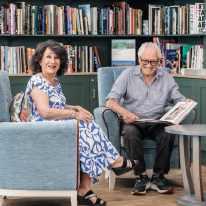
■ Mental health service Jami, part of Jewish Care, has extended its talking therapies support for adults to include young people aged 11 to 18, who are already accessing Jami’s Dangoor Children and Young Person’s Service. Jami has also acquired four new counselling suites, generously funded by The Wohl Legacy, each themed to connect to nature and the four seasons of the year. These will provide adults
and young people with a bespoke, welcoming and safe space for their one-to-one sessions. Louise Kermode, director of community mental health services (Jami), said: “It can be challenging to talk about how we feel when we are finding it difficult to cope. Being able to provide our clients with an appropriate environment to express their emotions is therefore so important.” jami.org






■ This Rosh Hashanah, Jewish Child’s Day is proud to launch a new Grants Strategy that means donations go further and change more lives. By focusing on four vital pillars – poverty relief, disability support, mental health and rebuilding young lives in Israel –larger, more impactful grants are being awarded to projects in both the UK and Israel. That means more children helped, deeper change and support that lasts long into the future, including daily meals for children in southern Tel Aviv, horse-riding therapy in Gateshead, mental health services in London and safe spaces for children displaced by war. jcd.uk.com

■ The people of Ukraine are still enduring the hardships of relentless attacks. For Jewish communities there, this Rosh Hashanah will be the fourth marked under the shadow of war. The ongoing fighting has meant the learning crisis for children is catastrophic; children are traumatised and falling behind and the country is at risk of losing a whole generation. World Jewish Relief is prioritising thousands of children who need psychological and educational support for the chance of a better future. worldjewishrelief.org
■ Shaare Zedek Medical Center has announced an ambitious expansion – a 20-storey hospital tower that will double the hospital’s size and drastically reduce waiting times for life-saving surgeries. The new facility will house 50 operating theatres, shielded ICUs and leading infrastructure. Professor Jonathan Halevy, president of Shaare Zedek, says the expansion is essential to meet Jerusalem’s growing healthcare demands. The hospital’s commitment to inclusive care is a central part of its mission, and Jewish and Arab healthcare professionals work side by side. Looking to the future, the hospital is embracing innovation, including artificial intelligence, to improve diagnostic accuracy in areas such as colonoscopies and CT scan triage. shaarezedek.org.uk
■ As we enter a new year, Israel’s leading volunteer-staffed organisation will celebrate its 50th anniversary by continuing its essential role of providing compassionate health and home care services. Since October 7, Yad Sarah has played an essential role in Israel’s recovery by supporting tens of thousands of people injured in war and filling gaps in home healthcare needs. Last year alone, Yad Sarah lent nearly 810,000 units of medical equipment to support outpatient rehabilitation, childhood injuries, chronic illness, elder care and more. It also addresses urgent social gaps, including combating senior loneliness, offering pro bono legal aid for the elderly, and expanding accessible travel. yadsarah.org.uk
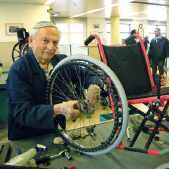
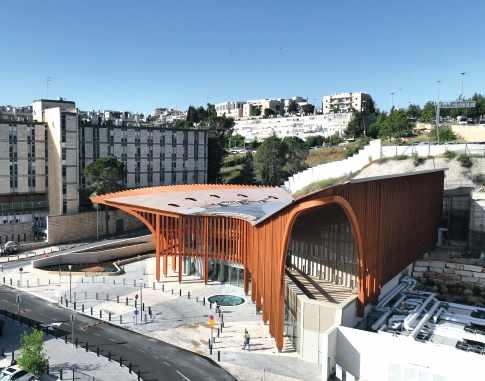
■ Jnetics is the UK’s only cross-communal Jewish charity dedicated to the prevention and diagnosis of Jewish genetic disorders (JGDs). While not exclusive to Jewish people, these conditions are significantly more prevalent among those with Jewish ancestry. Through education and accessible carrier screening, Jnetics is working towards a future in which no parent has to face the heartbreak of a child born with a severe but preventable recessive JGD. Offering subsidised screening for 49 serious genetic conditions through the Jnetics Clinic, Jnetics on Campus and Jnetics in Schools, the charity has found that 40 percent of those screened are carriers. With this knowledge, individuals can make informed choices to help ensure their children are not affected. jnetics.org
■ At WIZO the new year is about resilience, impact and Jewish women leading the way. Earlier this month the Gala Dinner celebrated the winners of WIZO’s Entrepreneur Awards – championing visionary changemakers – and in December the annual Literary Lunch will host guest speaker Anne Sebba, author of The Women’s Orchestra of Auschwitz . WIZO is launching a podcast, Impacting Your Future, sharing inspiring stories from business leaders, judges and finalists and, in Israel, vital projects continue – from youth villages to women’s shelters. wizouk.org
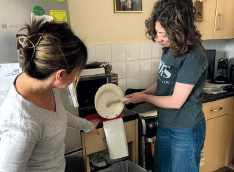
■ Jewish Blind & Disabled (JBD) houses 360 people across seven accessible housing developments in north-east and north-west London and Hertfordshire. Alongside providing a safe and adapted home to meet the individual needs of tenants, each development has a 24/7 on-site house manager and a warm, supportive Jewish community. JBD also offers support for people living in their own home though its Independent Living Advisory (ILA), which helps people with disabilities get information, advice and access to aids and adaptations to enable them to maintain independence. JBD’s sight loss groups offer a space for sharing experiences, accessing resources and participating in activities designed to improve wellbeing and foster a sense of community. jbd.org
■ People often tell Chai Cancer Care, the community’s leading support service for people and their families facing a diagnosis, that for someone affected by cancer the chagim feel different. The festivals that were once filled with joy, food and family togetherness now carry an entirely different weight. They trigger emotions and unanswered questions: will I even be here next year, who will bake the honey cake, will someone else sit in my father’s seat at synagogue?
Chai helps people navigate what was once taken for granted. As a faith-based service in the community, the team
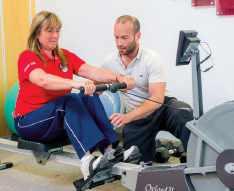
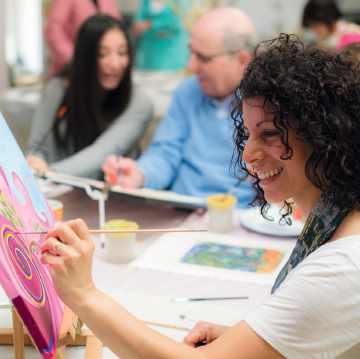
understands the impact of Rosh Hashanah without a loved one. With 11 centres across the UK, it provides a place where people are supported with compassion, dignity and hope.
Chai’s care is wide-ranging, reflecting the many layers of need that a cancer diagnosis brings. From counselling to complementary therapies and creative outlets, such as art, music and even play therapy for children from as young as three, Chai is there to support people at any stage of their journey.
Bringing people together is key and support groups allow clients to meet
This Rosh Hashanah, help Kisharon Langdon continue building a future for people within the Jewish learning disability and autism community, ensuring everyone can reach their potential and thrive throughout life’s journey.
We must raise £4.6 million to run our life-changing services - a cost that has risen due to increases in the National Minimum Wage and Employer National Insurance contributions.
At this time, the need for our support is growing. Your donation will make all the difference.
Please give generously this New Year
Donate online by scanning the QR code or visiting kisharonlangdon.org.uk/donate/rh-donation
Or call our team on 020 3209 1187
kisharonlangdon.org.uk • info@kisharonlangdon.org.uk
Kisharon Langdon Registered Charity No. 271519
others who can help one another through shared experiences. These may be for those living with a BRCA mutation or for those who have lost a spouse, with dedicated groups for under and over 65s. The Young Persons Loss of a Parent group offers a space for young people to speak openly about milestones ahead without their parent: making Kiddush, standing under the chuppah or celebrating the birth of a child.
Chai’s message is clear: no one should ever have to face the impact of cancer alone.
chaicancercare.org
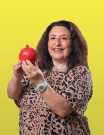







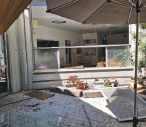












































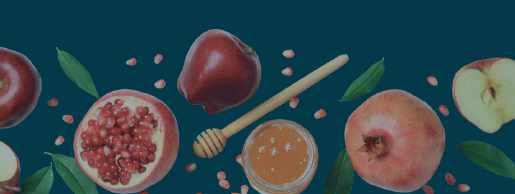

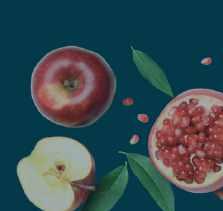

Judith Leiber always wanted to make handbags that made people smile. And she succeeded after emigrating to New York in 1947 as Judit Pető, a Holocaust survivor from Budapest. As the first woman admitted to the Hungarian Handbag Guild, she had already mastered everything from leather tanning to metalwork, so started at a small handbag company. Here, she quickly rose to forewoman before joining Koret of California where her designs drew attention. In 1963 she launched Judith Leiber Handbags, which took off after Mamie Eisenhower carried a Leiber bag to her husband’s inauguration. By transforming the evening clutch into a work of art, her crystal-studded minaudière s (pronounced mee-noh-dyair), shaped like birds and cupcakes, became instant icons and more desired than the Birkin by A-listers. Now displayed in museums, her bags still make a statement, particularly when worn on the arm on the arm of the new Mrs Bezos. Lauren Sánchez took her Eiffel Tower Leiber bag to her bachelorette party in Paris. Judith Leiber died in 2018 at the age of 97, just hours after her husband, to whom she had been


married for 72 years. Today, designer Dee Ocleppo Hilfiger, the Jewish wife of designer Tommy, keeps the bags red-carpet-worthy and with Rosh Hashanah coming, what could be more fitting than the red crystal Leiber Apple Sweetie for $4,995. It’s a pricey nod to the apple/honey dip, so here are some chag alternatives that won’t break the bank.
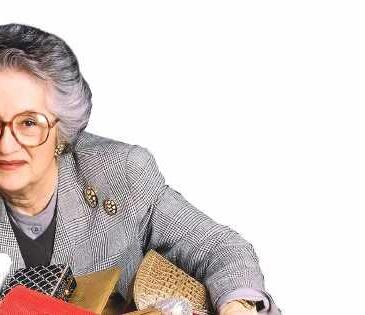

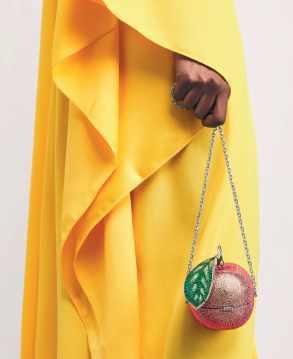
















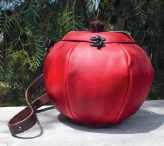









There’s a reason TikTok’s #1 Lash Growth Serum by Glow For It holds its place – because it works (be vigilant). The brand now turning five marks the occasion with a first-time cleanser: Restore Your Glow Cleansing Balm (£17.99), which nourishes skin and lashes. No dragging cloths, cotton balls or wipes, it melts away eye and facial make-up, which most cleansers don’t. glowforitshop.com

They are impossible to ignore when badly applied, but you stay schtum and stare. We’re talking eyelashes and while some can successfully self-apply, do a bad job and you’ll terrify an arachnophobe. There are always extensions but, in the blink of an eye, natural is now the trend and Everlasting Salon in Temple Fortune will give you effortlessly lifted, defined lashes – no mascara required. Not sure how they do it, but the luxe Lash Lift & Tint treatment takes about an hour, costs £70 and you’ll wish you’d tried it before. everlastingsalon-london.co.uk

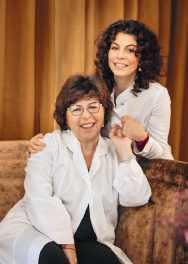
When a skin potion comes in a weighty glass bottle with a subtle italic label tucked inside a bag, it feels serious. Like it will work. Discovering it’s from a range built on the expertise of six generations of female cosmetologists from the same family leaves you in no doubt. The product is Anti-Ageing Serum by Libi & Daughters (£260), which was founded by Dr Inna, daughter of Dr
Libi Hershkovich who, as an endocrinologist and pioneer in dermatological research, has preserved invaluable family formula recipes that include her great-grandmother’s skincare creams for soldiers in the First World War. Used morning and evening on cleansed skin, the serum – which combines niacinamide, vitamin C and retinol liposome – plumps fine lines, targets pigmentation, improves hydration and moisture retention, strengthens the skin barrier and delivers antioxidant protection. Dr Inna says the skin is an organ. This complex serum backed by historical research allows it to normalise its function and improve its appearance. The Libi & Daughters legacy suggests it’s worth investing and for further assistance they have a London clinic in Fitzrovia. libi.com
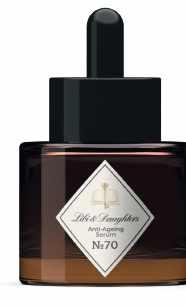



If you were born with Jewish hair, chances are you’ve spent a third of your life holding straighteners. Your Jewish New Year resolution should be to abandon them, embrace your inner curls, then enhance them with Curlsmith Shake & Shine Refreshing Mist (£19.99), which was spotted in the Love Island villa. Not that you watch it, but on TikTok it’s described as game-changing, with seven types of hyaluronic acid mineral-rich seaweed to revive, rehydrate and redefine curls. Available at Boots.
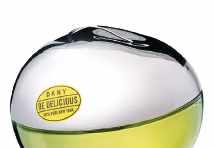



noses in modern perfumery. According to
DKNY Be Delicious tops the apple scent charts according to the experts. So, in the spirit of Rosh Hashanah, Donna Karan gets a mention, but Miller Harris Melody eau de parfum (£180) is the one to talk about. The brand’s Lost in the City stops tra c as people sniff the air around you, but Melody has a hard scent to follow, and it is created by Sidonie Lancesseur, one of the most respected noses in modern perfumery. According to forecasting platform Trendalytics, rose fragrances are up 21 percent year on year and Melody is a pairing of rose damascena absolute with white musk, cashmere wood, bergamot and blackcurrant. So no apples, but it’s gorgeous. From Miller Harris boutiques and millerharris.com
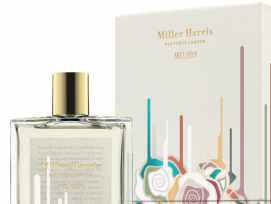

By Lara Benjamin @lara.thestylist

t’s the fourth week of September and I’m staring at my wardrobe as if it might suddenly part like the Red Sea and reveal the perfect Rosh Hashanah outfit. Apples? Bought. Honey? Drizzled. But my outfit? Let’s just say: spiritually prepared, sartorially panicking.
Rosh Hashanah always creeps up faster than expected – one minute you’re sipping rosé in a sundress, the next you’re wondering whether you can wear a linen co-ord to synagogue (spoiler: probably not). It’s the first big moment in the Jewish calendar where we all ask: What do I wear to feel put-together and appropriate without buying an entirely new wardrobe? Because, let’s face it, we go to shul for prayers, but stay for the fashion-watch.
And September is all about fall fashion, so if you want to look seasonal and sorted, here’s your last-minute guide to dressing for the High Holy Days and getting maximum mileage from your pieces into autumn.
The midi dress is a one-piece wonder: throw it on and suddenly you’re polished, pulled together, and perfectly prepped for synagogue. Go for styles with sleeves, higher necklines and a hem that hits mid-calf or lower. Think rich tones such as wine, olive or navy, or lean into tradition with soft whites and creams symbolic of renewal and a fresh start.













The blazer is your secret weapon. Throw it over a dress, layer it with a knit and midi skirt or pair it with a silky blouse and wide-leg trousers. But why stop there? Go all in with a matching suit. A soft tailored co-ord in caramel, forest green or navy. Prefer skirts? Try a bouclé blazer and matching midi – feminine and endlessly remixable. And each piece works solo. The blazer with jeans. The trousers with a tee. The skirt with a turtleneck and boots come Succot. endlessly remixable. And each piece works solo.


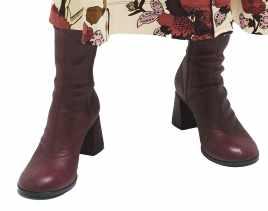







A well-cut skirt is like a good roast chicken recipe: dependable and made to be repeated. Go for pleats, satin bias cuts or wrap styles that can be dressed up or down. A cream knit top and a wine-toned midi skirt is a perfect look for the Rosh Hashanah service.





















Let’s be real: many of us are walking or standing more than we think during the chagim. Choose shoes that look good and behave. Dainty ballet flats, velvet Mary Janes and low-heeled slingbacks all walk the line (literally) between comfort and style. And you can always add a new handbag.
September is also fashion’s in-between season – you need sleeves, but not full-on layering. This is where statement sleeves shine: fluted, puffed or softly bloused. If you’re worried about chillier weather, pop a fine knit or turtleneck underneath a dress or have a cardigan on standby.
The real goal? Clothes that don’t just look good on the chagim but still feel right come October. A tailored trouser-and-blouse combo for a work event or simcha. A chic midi dress for date night, girls' night or the next time someone says “just something smart-casual”.
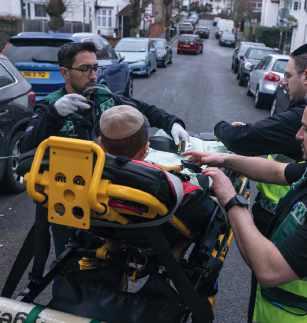

























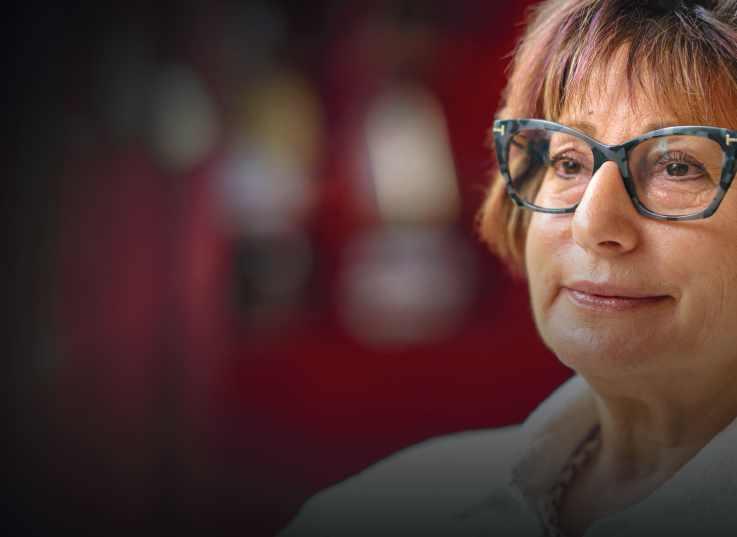
The Modern Orthodox influencer Miranda Strauss shares her family recipes in her new book
Melinda Strauss has amassed a following on social media (@therealmelindastrauss) of more than 1.2 million, a space where people feel comfortable asking questions about Judaism, learn about her family’s customs and can’t get enough of her Jewish recipes and stories. In her new recipe book Eat Jewish, she pairs more than 100
traditional and modern kosher recipes with key stories and insights into Jewish tradition, history and culture, celebrating the idea that food has no boundaries. Her recipes are inspired by festivals, her family’s favourite Shabbat dishes and her parents’ and grandparents’ recipes dedicated to their children and grandchildren.
SERVES 8 TO 10
BREAD PUDDING
• ½ cup (115g) unsalted butter or vegan butter, softened, or ½ cup (120ml) neutral oil
• 1 cup (200g) packed light brown sugar, divided
• 2 teaspoons ground cinnamon, divided
• 1 large plaited challah
• 3 large eggs
• 1½ cups (360ml) milk or non-dairy milk
• 1 teaspoon vanilla extract
• ½ teaspoon kosher salt
ICING
• 1 cup (100g) icing sugar
• 2 tablespoons milk or non-dairy milk
• ½ teaspoon vanilla extract
METHOD
1. Preheat the oven to 350°F (175°C/gas 4) and grease a 9 by 13 inch (23cm by 33cm) baking dish.
2. In a small bowl, stir together the butter, ½ cup (100g) of the brown sugar and 1 teaspoon of the cinnamon to make a thick paste. Transfer the paste to the prepared baking dish and spread it into a thick even layer.
3. Using a serrated knife, cut the challah into 2 inch (5cm) cubes. Arrange the cubed challah in the baking dish in an even layer.
4. In a large bowl, add the eggs, 1½ cups (360ml) milk, 1 teaspoon vanilla and the remaining ½ cup (100 g) brown sugar, the remaining 1 teaspoon cinnamon and the salt; whisk until fully combined. Add the egg mixture to the baking dish, distributing it evenly over the bread. Set aside until the bread fully absorbs the liquid,
about 10 minutes.
5. Bake until the top is golden brown, 30 to 35 minutes. Let cool slightly, about 15 minutes.
6. Meanwhile, make the icing. In a small bowl add the icing sugar, 2 tablespoons milk and 1/2 teaspoon vanilla and whisk until smooth and thick. Drizzle the icing over the bread pudding while it’s still warm. Serve immediately.
Note: the bread pudding can be stored at room temperature in the baking dish, covered tightly with foil or cling film, for up to three days and frozen without icing for two to three months. Thaw it overnight in the refrigerator and warm it up at 350°F (175°C/ gas mark 4) for 15 minutes before serving. Drizzle on the icing after it is warmed through.

I like to think of this as my Rosh Hashanah pot roast, because during the Jewish New Year we eat symbolic foods, each with a special meaning – and many of them are in this recipe, including pomegranate seeds, dates and leeks.
SERVES 8 TO 10
INGREDIENTS
• 4lb (1.8kg) braising steak
• 3 teaspoons kosher salt, divided
• 1 ½ teaspoons black pepper, divided
• 4 tablespoons extra-virgin olive oil, divided
• 2 leeks, white and light green parts sliced into thin rounds
• 1 cup thinly-sliced mushrooms
• 2 cloves garlic, crushed
• 1 cup (240ml) beef stock
• 1 cup (240ml) pure pomegranate juice
• 1 tablespoon honey
• 1 tablespoon Dijon mustard
• 1 tablespoon onion soup mix
• 1 teaspoon paprika
• 1 teaspoon garlic powder
• ½ teaspoon dried ground thyme
• pomegranate seeds, for garnishing
• Fresh thyme, for garnishing
1. Pat the roast dry with paper towels and season with 2 teaspoons of the salt and 1 teaspoon of the pepper.
2. In a large, heavy-bottomed pot with a lid, heat 2 tablespoons of the oil over medium-high heat until it shimmers, about 2 minutes. Add the meat and sear it all over, about five minutes per side. Transfer to a large plate.
3. Reduce the heat to medium. Add the remaining 2 tablespoons oil, the leeks and mushrooms; cook, stirring occasionally, until beginning to caramelise, four to five minutes. Add the garlic and cook until fragrant, about 30 seconds. Add the stock and juice; stir until the browned bits loosen from the bottom of the pot. Stir in the honey, mustard, soup mix,
paprika, garlic powder, dried thyme, the remaining 1 teaspoon salt and the remaining ½ teaspoon pepper. Return the meat to the pot and bring to a boil over medium-high heat. Reduce the heat to low, cover and let simmer until the meat is tender and the sauce has reduced by half, two to three hours.
4. Transfer the meat to a cutting board and let rest for 15 minutes. Cut into ¼ inch thick (6mm) slices. Serve warm on a platter topped with the sauce, pomegranate seeds and fresh thyme.
Note: Can be stored in the refrigerator in an airtight container for five days.


Often referred to as a sweet lokshen kugel, this is my Grandma Dorothy’s non-dairy extra-sweet noodle kugel.
SERVES 8 TO 10
KUGEL
• 1 tablespoon plus ¼ teaspoon kosher salt, divided
• 1 package (12oz or 340g) wide egg noodles
• 4 large eggs, beaten
• ¾ cup (150g) granulated sugar
• 1 cup (225g) unsalted butter or vegan butter, melted
• ½ teaspoon ground cinnamon
• 1 cup (145g) raisins
TOPPING
• 1 cup (90g) cornflake crumbs
• 1 tablespoon granulated sugar
• ½ teaspoon ground cinnamon
• 2 tablespoons neutral oil
METHOD
1. Preheat the oven to 350°F (175°C/gas 4) and grease a 9 by 13 inch (23cm by 33cm) baking dish.
2. Heat a large saucepan of water to boiling over high heat and add one tablespoon of the salt. Add the noodles and cook for one minute less than the package directs for al dente. Drain.
3. In a large bowl, add the beaten eggs, sugar, melted butter, cinnamon and the remaining ¼ teaspoon salt; whisk until smooth. Fold in the cooked noodles and the raisins. Add the mixture to the prepared baking dish, using a rubber spatula to scrape it from the bowl and smooth it out into an even layer.
4. Make the topping: in a small bowl, add the cornflake crumbs, sugar, cinnamon and oil; stir to combine. Sprinkle the mixture onto the kugel.
5. Bake until golden-brown and crispy on top, about one hour. Let cool slightly, about 10 minutes.
6. Serve family-style in the dish.
Note: Can be stored in the refrigerator in an airtight container for four days
Eat Jewish by Miranda Strauss is published by Rock Point, £22
The new season brings new dishes and some exciting openings.
By Louisa Walters
T he dream team behind Mazal in Camden are opening a second kosher restaurant this autumn in Golders Green (in the old Sami’s unit). Bracha will offer an Israeli-style menu with griddled meats, marinated chicken and sabich as signature dishes. Co-owner Neta Segev says the restaurant is going to be bright and colourful, young and modern but with a retro feel and communal tables. Meanwhile, back in the building Mazal has launched a blooming onion – one look at the Instagram photo will have you running there to try it.
A nyone who remembers Ananas in Mill Hill will be interested to hear that the same owner has opened Ariele in Radlett (in the former Daisy’s unit by the station). It’s a similar menu to Ananas, with breakfast dishes, salads and sandwiches with an Israeli twist but it is not kosher. My go-to here is the halloumi salad.
I f you’re heading to or live in Brighton, Masterchef: The Professionals winner Steven Edwards’ restaurant etch in Hove is ideal for a relaxed weekend lunch or evening out. It has an open kitchen, private dining room, cosy booths and a really cool bar. Sustainability is at the heart of the menu, with menus changing weekly to avoid overusing ingredients and to use the best of local produce when it’s at its peak. Local and high-end wines are key to the guest experience. This autumn, a four-course tasting menu will be launched (£55). The restaurant has become famous for the Marmite bread, served with seaweed butter.
T he most talked-about north London opening this summer was Von Crumb schnitzel restaurant in Belsize Park. The simple menu offers four starters, four schnitzels and two schnitzel




sandwiches, so the moral of the story is, if you don’t like schnitzel don’t go! There is also a children’s menu. You can choose between chicken, veal, beef and aubergine schnitzel, all in breadcrumbs and they come with mash, parmesan fries or tenderstem broccoli. Now that bikini bodies have gone undercover (literally) for autumn, I suspect it will be even more popular.
For inventive pan-Asian cuisine, lethally good cocktails and a great vibe with banging music, try Scott Hallsworth’s Freak Scene in Soho. Previously head chef at Nobu and the founder of Kurobata, Hallsworth brings his cult dining concept to 100 Wardour Street for an exclusive pop-up residency until November (he has permanent sites in Fulham and Balham). Most dishes are designed to be shared and everything features a creative spin. Think Padron peppers in a yuzu-miso gravy and crunchy chips with furikake and a jalapeno dip. Standout mains include tuna sashimi pizza with wasabi tobiko and truffle ponzu; fried chicken with peanut soy, pineapple sambal sauce and house pickles; and grilled hispi cabbage with ponzu beurre noisette, truffle and dried miso. For sushi lovers, there is sashimi and nigiri omakase as well as imaginative ways with rolls. Finish with the Valrhona chocolate harumaki with passion fruit dip. For cocktails, try the Green Bastard and the Sakatini. Alex Galbinski

T he launch of Cinnamon Kitchen Leeds in May marked the Northern debut of Vivek Singh’s brand, following the success of celebrated London venues. T he restaurant – in the central hub of City Square – blends heritage interiors, bold flavours and a lively atmosphere. Renowned for pioneering modern Indian cuisine in the UK, Singh’s blend of innovation and expertly-spiced dishes has made the restaurant an instant hit in the heart of the city.
Bringing style and flavour to St Peter’s Square, The Anthologist Manchester, part of the Drake & Morgan group, is an all-day destination for all occasions – from morning coffees and power lunches to late-night cocktails and weekend celebrations. Fresh, seasonal dishes, expertlycrafted cocktails and a vibrant atmosphere are all set within sleek interiors and sociable spaces
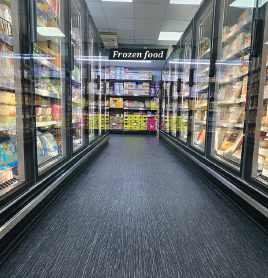

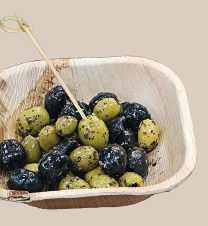
Autumn brings a ton of chagim (and Netflix new releases), so you may well be doing a fair amount of eating in. Moshe’s in Temple Fortune, which has been proudly taking kosher shopping from blah to bliss since 1983, is not just a supermarket. It’s part of the Jewish calendar, traditions and celebrations. With beautiful displays, a joyful atmosphere and personal service, it has been expanding and innovating through its 40+ years in business, to keep up with a burgeoning kosher market and increasingly sophisticated consumers. Whether you’re picking challah, or stocking up for Shabbat, Yom Tov or a simcha, you are covered with a vast range of kosher food from around the globe – all at keen prices – plus Rosh Hashanah gifts and cards, wine, children’s toys and novelties, napkins and disposable partyware. Don’t leave without trying a pack of Moshe’s Mediterranean olives – they are a Moshe’s speciality!
up fresh challah are a Moshe’s speciality!
Rosh Hashanah invites reflection and the raising of a glass.
By Tal Sunderland-Cohen
As we mumble our way through borei pri hagafen and sip from something red, white, rosé or questionably orange, it’s worth pausing – not just for contemplation, but for a sober (well, not too sober) look at the state of Israeli wine.
Let’s start with the good news. There are now some 500 wineries in Israel – around 80 of them commercial, each producing more than 50,000 bottles a year. The rest? Passionate, often family-run boutique ventures, full of heart, ambition and probably someone’s retirement fund. Annual production clocks in at 40-45 million bottles, and Israeli wines continue to punch above their weight, bringing home medals from Decanter, Terravino and the International Wine Challenge.
However, since October 2023, hospitality has taken a hit, tourism is down, and gala dinners have been replaced by “strategic briefings” Unsurprisingly, fewer corks have been popped and wine sales have sagged accordingly
E lsewhere, dozens of Israeli wines have quietly vanished from restaurant wine lists across Europe and the US. Not due to taste – perish the thought – but due to origin. What once flowed freely as a cultural bridge now trickles through
geopolitical fi lters. It's not easy being a bottle with a backstory. Want to bottle wine in Israel today? Brace yourself. Corks are pricier, labels arrive late (if at all) and barrels cost nearly as much as the Merlot they’re meant to age. Add a scorching summer and a parched winter, especially in the Galilee and Judean Hills, and you’ve got a recipe for frustration – ideally served chilled.
In spite of it all, Israeli winemakers persist – tenacious as the vines they tend on the rocky hillsides of Carmel or the Upper Galilee. Out of the hardship comes resilience, ingenuity and a kind of stubborn poetry.
Here in the UK, the initial enthusiasm for kosher and Israeli wines – especially in the wake of “supporting local from afar” – has tapered. Some importers face hurdles. Some shelves look emptier. But this, dear reader, is where you come in.
T his Rosh Hashanah, as you deliberate over whether to serve brisket or sea bass, take a moment to choose your wine with intention. Whether it’s a sun-soaked Carignan from the Negev, a Judean Hills Chardonnay with the quiet elegance of a dinner guest who brings dessert, or a bold Upper Galilee blend that dares you to decant, buy Israeli. Buy kosher. Buy meaning.

A nd if you don’t manage to drink it all this year (or even next), fret not. Good red wine, like the Jewish people, improves with age
So here’s to the growers, the dreamers, the barrel-wranglers and cork-counters. Here’s to craftsmanship, continuity – and a glass that is, against the odds, still half full.

BARKAN WINERY, CHARDONNAY 2023
Pale straw in the glass, the wine opens with breezy scents of apple, citrus and white peach laced with a hint of vanilla and a brisk, refreshing acidity. Nicely poised, the wine finishes rounded and ever-so-slightly tropical, its fruit character lingering long after the last sip. At about £29 a bottle, it’s a dependable crowd-pleaser.
TABOR WINERY, ARTISANAL, SAUVIGNON BLANC, ELEMENTS 2024
A floral-tinged nose opens with tropical fruit notes and a hint of kiwi, all balanced by a focused minerality that keeps the richness in check. A personal favourite for offering fine structure and drinkability at very good value.
CARMEL WINERY, RIESLING, SINGLE VINEYARDS, HAR AVITAL 2022
A delightful wine from Carmel’s single vineyard series on Mount Avital, bursting with citrus blossom, crisp green apple and subtle white fruit nuances. Balanced acidity and volcanic minerality give it poise and energy, while a restrained touch of oak ageing adds texture without overwhelming.
SEGAL WINERY, PETIT UF 2020
The wine presents a deep red-purple hue and is full-bodied with rich, concentrated flavours of blackcurrant and blackberry, lifted by minty freshness. Despite its rustic edge, it is fruity, approachable and good value for money.
MATAR CHENIN BLANC
This lovely white offers a dry, full-bodied experience with complex notes of citrus blossom, jasmine, dried apricot, and honey,

complemented by a rich, oily texture, prominent minerality, and spicy hints of cloves and white pepper. The desert climate contributes to long ripening, resulting in a well-structured wine with high acidity and flavours like lemon pith and hard pear.
TABOR WINERY, ARTISANAL, MALBEC, CREATION 2021
A surprisingly poised balance of acidity and softness, described online as both light and bold, smooth yet tannic. Colour and aroma are modest, but the palate delivers substance – approachable, with a reassuring dryness and subtle fruit sweetness.

A refined Merlot from Carmel’s Evyatar Creek in the Upper Galilee, fermented from vines rooted in volcanic soils on the Dalton slopes at 800m elevation. Deep ruby in the glass, with layered aromas of black cherries, tobacco leaf, cassis and a subtle cigar-box spice. A Merlot that demands time in the cellar yet rewards immediate decanting with complexity and depth.
eep garnet in the glass, the Alfasi blend – Cabernet Sauvignon, Merlot and Cabernet Franc – is bold and full-bodied, exhibiting rich aromas of wild berries, dark chocolate and a touch of herbal spice. This vintage whispers pedigree and confidence, offering excellent depth and restraint from Israel’s highest vineyard.
CARMEL WINERY, MERLOT, EVYATAR CREEK, SINGLE VINEYARDS 2020
A refined Israeli Merlot with elegant, velvety texture, matured for 18 months in oak barrels and destined to gain further complexity with age. Rich and intense, its palate delivers plush fruit and herbal notes, with subtle smoky oak weaving through ripe berry flavours. Despite Mevushal status, it maintains finesse and balance.

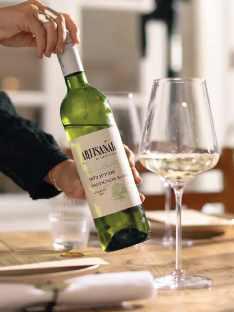
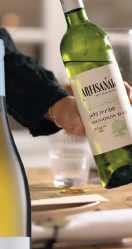
A striking example of classic elegance from the Judean Hills, offering deep inky colour and a concentrated bouquet of blackberries, spice and fine, tactile tannins. Its palate is polished and balanced, with velvety smoothness, impeccable structure and flavours that evolve generously over time.
All wines distributed by kedemeurope.com



















































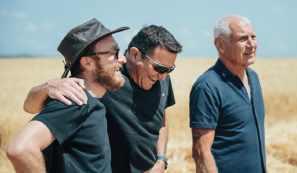
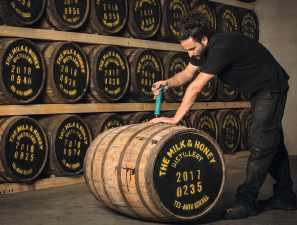
, also known as M&H, has come a long way from its humble beginnings. Having launched in Tel Aviv in 2013 as Israel’s first whisky distillery, its products have captivated whisky lovers all over the world due to a passion for its craft and an experimental edge.
Having won World’s Best Single Malt in 2023 for its Elements Sherry Cask expression, the distillery is now turning to local farmers to grow barley in areas that were decimated on October 7.
To have won World Best Single Malt in a blind tasting with Scottish and Japanese whiskies as competitors is no mean feat and was no accident. The whiskies mature quickly due to Israel’s hot climate, and the distillery also had consultation from the late Dr Jim Swan, known for his work on award-winning distilleries around the world.
M&H whiskies are kosher certified. Easier said than
done, especially when it came to the Elements Sherry Cask, since there were no kosher sherry barrels in which to mature the whisky. Undeterred, M&H distillery worked directly with a producer in Spain and the Rabbinate of Barcelona to kosher certify these special fortified wines in a world first. This is exactly the kind of attention to detail and out-of-thebox thinking that has put M&H on the same level, or even above, many beloved Scotch whiskies. And the results speak for themselves. Not only with the multiple awards, but with its delicious flavour.
events of October 7, the distillery hosted survivors of Kibbutz Be’eri, and it was then that the idea took root to grow barley for the whisky in Israel itself. This is an important and meaningful project to everyone at the distillery, as well as the farmers involved.

But what does a distillery do when it’s already won world’s best? It goes local.

The company had wanted to shift away from barley grown in Europe for a long time, but after the horrific
The first harvest has finished, but it will be three patient years before we are able to taste the resulting whiskies. In the meantime, M&H Distillery has a wonderful range to explore, including the original Classic, the slightly smoky Elements Peated and, of course, the Elements Sherry Cask, the whisky that won World’s Best.




the whisky that won
M&H Distillery’s range of single malts are available on Amazon, Master of Malt and at Kosher Kingdom. mh-distillery.com


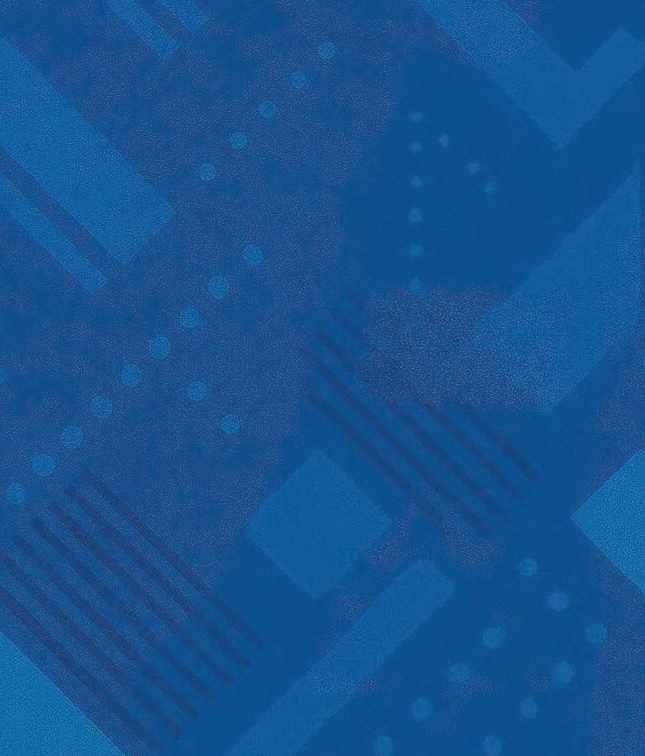











We Believe in Israel - Turning Advocacy into Action: When others debated, we delivered.
This year, We Believe in Israel helped achieve what many thought impossible: Palestine Action has been proscribed as an extremist group. We exposed its agenda, briefed policymakers, and made the case that hate has no place in Britain – and we won.
But we did not stop there. From classrooms to Parliament, from community halls to social media, we are educating, challenging Jewish and antizionist hate, and reclaiming the narrative against propaganda. We are putting Jewish pride and Zionism back at the centre of public life, unapologetically and with results.
This is what action looks like. Join us. Support us.
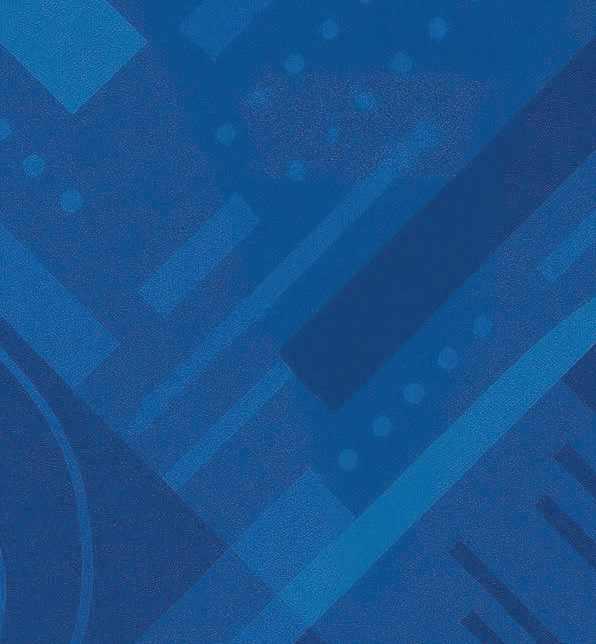




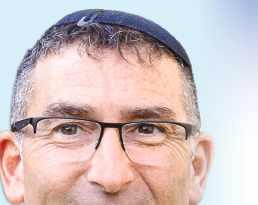


































































































































LEFT: Noach Braun with Bessie
RIGHT: Jake Marlowe

Eight-month-old puppies don’t often rack up air miles, especially on one-way trips. But last month, Bessie boarded a plane for the first time and her maiden voyage was to make aliyah. Happily munching a bone at the hotel the night before, she was headed to the Israel Guide Dog Center (IGDC), where, after health checks, she will become a breeding dog as part of the European Breeding Corporation scheme. So Bessie’s future litters will be used by the IGDC and other partner schools worldwide.
For co-founder Noach Braun, the connection with international partners comes at the right time. There are soldiers who have lost their sight and a dramatic rise in post-trauma victims since October 7 has created an
unprecedented surge in demand for his expertly-trained dogs. Known for his stoicism, the former IDF paratrooper has led his team through two years of war, once seeing an Iranian rocket land near his home. With staff and volunteers called up, those remaining at the Center in Beit Oved work tirelessly to keep breeding and training on track.
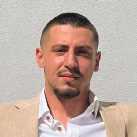
Noah’s wife Orna, who heads dog training says her husband bottles things up and is focused solely on his commitment to helping those affected physically and emotionally by so much tragedy. Among them are Michael and Lisa Marlowe. Their son Jake, 27, was murdered by Hamas on October 7 and, while they have shared their pain publicly, it is only in private that the enormity of their loss is fully felt .
Noach and Orna had flown in to collect Bessie from her foster family in Bristol, arranged by the Banbury-based charity Dogs for Good. This visit gave the Marlowes a chance to see the founders, who have become friends since Jake’s death.
This is because, in memory of their son who was killed defending festival-goers at Nova, the Marlowes have sponsored three puppies – Jake, Marlowe and soonto-be-born Woody – with funds raised by those at Borehamwood’s weekly October 7 vigil. Lisa had photos of Jake and Marlowe and looks forward to meeting ‘pup to person’ when they return to Israel for October 7. “We have to be there,” said Lisa as Bessie licked her face. Cruelly, the couple’s own two dogs died soon after Jake and now they have Jaxon. All are reminders of what they lost, but naming the IGDC dogs after
Jake ensures his courage and kindness live on in every life they transform. Back in Israel, the hope is Teddy will change a life. Named after late IGDC chief executive Martin Segal, Teddy is now 14 months (see picture above) and is impressing his trainers, walking calmly at his raiser’s side, even on his commute from Rehovot to Jerusalem. Teddy’s mastered car travel, office life and enjoys weekly playdates with other pups in training. Orna has seen thousands like Teddy realise their potential. She said that saying goodbye to Bessie was emotional for his foster family and no less so for Noach hugging Michael Marlowe. It was Martin Segal who said Israel Guide Dog Center is more than a training ground, it's a lifeline.
israelguidedog.org.uk
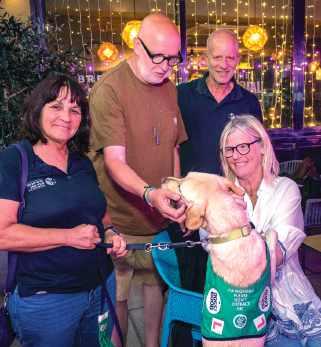
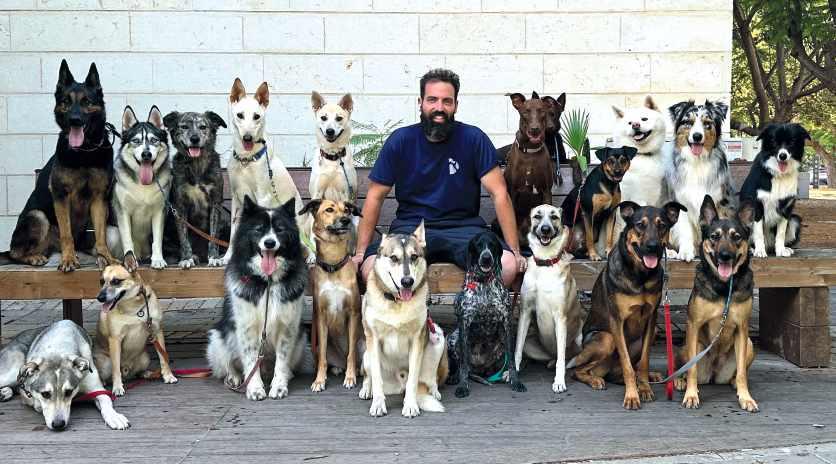
Ellie Patriellie
Shmutskie Hamutskie
Gin Gin
Izzy Bizzy
Jim Jim
Riley Shmiley
Zoey Bat Zoey
Booza Habooza
Yodalle Modalle
Cosmi Wosmie
Wandi Shwandy
Michael Jackson
Recognise any names? Then you’re one of the thousands of Insta scrollers checking in with Tel Aviv’s now-famous wagging roll call of obedient pups. The man with them is Eran Gal, a self-confessed former “non-dog person” who has gone viral with the daily magic he creates on Israel’s streets.
Raised in a cat-only household by doctor parents who didn’t trust
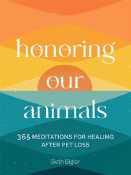
children to manage pets, Eran’s dog journey began when his wife Amit adopted a rescue pup. That was Olive aka Ellie Patriellie.
Overwhelmed when she arrived, Eran tackled the challenge with the same dedication as his environmental studies, devouring dog psychology books like a new parent. Olive’s behavioural issues caused by other dogs at the park pushed him further. His mentor, a professional trainer, suggested walking her with a pack and, slowly, Olive calmed down. What began as a hobby soon grew. With help from fellow trainer Raz, the walks became a full-blown operation.
One day, inspired by a US dog walker, Eran began lining the dogs on benches and calling them by name – Olive, Fanta, Bamba and the rest caught on video, which were initially for the owners. Until one persuaded him to
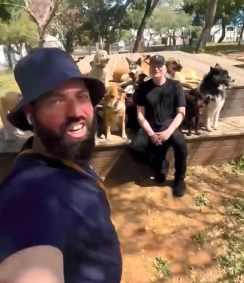
share them and the reaction was immediate. Jessica Seinfeld reposted it, Michael Rapaport saw it and declared he had to be in the line-up on his next Israel visit.
Now, with a growing fan base and a ‘Buy Us a Treat’ donation link, Eran’s vision is to open a dedicated dog training centre in Tel Aviv. “These dogs teach us so much,” he says. “They remind us to find joy in the little things.”
In America, September is National Pet Memorial Month, a time to remember beloved animals that have departed. As Yom Kippur approaches and we say Yahrzeit for loved ones, this can extend to pets. Few understand that bond better than Beth Bigler, the world’s most sought-after pet loss grief counsellor, who left a 20-year Hollywood career to help people heal. Her new book, Honoring Our Animals: 365 Meditations for Healing After Pet Loss (published by Wellfleet Press, £14.99), offers a gentle, daily guide to turn grief into gratitude.


















From individuals items and specialist collections to complete house clearances, removals, and probate valuations. We do as much as you need - just ask !!!
• As an independent broker acting on your behalf, I aim to get the highest prices for your pieces
• No need to worry about posting your valuables
• I sell through many different auction houses, high-end dealers, collectors and private clients
• With over 18 years in business you will always receive my personal discreet one-to-one service
• Free consultations at your convenience Simply Sold






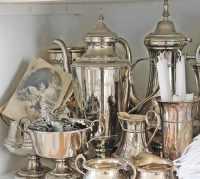










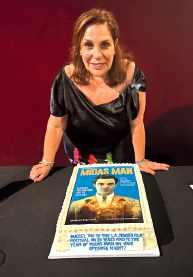

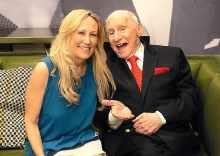
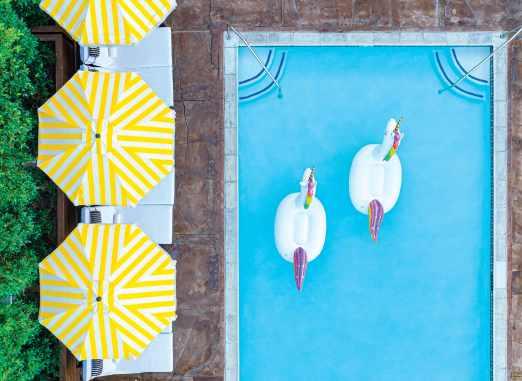






Brigit Grant heads to the Golden State to sample Pasadena, pickles and a premiere
So I'm cruising along Venice Boulevard in a white Jaguar I-Pace. Teddy Swims’ Lose Control is booming on the speakers and the sun is glaring through the windscreen, but there are no complaints from the driver. Because there isn’t one. Yes, no driver.
My daughter had convinced us to take a ride in a Waymo, one of the autonomous electric taxis that are fast becoming the ride-hail of choice in Los Angeles. We weren’t taking her to Disneyland, so it seemed only fair to agree to one wild ride and she duly summoned the sleek, sensor-studded robocar. I was terrified, but less so when it greeted me by name and, after one smooth, silent trip, I was hooked. It’s like being chauffeured by a ghost who obeys the traffic laws, and I can’t wait for Sadiq Khan to bring them to London (apologies to taxi driver pals).
When the fires broke out in California in January, visiting wasn’t the obvious thing to do. Not after seeing so many lose their homes – it felt wrong to holiday in a place of heartbreak. But that hasn’t stopped me visiting Israel; on the contrary, it’s a reason to go and anyway, Los Angeles had to happen – because Midas Man , the film I’d written about The Beatles’ manager Brian Epstein, was opening the LA Jewish Film Festival
For one day only, I knew how it felt to be Tom Cruise. We landed at LAX at 2pm and, by 7pm, I was on the red carpet – or rather, the Abbey Road zebra-crossing carpet – at The Saban Theatre in Beverly Hills, for the gala. Hilary Helstein, director of the festival, is a seasoned wrangler of Jewish A-listers (yes, even Mel Brooks) and secured Jay Leno – who plays Ed Sullivan in the film – to host the welcome. That was the icing on the cake, and there was a cake with the film poster imprinted in icing sat on a buffet table big enough to feed all 800 of the Jewish film fans attending. Leno, while expressing deep respect for the Jewish community, cheekily told the crowd that Italian food was better and they laughed in agreement with the
legendary host of Italian ancestry.
Just when I thought my ‘celeb’ moment was over, I popped up on the LA news – straight after the weather. Jay Leno and me on TV. What can I say? There was another screening in Encino, which, according to my daughter, is where Real Housewife Dorit Kemsley lives. We didn’t look for her as we were off to Pasadena. Why? Because I’d never been, and it’s where Doc Brown lived in Back to the Future. It’s also one of the cleanest places I’ve ever visited in the States outside Montana and it chimes with good intentions, as pointed out in the street signs.
A film set and part recording studio is the interior vibe at Pasadena’s Hotel Dena. Guitars hang beside TV sets on the wall in the bar and black and white classics flicker on a loop in the lobby, which has vintage cinema seats. Even breakfast is themed at the Dena, with a menu that offers two cage-free eggs any style as part of the feast that is the Good Day Sunshine Beatles breakfast (appropriate) and vegan tacos if you opt for The Mamas & The Papas’ California Dreamin’.
The Dena pool is pure Palm Springs, complete with unicorn floats and, best of all, there are dogs sat around the guests sipping cocktails, none of whom mind because the hotel is dog friendly. Very, and with good reason. The property is next door to the Pasadena Civic Auditorium, where America’s Got Talent is filmed and there have been many canine contestants. Israel’s sensational dog-dancing duo Roni and Rhythm stayed at the Dena and, according to staff, were the perfect guests. The hotel’s generous pet policy has also accommodated local people with dogs who lost their homes in the fire or were waiting for the toxic fumes to fade.
CLOCKWISE FROM BOTTOM LEFT:
Dena Hotel, Hilary Helstein with Mel Brooks, Brigit with the Midas Man cake, California, guitars on the wall in Dena Hotel’s bar, a Waymo cab, Dena Hotel, a Pasadena street sign
The historic Pasadena Jewish Temple and Center was destroyed in the fire, but as flames engulfed the synagogue, cantor Ruth Berman Harris went back in with her husband to save all 13 Torah scrolls. The synagogue is being rebuilt, as are many buildings on the outskirts of the city, which has the best-preserved Arts & Crafts homes in America. Among them is the Gamble House (1909), which was home to David Gamble of Procter and Gamble fame but appeals more because it doubled as Doc Brown’s mansion in Back to the Future
Pasadena’s love affair with the camera doesn’t
‘ Leno, while expressing deep respect for the Jewish community, told us Italian food is better... ’
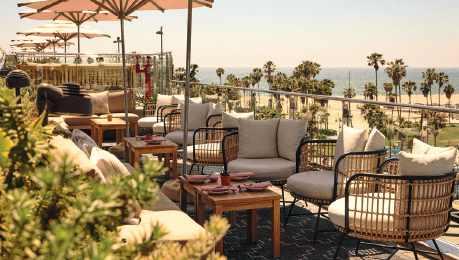
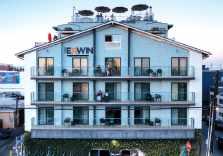

stop there, as Legally Blonde, Matilda , Catch Me If You Can , La La Land and The Big Bang Theory were all filmed in and around the city. There’s little point listing the movies made on Venice Beach as filming started there in 1910 with Mack Sennett’s Keystone comedies and it continues. I like to think of David Duchovny dropping in to the ‘Little Shul on the Beach’ while shooting Californication, but can’t confirm it’s the place to spot famous of the faith. It’s famous enough in its own right as a beach, and this time I got to stay on it at the boho Hotel Erwin With its al fresco rooftop lounge, the Kassi, overlooking the boardwalk, the vibe is Soho House with flip-flops and a DJ at sundown.
Inside, the hallways channel New York’s Chelsea Hotel, with photos of music legends – Jim Morrison, Janis Joplin and others – leading the way to spacious comfortable suites. For all its rock ’n’ roll, Venice Beach shuts down early, so breakfast is best, and the Erwin offers the full American complement. Our TikTok-motivated child also insisted we try Eggslut (there’s one in Notting Hill) and return to our favourite, the Sidewalk Café, where wannabe actors serve the Andy Warhol chopped chicken salad and resident eccentrics entertain.
There are must-dos that are part of the LA experience and Farmers Market near The Grove is one. It’s where I stock up on birthday cards and where, this time, I was confronted by other Jewish
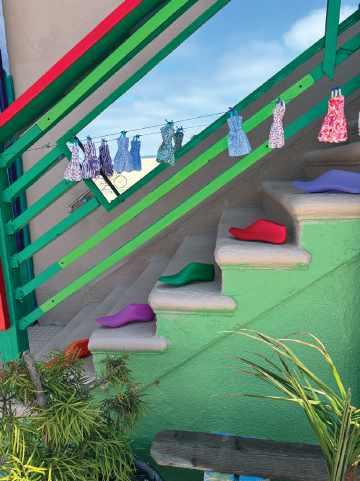
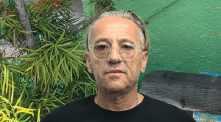

CLOCKWISE FROM BOTTOM LEFT:
Hotel Erwin, the Kassi Bar at Erwin Hotel, Venice Beach, Charlie Chaplin and Albert Einstein, Needle man in LA, The Shul on the Beach in Venice Beach

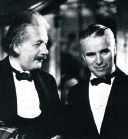
shoppers who clocked my Star of David. At Kaylin + Kaylin Pickles stand I met a woman who makes salads for the Kardashians and, as I waited for my smoked salmon and cream cheese on a pickle –which K&K substitute for a bagel – she invited us for Shabbat. Nutella and peanut butter is one of their combos. Don’t knock it ’til you’ve tried it, Mrs Elswood! Olive & James, renowned for its matcha, took us to Melrose, as my daughter had to try it, just as she had to sip Hailey Bieber’s strawberry glaze skin smoothie ($20) at Erewhon, which I finished, so don’t believe the TikTok hype. But Melrose proved fruitful in another way, as it was where I found Needle, a boutique owned by a charming Italian Ashkenazi, who told me Nodl was his surname. “It’s Yiddish for needle,” he said, then showed me his hoodie range – ‘Six Jews who changed the world’. Moses, Solomon the wise, Jesus, Freud, Marx and Einstein are all available on black, but I liked the Einstein and Chaplin meshuga gang sweatshirt in the window. “It actually happened,” said the designer. “The two men met in 1931 at the LA premiere of City Lights.” And so my trip ended as it began. With a movie. Just as it should in Hollywood.
Hotel Dena, Pasadena (hoteldena.com)
Hotel Erwin, Venice Beach (hotelerwin.com) lajfilmfest.org kaylinandkaylin.com needle-stylus.com
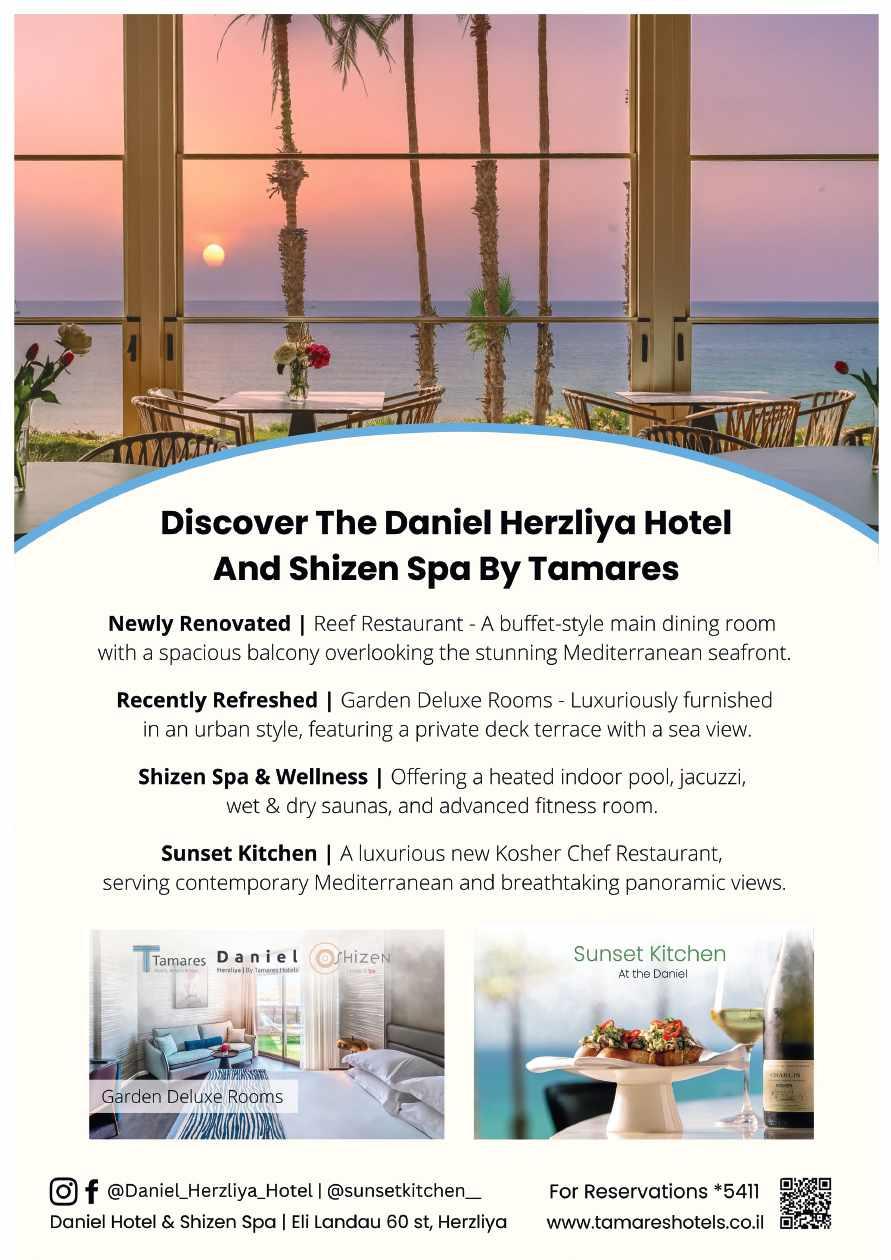

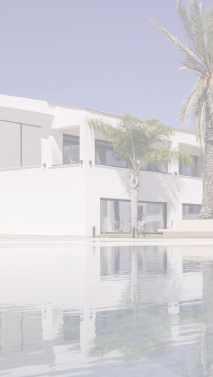



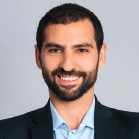
Michael Ben Baruch, UK director of the Israel Ministry of Tourism, explains how travel to Israel offers not just a wonderful holiday but a vital show of solidarity
In August 2023, I arrived in London with my family, brimming with optimism about my new role as UK d irector of the Israel Ministry of Tourism. My mission was clear, to promote a thriving UK-to-Israel travel market and showcase everything our incredible country has to offer. Like so many in the Jewish world, that optimism was forever changed by the events of October 7 2023.
T he trauma and disruption that followed created unprecedented challenges for those of us promoting Israel tourism. We faced fl ight cancellations, evolving travel advisories and entirely understandable concerns about safety. Direct attacks on Israeli soil, ongoing regional tensions and periods when airlines suspended services tested our resolve and that of potential travellers.
Yet something remarkable happened during this most difficult year. Travel to Israel continued. Despite the challenges, tens of thousands of travellers from the UK visited Israel during

2025, and they were welcomed with overwhelming gratitude by the Israeli tourism industry and people who recognised their visit as a powerful act of solidarity during such trying times.
Now, as we approach Rosh Hashanah 5786, I fi nd myself thinking about the sound of the shofar and its call to action. When we gather in synagogue and hear the tekiah gedolah , that fi nal, long blast, we’re reminded not only of our ancient connection to the land of Israel but also of our present-day responsibility to support it. Since October 7, that responsibility has taken on profound new meaning.
T he Israeli people have demonstrated remarkable resilience and our tourism industry stands ready to welcome visitors with open arms. Hotels, restaurants, tour guides and attractions are all operating, eager to share the Israel they love with those who choose to come.
T his Rosh Hashanah, I'm asking you to consider making 5786 the year you return to Israel. Yes, go to show solidarity, but go for so much more than that. Go for the sheer fun and spirit, for the unique family memories you’ll create, and the diverse experiences that only Israel can offer.
P icture yourself walking through Jerusalem’s ancient stones, feeling the weight of history beneath your feet. Float effortlessly in the therapeutic waters of the Dead Sea. Discover the incredible beaches and dynamic urban energy of Tel Aviv, where history meets contemporary in the most vibrant ways. Hike through the rolling hills of the Galilee, where every path tells a story. Dive into the crystal-clear waters of the Red Sea at Eilat, where underwater wonders await.
From world-class museums to outdoor adventures that challenge and inspire, from deeply spiritual journeys to culinary discoveries that

will redefi ne your understanding of Israeli cuisine, Israel awaits your arrival.
A s we prepare to pray for a sweet new year, Shanah tova u ’metukah , let us also commit to meaningful action. In the Rosh Hashanah liturgy, we proclaim “Hayom harat olam ” today the world is born anew. This year, let that renewal include a strengthened connection to Israel through travel.
R ather than waiting for some distant future, let the sound of the shofar be your call not just to reflection and renewal, but to a journey home.
L’Shanah Tova – and this year in Israel!

‘ Go to Israel to show solidarity, but also for the sheer fun and spirit and diverse experiences ’


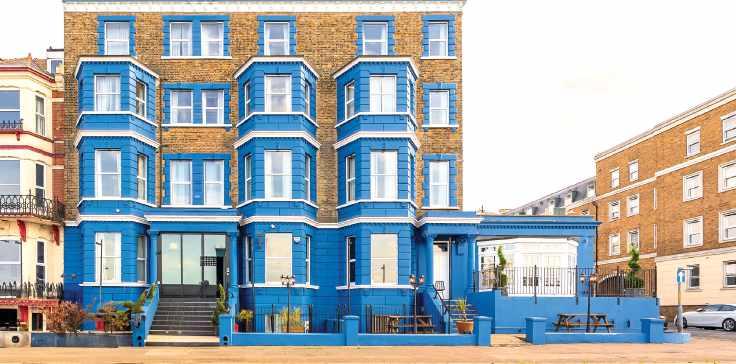

THERE’S SOMETHING TIMELESS about Margate –golden sands, the nostalgic hum of the fairground and Turner skies that paint the sea like a canvas. But until now, kosher travellers had to admire it all from afar. Enter UNICO Hotel, the UK’s only Kedassia-certified seaside stay, where coastal charm and kosher confidence finally meet.
This is a hotel that gets it. From the moment you arrive, the small details are smoothed. Staff intuitively cater to Shabbat needs, so you never need to explain twice, and meals are handled with Kedassia care. Instead of working out logistics, you’re free to relax and breathe in the sea air.
Bright rooms, many with balconies and sea views, offer just the right mix of comfort and calm. Whether you’re a couple sneaking away for a weekend or a family travelling with children,
the vibe is unfussy and relaxed. Proper showers, useful storage and thoughtful touches make short breaks feel indulgent.
At UNICO, dining is the highlight. Kosher here means no compromises – and no questions. That assurance transforms your stay: you can plan your days around beach strolls, Dreamland rides or Turner Contemporary wanderings with no worries about meals.

Why choose UNICO?
• The UK’s only Kedassia-certified seaside hotel
• Seamless Shabbat with halachic-aware service
Step outside and Margate opens up: an Old Town packed with galleries and indie shops, a seafront alive with nostalgia and new energy, and sunsets so spectacular they’ll have you reaching for your phone – while on Shabbat you’ll have the space and time to pause and take in your surroundings.
• Balconies, sea views and coastal comfort
• Parking and peace of mind, sorted before you arrive For Jewish travellers craving the sea without the stress, UNICO Hotel Margate is the answer. Discover a stay that is kosher, coastal and completely relaxed. Book your escape at unicohotels.co.uk
Weddings abroad are a labour of love with emphasis on the labour. Sure, the weather is more appealing, but the cost and inconvenience? A primary reason for overseas simchas is to do something different but if you really want to shake it up, just go further in the UK. And what better place for whisky lovers than Scotland, where you can eat kosher?

In Ravenscar, North Yorkshire, only 105 minutes from Leeds, hosting a wedding at Grand Villa Heights (pictured, inset and below) will feel like you are on a Greek island, the Costa Blanca or Scotland because of the scenery. Set on the cliffs, the early 20th-century Arts and Crafts villa overlooks Robin Hood’s Bay and outshines the Riviera. Available exclusively, there are 54 rooms, some with freestanding baths, but it’s the sea view you want. The six luxury lodges have the vista and it provides the backdrop
for the ceremony on the clifftop lawn. The dining room seats up to 120 and the hotel uses some of Yorkshire’s finest caterers and any menu can be discussed. The staff go over and above for guests, who will enjoy exploring the moors, coastline and Whitby and Scarborough. But the grounds, winding staircases and sheep that come when you call are entertainment enough until the sun sets over the bay. There’s little abroad that can compete. grand-villa-heights.com
In July, when Sir Keir Starmer met Donald Trump at MacLeod House in Aberdeenshire, there was no opportunity to show the place or the property on the news. That’s a shame because Trump International Scotland on the Menie Estate near Balmedie has been hailed as one of the world’s top modern golf courses. And had Sir Keir stayed the night, it would have been at MacLeod House & Lodge, a baronial-style mansion with four-poster beds, marble bathrooms and whisky libraries,




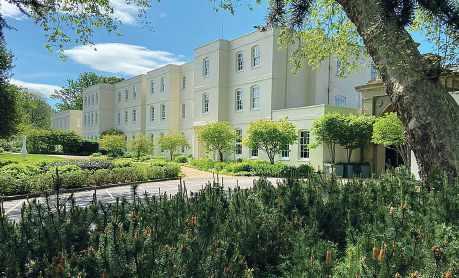
‘Hosting a wedding at Grand Villa Heights will feel like you are on a Greek island, the Costa Blanca or Scotland because of the scenery ’
so he no doubt regrets it. The course is carved into the Dunes, which is the name of the restaurant renowned for Aberdeen Angus, but where kosher food is served on request. There’s a cigar lounge in which to relax and the surrounding countryside offers fishing, shooting and whisky tours. Weddings and exclusive events are staged in the MacLeod Lodge ballroom. trumpgolfscotland.com
A stone’s throw from St Albans, Sopwell House is the kind of retreat that makes you forget your proximity to London. Guests come for the award-winning Cottonmill Spa, with pools, saunas and thermal suite and, if staying over, bedrooms and suites range from classic country house to contemporary, although the Mews Suites come with their
own gardens and hot tubs. This works for a bridal couple, and that’s what Sopwell House is known for, as there is a grand ballroom, intimate lounges or outdoor gardens and a dedicated team to tailor the celebration. sopwellhouse.co.uk
They say it takes a village, and at the one in Elstree a new wedding venue is on the way. The Village Hotel has taken the building next door and later this year will unveil a banqueting suite flooded with natural light big enough for 220 people.
village-hotels.com

Come






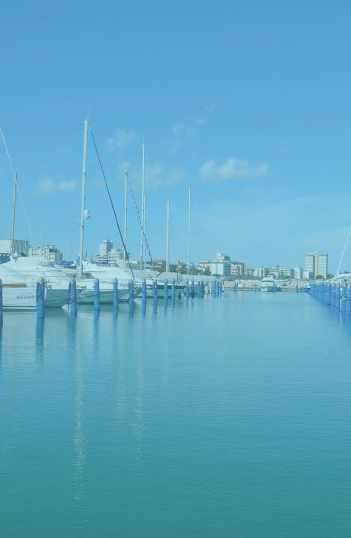



























In an attempt to impart some culture to her adolescents, Alex Galbinski took them on a family holiday to Florence
Many people questioned our wisdom in visiting Florence in the August heat, but our concern was our teenagers’ limited capacity for sightseeing. Planning was key. So we queued for the Uffizi Galleries while taking in the wonderful view of the Ponte Vecchio. Ancient sculptures and paintings from the Middle Ages to the modern period are found within the Giorgio Vasari-designed building, including those by Botticelli, Correggio, Leonardo, Raffaello, Michelangelo and Caravaggio, as well as works by European painters.
Even on a whistle-stop tour of Florence one must see Michelangelo’s David – the original in the Accademia Gallery of Florence and the second version in Piazza della Signoria (Duomo Square).
We got the kids off their phones with a trip to the bell tower of the Duomo (Cathedral of Santa Maria del Fiore), Florence’s magnificent domed cathedral. Construction on the cathedral began in 1296 and took more than 140 years to finish. It has 414 steps and stunning sweeping views.
Jews have lived in Florence and the surrounding areas since the 14th century and there are still 1,000 there today. They were encouraged to come after 1437 by Cosimo il Vecchio de’Medici but were enclosed in a ghetto in 1570. The truly stunning white and pink Great Synagogue was completed in 1882 and features Moresque arches, Venetian-style mosaics and other touches by leading craftsmen. The Jewish Museum of Florence is housed within.
If you keep kosher, you are well catered for; we ate at Ba’Ghetto, which serves delicious Jewish-Roman and Middle Eastern food and is located in front of the synagogue, in the lively Sant’Ambrogio district featuring iconic narrow streets and antique shops.

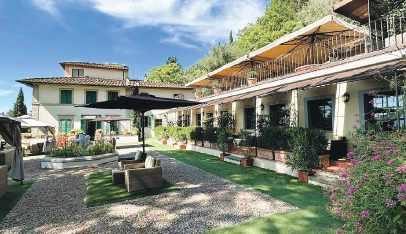
A must-try are the fried artichokes.
We stayed in the charming Hotel Fiesole FH55, a renovated historic house far from the madding crowd and only five miles (a 20-minute bus ride) from Florence city centre. We were smitten from our first sight of its stunning vantage point in the Tuscan hills with breathtaking panoramic views over Florence and the surrounding countryside.
The four-star hotel only has 32 guest rooms and feels romantic, intimate and cosy; it is the perfect antidote to la frenesia of the city and is a 15-minute walk from the gorgeous and historic small town of Fiesole. The hotel’s main building was originally a lemon grove used by the monks of the nearby monastery and some of the rooms overlook the city. Our deluxe suite was decorated in the classic style – with terracotta floor tiles, a plush velvet sofa and gorgeous Phytomer and Clarins toiletries; our teens were in the interconnecting junior suite. Both rooms were supremely comfy and spacious and had private terraces; there is also a small outdoor pool.
The Serrae Villa Fiesole Restaurant showcases Tuscany’s authentic flavours and recently gained a Michelin star. We enjoyed fabulous breakfasts on its terrace and, later on our trip, we visited Rome and ate in Le Spighe Restaurant at sister FH55 hotel the Grand Palatino, just steps from the Colosseum. We can still taste the delicate seabass carpaccio with nectarine, dill and fennel, beautifully presented aubergine parmigiana in a style none of us had seen before, and perfectly-cooked crispy salmon.
This was a memorable visit to an historic gem in the heart of Italy. We plan a return visit – in spring!
Rooms at Hotel Fiesole FH55 cost from €219 a night. fhhotelgroup.it
TOP: Florence has much to offer travellers of all ages
ABOVE: The outdoor pool at the charming Hotel Fiesole FH55
BELOW: The Great Synagogue of Florence


ISROTEL: A NEW ERA
Georgia Gold lines up where to stay in style across Israel and elsewhere
Where Mount Canaan forest meets the Hula Valley sits Mitzpe Hayamim, a hotel surrounded by organic farmland for guests looking to combine nature, wellness and great local food. The hillside farm supplies the kitchen with herbs, veg and fruit , while the dairy produces cow, goat and sheep milk for the hotel’s cheeses and yogurts – a sustainable ecosystem reflecting its Galilee setting. The surrounding area, of villages, river trails and wineries, makes it a strong base for touring the north – and, with a spa, it’s also good for rest. Mitzpe Hayamim is part of Isrotel’s move to broaden its offering across Israel. New properties include Gymnasia in Tel Aviv (part of Isrotel Design line), with 145 rooms and a rooftop infinity pool and, in the Upper Galilee, Ayala, a retreat of glass and stone. The newly-renovated Daroma, has 128 rooms on a ridge above the Ramon Crater, and Kayma is for high-end seclusion by the Dead Sea. It has launched Aluma Hotels and Resorts in Athens, including three new properties: Adia, Anise and Skylark that are all shaped by its founding idea of ‘hospitality as a way of light’. Isrotel.com

If Tel Aviv has a signature look, it’s Brown. With boutique hotels dotted around from beachside to Bauhaus-lined boulevards, the Brown Hotels collection melds retro charm with modern-day polish. Whether you’re checking into the original Brown TLV near Rothschild Boulevard, the promenade-facing Brown Brut, or the sultry new BROWN JLM in Jerusalem, you’ll find the same mix of style, service and swagger. They are close to everything: markets, nightlife, galleries and the sea. Brown hotels in Tel Aviv have compact but cleverly-designed rooms, memorable wallpaper and espresso machines. There’s nothing cookie-cutter about these hotels and BROWN JLM by Independence Park and within walking distance of the Old City has a rooftop Jacuzzi and a café-bar downstairs that buzzes with tourists and locals. What sets Brown apart is attitude. Hip without trying, these hotels feel like your coolest friend’s flat: welcoming and just the right amount of wild. brownhotels.com

While many hotel chains lean into sameness, the Atlas Hotel brand thrives on character, location and local flair. With around 16 boutique properties in Tel Aviv, Jerusalem, Eilat and Haifa, Atlas is about style with a story. Each hotel is shaped by its location: the Bezalel in Jerusalem draws from its namesake art school, weaving local design references into everything from wall textures to lobby ceramics. Market House in Jaffa rises above ancient ruins, quite literally, as it was built over an archaeological site. At Hotel 65 on Rothschild Boulevard, greenery spills over balconies, the staff are praised for being unfailingly helpful, and rooms are efficiently designed, with guests loving the strong showers. The properties usually have fewer than 100 rooms, but the real value is the lived-in atmosphere. Atlas Hotels offer a sense of place that doesn’t feel manufactured. atlas.co.il/en


There’s no doorman. No grand entrance. You could walk past The Vera and not notice it – and that’s the point. The industrial-chic boutique hotel is cleverly squeezed into Lilienblum Street. Owned by Danny Tamari and designed by Yaron Tal, it’s a little gem with the kind of staff you’d happily drink with, so it’s fitting there’s a free-flowing wine dispenser in the lobby. Upscale and understated, there’s a lobby and two large rooftop terraces for meeting fellow travellers. Rooms are small but tasteful, with comfy beds, custom-made furniture and blackout curtains. A four-storey staircase etched with brazen lines by Charles Bukowski is an artsy touch, leading you to Chef Asa Schwartz’s standout breakfast of bread, local cheeses and juices (nectarine and cardamom, anyone?) that are deserving of an encore. No spa, pool or gimmicks, just good taste,well-executed. theverahotel.com
Tamares Hotels focus on properties in prime coastal locations, with an emphasis on practical comfort, good service and easy access to attractions. Their Israeli flagship is Herzliya’s Daniel Hotel, where guests can walk straight from the lobby to the sand. With seasonal menus, a spa, pool and sea-view terraces, it’s a popular choice for those wanting coastal calm near to TA. tamareshotels.co.il

When it comes to Israeli getaways, Fattal Hotels offer one thing in spades – choice. With more than 40 properties across Israel, Fattal’s mix of Leonardo, NYX, and Herods properties cater to all types of travellers. In Tel Aviv, the NYX brand taps into the city’s late-night energy, with industrial interiors, neon accents and rooftop bars built for after-hour views. In Jerusalem, Leonardo Boutique is a quiet base near the museums and Machane Yehuda Market, while down south, Herods Palace in Eilat delivers Red Sea glamour with pools, spas and a front-row seat to golden desert sunsets. But the Fattal also travels – to places that are ideal for autumn breaks, like Paphos in Cyprus, where it is still warm and without summer crowds and so a perfect time for Leonardo Plaza Cypria Maris: an adults-only beachfront resort with swim-up bars and spa treatments. And if your 18-year-old went Euro-railing this summer, their stop in Budapest might interest you as the Leonardo Boutique Hotel is on Madách Square in Budapest – perfect for crisp-weather wandering, goulash lunches and nights by the Danube. fattal-hotels.com


Dan Hotels, Israel’s leading luxury hotel group, continues to find ways to enhance its guests ’ hospitality experience. Renowned for its high level of luxury accommodation and service, renovations have recently taken place in some of the most popular destinations. The Chalet Wing at the Dan Accadia Resort, a beachfront property in Herzliya, has just undergone an upgrade, including 90 garden and terrace rooms, as well as five unique suites. The renovated spaces combine architectural tradition with modern design and the use of luxurious marble, original textiles and furniture details carefully collected from all over the world – among them original works of art.
Dan Eilat, in Israel’s popular holiday destination, has also undergone some renovations as well as the opening of a new wellness complex with seven treatment rooms, including a couples’ suite, complete with a Jacuzzi, and offering various relaxing massages. Members of the chain’s e-Dan membership continue to receive gifts and discounts, and it is easy and free to join. Younger guests are well-catered for with the children’s club Danyland, offering a wide range of activities and games and run by professional counsellors. Together with the world-renowned Israeli breakfasts on offer, local activities and attractions, a Dan hotel offers something for everyone. There are Dan properties in Tel Aviv, Jerusalem, Haifa, Caesarea and Tzfat that all continue to provide a hospitality experience beyond the expected. danhotels.com


Soaring 30 storeys above the Mediterranean, Island Suites is hard to miss and harder to leave. Located on Netanya’s quieter southern shore, this all-suite hotel combines convenience with apartment-style comfort, near the city’s lively promenade. Each suite is spacious, with a separate bedroom, lounge and kitchenette and has a large balcony with uninterrupted sea views. The décor is all about clean lines, soft tones and floor-to-ceiling glass, and families will appreciate the extra bathroom. There’s a pool, compact spa and well-equipped gym to be used after sampling the kosher in-house Blue Island restaurant. Whether you’re there for a weekend getaway, working remotely with a sea breeze or planning a longer stay, Island Suites is the kind of place where unpacking your suitcase feels like a good idea. islandsuites.com-israel.com









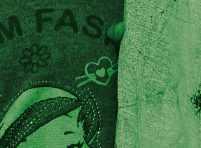


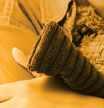










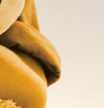











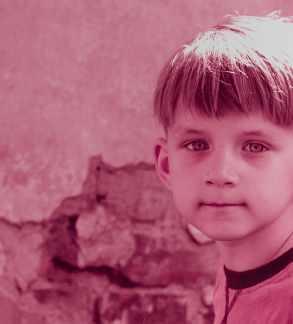







Micah’s diagnosis was incredibly difficult for us, but thanks to JDA, we could cope and give our son the best start in life.”
By donating to JDA this Rosh Hashanah, you’ll be helping Micah — and people experiencing hearing loss at all stages of life — live the best life possible.
From supporting children in schools, to people losing their hearing at any age, to older people in care homes, we’re now helping all Jewish community organisations to become more inclusive, ensuring everyone with hearing loss can access the services they need – including urgent medical rescue, cancer therapies and mental health support.
JDA is the Jewish community’s specialist in hearing loss – and, with no government funding, we rely entirely on donations and legacies from generous supporters like you.


Please show you care by making a donation.
Scan the QR code, visit jdeaf.org.uk or call 020 8446 0502. Thank you.
By actor and activist Tracy-Ann Oberman
It has been an extraordinary year – at once unbelievably depressing, yet strangely positive. Last Rosh Hashanah I was deep in rehearsals for
The Merchant of Venice 1936. What began as a modest project with a brilliant company grew into something bigger than I could ever have hoped: a West End transfer, a national tour that sold out within days, and now a filmed version by David Parfitt so it can reach an even wider audience.
The piece was personal – a way to channel my great-grandmother’s spirit and remind audiences that antisemitism long pre-dates the modern State of Israel. The same slurs, the same banners, the same poisonous chants. I wanted to spark debate and show that we have more in common with immigrants than the differences that divide us.
In the same period, I stepped back into EastEnders after 20 years – surreal, exciting and with huge press interest. This year has felt unusually varied: playing Mae West in a radio play I wrote (shortlisted at the BBC Audio Awards), working with Harlan Coben on his new Netflix series Run Away, and being awarded an MBE in the King’s Birthday Honours for Holocaust education and combating antisemitism. That recognition meant the world, acknowledging the art and activism that now feel inseparable in my life.
As Rosh Hashanah approaches, there’s fresh work. On 23 October I open at Hampstead Theatre in Richard Greenberg’s The Assembled Parties, a layered play about a Jewish family in New York in 1988. I’m excited for audiences to see it, but write this knowing that many of my contemporaries have struggled, in both the NHS and the arts, two of many places where antisemitism has reared its head.
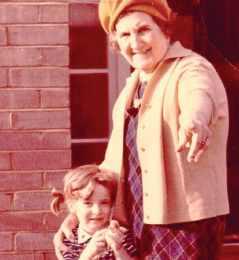

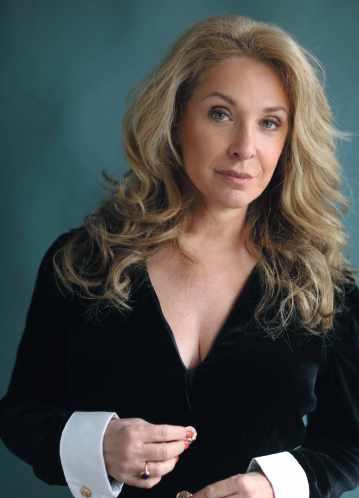
I was appalled to see comedians Rachel Kreeger and Philip Simon have their Edinburgh shows pulled at the last minute. Publishers say it’s near-impossible to get Jewish work commissioned and friends like Simon Schama doubt his landmark BBC series The Story of the Jews would even be greenlit today.
It has been a litany of normalised antisemitism in the news. Too many with no knowledge of Israel, Hamas or Gaza post fake information, impossible to counter. The medieval tropes I highlight in Merchant – Jews as baby killers, warmongers, untrustworthy – are recycled and it hurts. Gary Lineker’s rat emoji might seem trivial, but landed hard.
Yet out of this bleakness, something positive has emerged. Jewish creatives, typically a disparate bunch, working in bubbles, have since October 7 felt the discomfort of being a Jew in the arts in a moment where anti-Zionism has bled so easily into antisemitism. So we have gravitated together – actors, writers, directors – and have formed a really strong alliance of support, outrage and sadness. As my Bubba used to tell me, recalling pogroms in her shtetl: “When your village is burning and your neighbours don’t help you, you must help yourselves.”
That spirit of kinship has shaped this year more than anything else. It’s why my conversation with Labour minister Lisa Nandy mattered so much, when she and Chris Bryant came to see Merchant. We spoke frankly about my fear that Jewish British stories are being erased. We are more than Schindler’s List and Fiddler on the Roof. I expressed my hope that our community, which has played an important role in Britain since William the Conqueror, will not see its stories erased by commissioners and gatekeepers. Lisa Nandy took this seriously.
So I step into the New Year grateful but watchful. I know I’m fortunate, because I’m not feeling the brunt of being cancelled, when so many of my fellow Jewish performers are. The golden ring we’re throwing around each other can only be a positive thing. Rabbi Sacks once said: “Any society that allows Jew-hatred to flourish will soon see all other evils follow.”
My prayer for 5786 is that sanity, empathy and courage return to our public spaces. And that the little girl I once was, taken at four to walk alone through Yad Vashem – a moment that defined my life – can continue turning that pain into positivity for my community and beyond.







Please visit our website to enquire www.thebrentanosuite.co.uk
